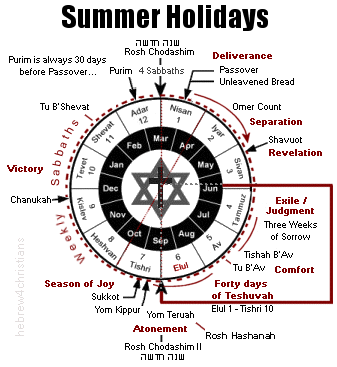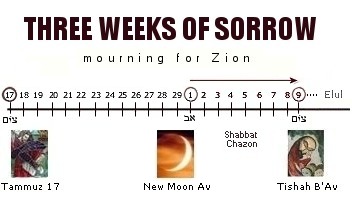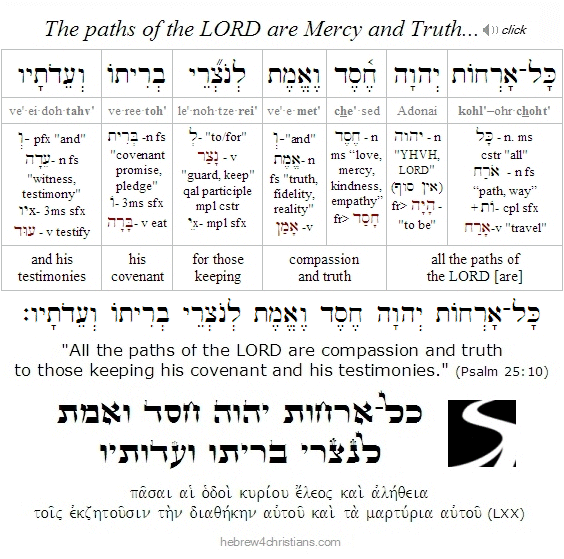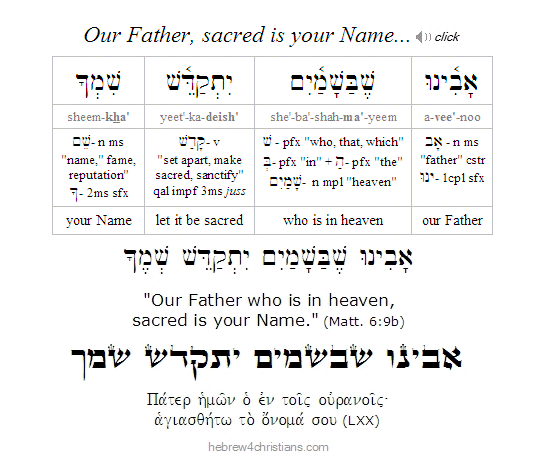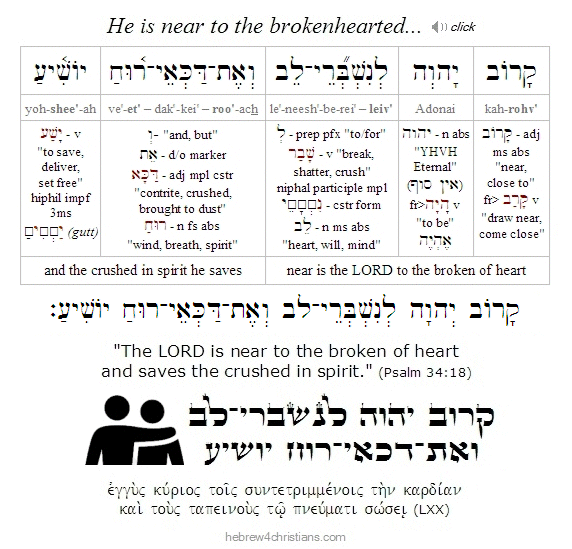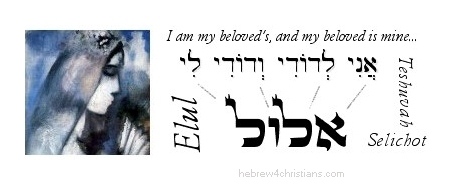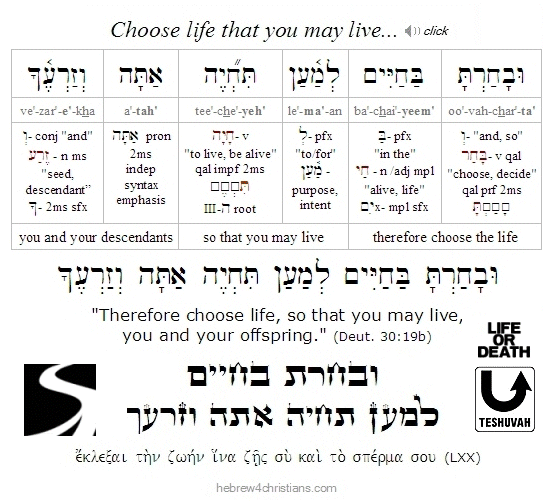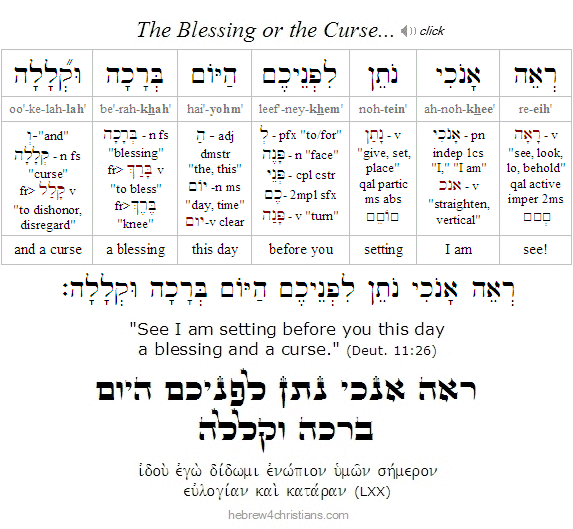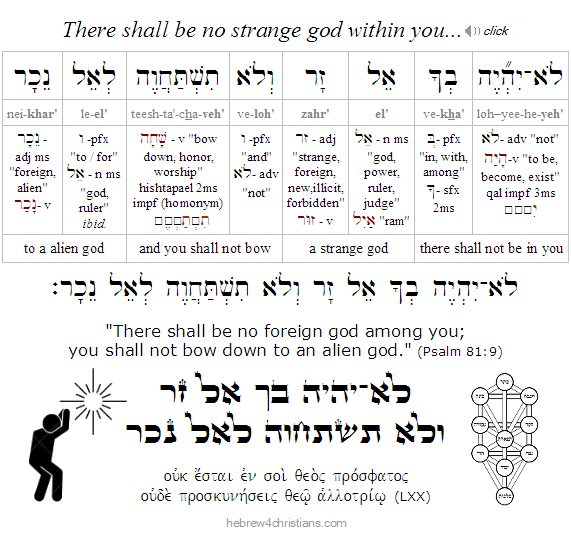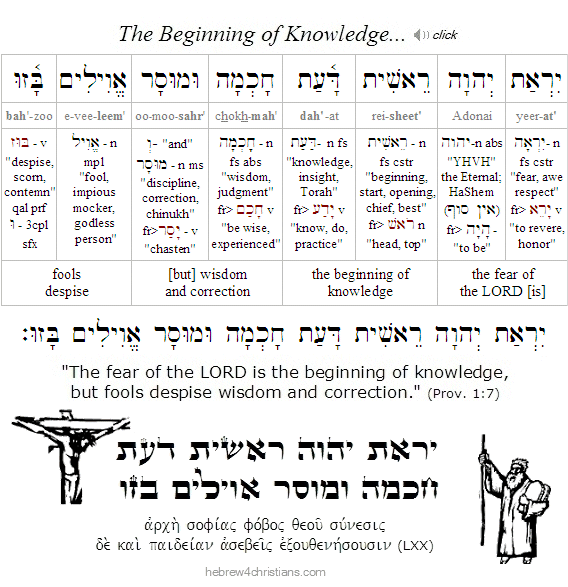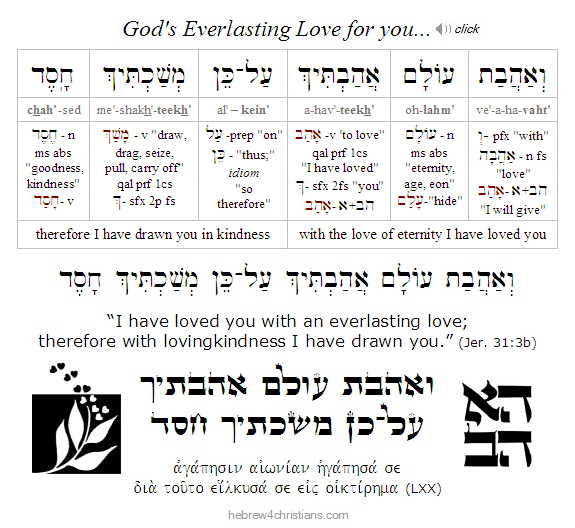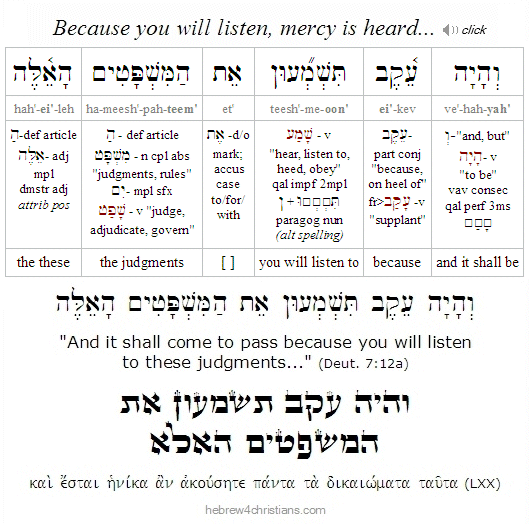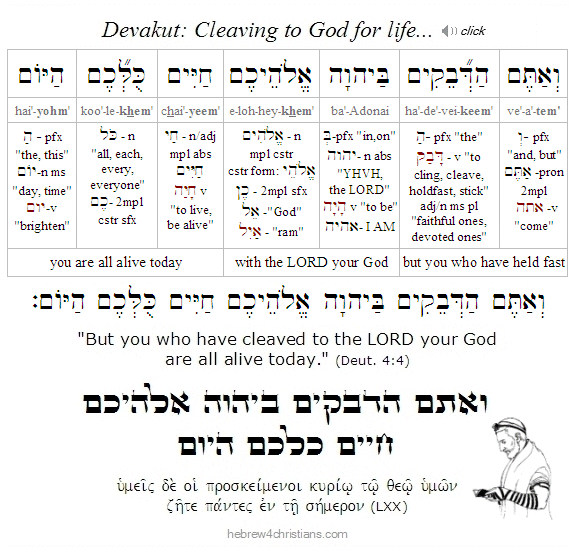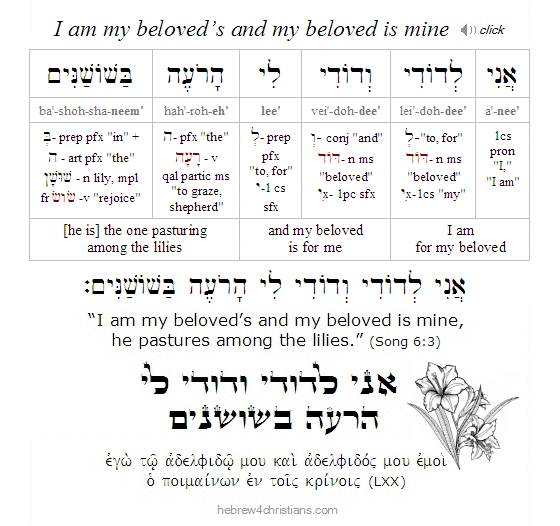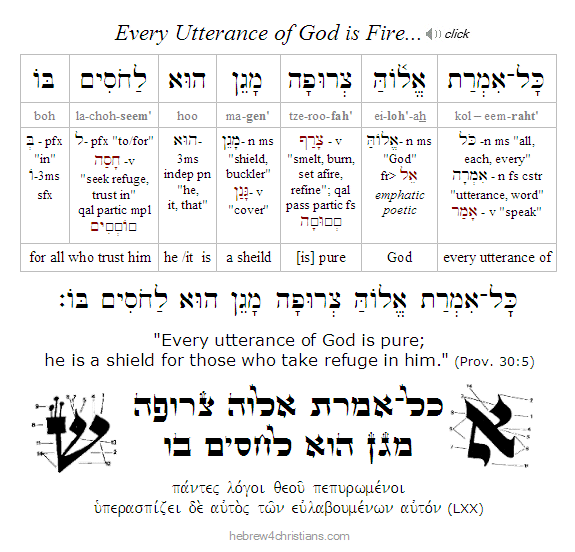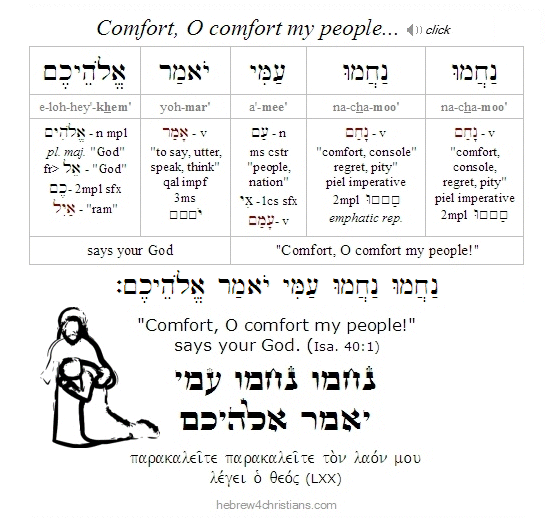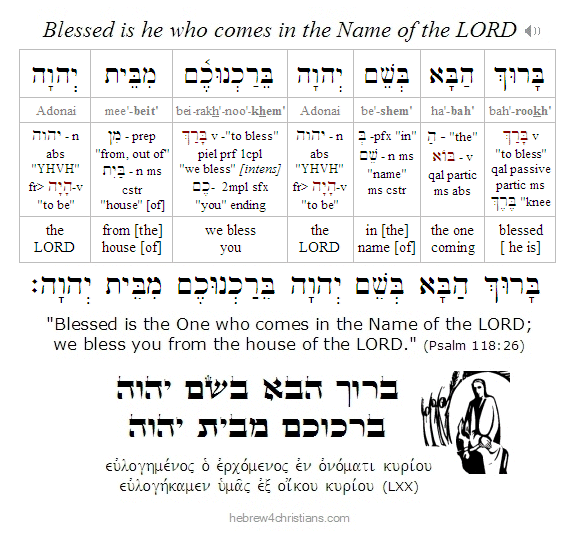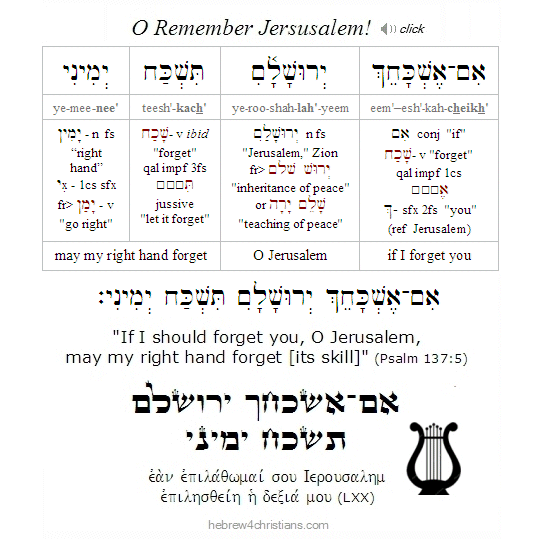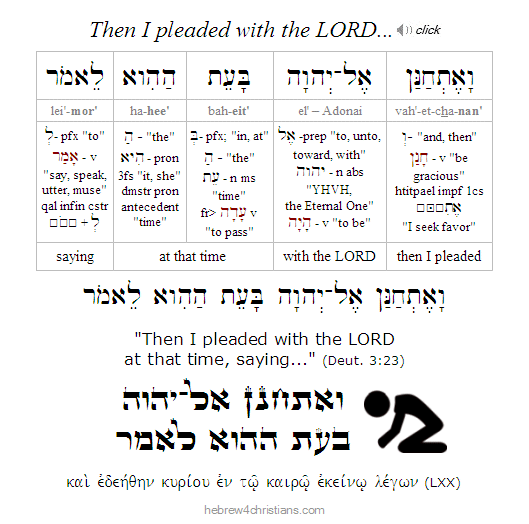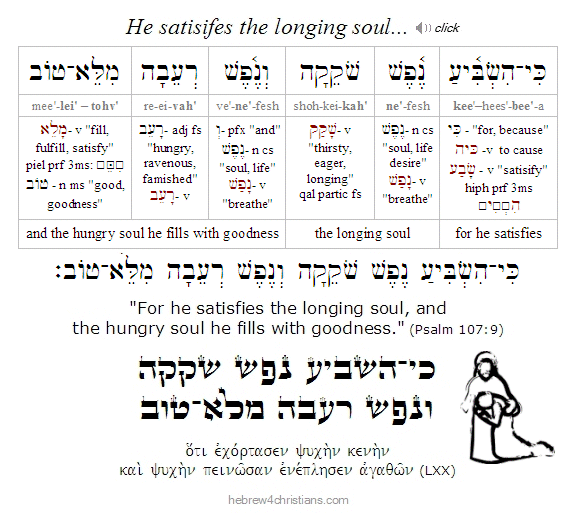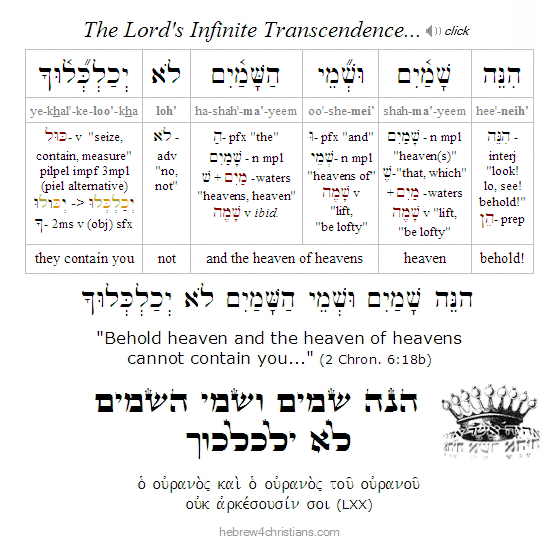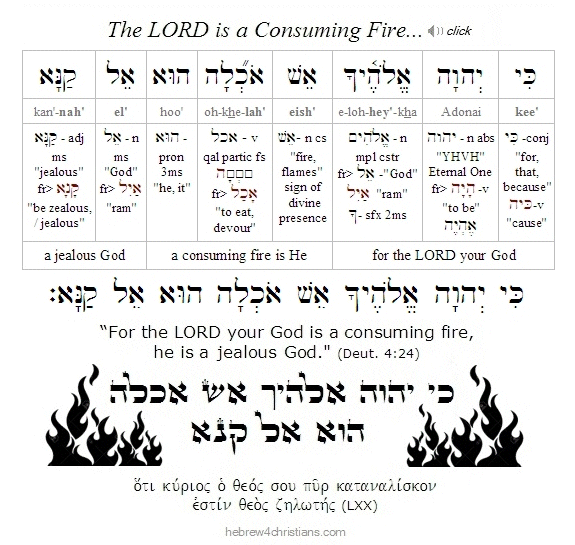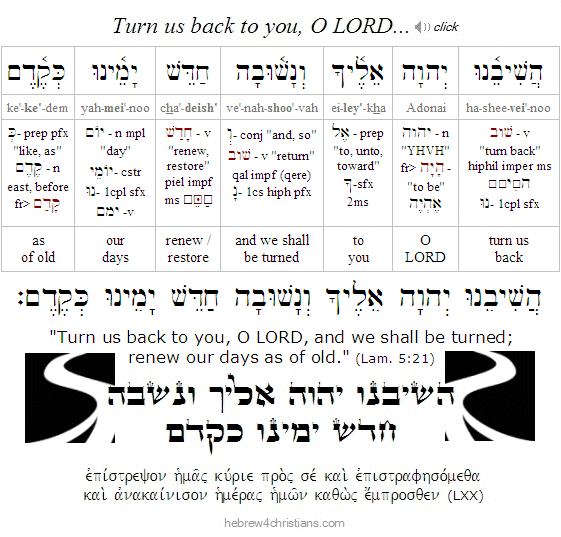|
Jewish Holiday Calendar
For August 2024 site updates, please scroll past this entry....
In the summer there occurs a three week period of mourning that begins with the Fast of Tammuz and ends with Tishah B'Av. The last nine days of this three week period (i.e., from Av 1 until Av 9th) are days of increased mourning. However, after this somber time, the romantic holiday of Tu B'Av, the 15th of Av occurs. Summer ends with the 30 days of the month of Elul, a yearly season of teshuvah (repentance) that anticipates Rosh Hashanah and the fall holidays. The 30 days of Elul are combined with the first 10 days of the month of Tishri to create the "Forty Days of Teshuvah" that culminate with Yom Kippur.
Because they occur between the spring and fall holidays, the summer holidays help us prepare for the second coming of the Messiah:
The Summer Holidays:

Note that in accordance with tradition, holiday dates begin at sundown. Moreover, some holidays may be postponed one day if they happen to fall on the weekly Sabbath:
- Month of Tammuz (Fri. July 5th [eve] - Mon. Aug. 5th [day])
- Month of Av (Mon. Aug. 5th [eve] - Mon. Sept. 2nd [day])
- Month of Elul (Mon. Sept. 2nd [eve] - Wed. Oct. 2nd [day])
- Month of Tishri (Wed. Oct. 2nd [eve] - Thur. Oct. 31st [day])
Note: For more about the dates of these holidays see the Calendar pages....
August 2024 Updates
Note: If any page content appears to be missing, please refresh the page...
Daily Dvar Podcast:
Seeing anbd Decision...

08.30.24 (Av 26, 5784) Shabbat Shalom chaverim. In this "Daily Dvar" broadcast, I discuss our responsibility to discern the spiritual significance hidden within our everyday choices and therefore to come alive and choose life! Links are below.
Linked Podcasts:
Pilgrimage in a Circle...
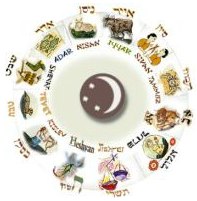
[ "Every Jew should think of himself as having come out of Egypt." - Traditional Haggadah ]
08.30.24 (Av 26, 5784) Our Torah reading Re'eh this week concludes with the commandment to make three "pilgrimage festivals" (i.e., shelosh regalim) each year: Passover, Shavuot (Pentecost), and Sukkot (Tabernacles). In the Torah, these "holidays" are called "appointed times" (i.e., mo'edim: מוֹעֲדִים), a word which comes from a root meaning witness (עֵד). Other words formed from this root include edah (עֵדָה), a congregation, edut (עֵדוּת), a testimony, and so on. The related verb ya'ad (יָעַד) means to meet, assemble, or even to betroth. The significance of the holy days, then, is for the covenant people of the LORD to bear witness to God's love and faithfulness by revisiting our history and by looking forward to their ultimate fulfillment, that is, the heavenly reality the holidays adumbrate. Meanwhile we trust in God's prophetic plan as revealed in the holy calendar, and observe the seasons as he has commanded. As it says, "All the paths of the LORD are compassion and truth to those keeping His covenant and His testimonies."
כָּל־אָרְחוֹת יְהוָה חֶסֶד וֶאֱמֶת
לְנצְרֵי בְרִיתוֹ וְעֵדתָיו
kohl-ohr·choht · Adonai · che'·sed · ve·e·met
le·noh·tze·rei · ve·ree·toh · ve·e·doh·tahv

"All the paths of the LORD are compassion and truth
to those keeping His covenant and His testimonies."
(Psalm 25:10)

Hebrew Study Card
Metaphorically the "paths of the Lord" (i.e., orchot Adonai: אָרְחוֹת יְהוָה) are likened to ruts or grooves created by the wheels of a caravan (i.e., orchah: אוֹרחָה) passing repeatedly over the same ground. These paths signify the Divine Presence journeying with God's children in this world. In temporal terms, we are able to discern the path by means of the divine calendar. God's love and faithfulness attend to His covenant (i.e., brit: בְּרִית, "pledge" or promise) and to the commemorations of the yearly "appointed times" (i.e., mo'edim: מוֹעֲדִם) which testify to God's love and faithfulness. Keeping God's testimonies, then, means that we will be careful to observe the biblical holidays in order to witness to God's truth...
Hebrew Lesson
Psalm 25:10 Hebrew reading (click):
Shababt Shalom, friends. May this coming Season of Teshuvah be one wherein we all draw closer to the LORD our God... Choose life and blessing! Amen.
Teach us to Pray...
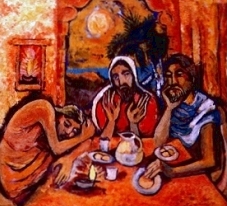
[ "Prayer is not what is done by us, but rather what is done by the Holy Spirit in us." ]
08.30.24 (Av 26, 5784) There is only once place in the New Testament where the disciples asked Yeshua to teach them something, and that was when they said, "Lord, teach us to pray" (Luke 11:1). Yeshua then responded by giving them a pattern of prayer that's been called "the Lord's Prayer," though it's better to think of it as a model for prayer instead of a formulaic petition to recite. After all, the disciples asked "Teach us to pray," not "teach us a prayer," as if a special prayer could serve as a sort of incantation or way to propitiate God.
Yeshua points us to the Father. He did not suggest using Pharisaical expressions such as "Barukh attah Adonai," "Ribbono shel Olam," or "Elohei Avoteinu," nor did he endorse praying three times a day as decreed by the elders of the Great Assembly. No, Yeshua taught us to come to God using the simple word "Father." This is the language of familiar intimacy that expresses the trust a young child has for his earthly father.
So Yeshua teaches us to pray in heartfelt confidence that God is our caring heavenly Father, and this implies that we understand and regard ourselves as his beloved children. We have access to God's heart in a direct and meaningful way.
As God's beloved children, we are to honor and our heavenly Father and to esteem his will and vision for our destiny. "Holy is Thy name"; "Thy will be done"; "Thy kingdom come" - all these matters come before requests for our "daily bread" -- and even before matters of our need for forgiveness of sin. Our course God cares for our daily needs, our forgiveness, our deliverance from evil, and so on, but Yeshua concentrates our focus on the Father and our identity as his children first of all. Da lifnei mi attah omed: "Know before whom you stand."
Regarding our personal petitions, it is wise to understand that your Heavenly Father gives what you need, not what you may want at the time. "Ask and it shall be given you" means "keep on asking" (Luke 11:9). If a recurring request seems to go unanswered, remember that initial barriers are not necessarily final refusals but are meant to yield what is best for you (Rom. 8:28). We can be confident, however, that God hears us when we pray andthat he gives "good gifts" to those who ask Him (Matt. 7:11) -- in particular, gifts of the Holy Spirit (Luke 11:13). God gives wisdom to those who ask for it (James 1:5) and imparts the "spirit of wisdom and revelation to know him better" (Eph. 1:17). If we ask in accordance with his will, we have confidence that he hears us and will act on our behalf (1 John 5:14-15). These are "spiritual blessings in heavenly places" representing the deepest need of our hearts.
We are instructed to "present ourselves to God as those who are alive from the dead" (Rom. 6:13), indicating that we are to come confident of his acceptance because of what Yeshua has done on our behalf. We are "crucified with Christ" (Gal. 2:20) and share in his resurrection life. In the Torah the "daily sacrifice," or korban tamid (קָרְבַּן תָּמִיד), was offered to the LORD every morning and evening upon the altar, which corresponds to being a "living sacrifice" (i.e., korban chai: קָרְבָּן חַי) to the LORD (Rom. 12:1-2). We must take up our cross daily (Luke 9:23). We come "boldly" before the throne of grace. We are made "alive from the dead" to access God's presence and heart for us at all times. We have been made new creations, members of God's household, esteemed, eternally beloved....
"Take my soul and body's powers;
take my memory, mind and will;
All my goods, all my hours;
All I know, and all I feel;
All I think, or speak, or do;
take my heart - and make it new."
- Charles Wesley
Hebrew Lesson
Matthew 6:9b reading (click):
Today is the Day...
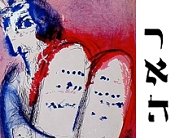
[ "The reward for doing one mitzvah is the opportunity to do another mitzvah." - Avot 4:2 ]
08.29.24 (Av 25, 5784) It is written in our Torah portion this week (Re'eh), "Behold I am setting before you this day a blessing and a curse" (Deut. 11:26). The Hebrew for "I am setting" is an active participle (נֹתֵן), however in context we might have expected for it to be written in the past tense: "I have set (נָתַתִּי) before you this day..." The Vilna Gaon said this shows us that Torah is written for the present time and God constantly gives us choices, day by day, hour by hour, wherein we may choose the good and reject the evil, or conversely that we may choose the evil and reject the good.
The admonition to "choose life" therefore is ongoing and inevitable. As Jean-Paul Sartre said, "man is condemned to be free," since people cannot deny their responsibility to choose apart from "bad faith," by which he meant passively playing the victim by blaming their circumstances or letting other people chose for them... Our present choice is ours to make for this hour, and it is not based on the past nor in the future. The blessing (or curse) is presented "this day," that is, the day of your present reality, and it is therefore your opportunity to "seek first the kingdom of God and his righteousness" and to "take no thought of tomorrow," as Yeshua taught (Matt. 6:33-34).
Note that the blessing (i.e., ha'berakhah: אֶת־הַבְּרָכָה) is realized if you "hearken" (i.e., shema: שׁמע) to God's commandments and do them (the direct object marker (את) signifying Yeshua, the First and the Last, precedes the blessing), which indicates that the keeping of God's commandments is the blessing itself, substantiating that you are loyal to God's will.
Rabbi Nachman of Breslov commented that God sends blessings every day, undifferentiated and given for all people, just as Yeshua said, "Your heavenly Father makes the sun to rise on the evil and on the good, and sends rain on the just and on the unjust alike" (Matt. 5:45). God's blessing descends upon all, but it is up to the individual to receive it, just as the manna fell silently in the darkness but later was to be collected before it would melt away... Amen. Blessed are the pure in heart, Yeshua said, for they shall see God (Matt. 5:8).
Hebrew Lesson
Psalm 118:24 reading (click):
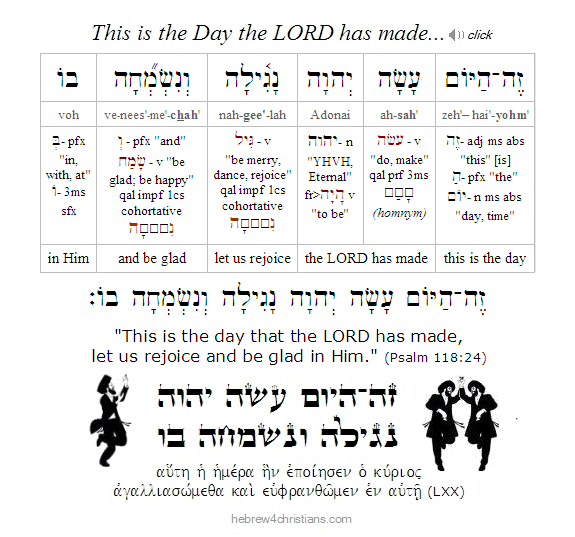 |
Daily Dvar Podcast:
Torah of the Good Eye...

08.29.24 (Av 25, 5784) Shalom chaverim. The way we choose to see is ultimately a spiritual decision. In this "Daily Dvar broadcast, I discuss the "Torah of the Good Eye" and the spiritual need to seek goodness in everyday reality. I hope you will find it helpful. Links are below.
Linked Podcasts:
The 40 Days of Teshuvah...
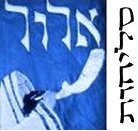
[ The Forty Day "Season of Repentance" begins Mon., Sept. 2nd at sundown this year... ]
08.29.24 (Av 25, 5784) The last month of the Jewish calendar (counting from Tishri) is called Elul (אֱלוּל), which begins at sundown on Monday, September 2nd this year. Traditionally, Rosh Chodesh Elul marks the beginning of a forty day "Season of Teshuvah" that culminates on the solemn holiday of Yom Kippur. The month of Elul is therefore a time set aside each year to prepare for the Yamim Nora'im, the "Days of Awe," by getting our spiritual house in order.
During this time we make additional effort to repent, or "turn [shuv] toward God." In Jewish tradition, these 40 days are sometimes called Yemei Ratzon (יְמֵי רָצוֹן) - "Days of Favor," since it was during this time that the LORD forgave the Jewish nation after the sin of the Golden Calf (Pirke d'Reb Eliezar). Some of the sages liken these 40 days to the number of days it takes for the human fetus to be formed within the womb.
The advent of the "Season of Teshuvah" reminds us that we all fail, that we all are broken people, and that errors and mistakes are part of our daily spiritual life... We journey toward humility and compassion rather than struggle for perfection; we confess our need for forgiveness and seek reconciliation with all those we might have harmed... During this season it is common enough to hear messages about our need to turn and draw near to God for life, but it is equally important to remember that God turns and draws near to the brokenhearted for consolation. As it is said, the Lord is near to the nishbar lev (נִשְׁבָּר לֵב), the one with a broken and crushed heart (Psalm 34:18).
Brokenness is the means through which God performs some of His deepest work within our hearts. A.W. Tozer once said, "It is doubtful whether God can bless a man greatly until he has hurt him deeply." Likewise Alan Redpath once wrote, "When God wants to do an impossible task, he takes an impossible individual – and crushes him." William James called this deep work of the spiritual life Zerrissenheit, a term that roughly can be translated as "torn-to-pieces-hood," or a state of being utterly broken and in disarray... The brokenhearted live in day-to-day dependence upon God for the miracle...
"Resolved, to act, in all respects, both speaking and doing, as if nobody had been so vile as I, and as if I had committed the same sins, or had the same infirmities or failings as others; and that I will let the knowledge of their failings promote nothing but shame in myself, and prove only an occasion of my confessing my own sins and misery to God." - Jonathan Edwards
Hebrew Lesson
Psalm 34:18 Hebrew reading (click):
Note that the word "Elul" (אֱלוּל) may be read as an acronym for the phrase,
ani le'dodi ve'dodi li (אֲנִי לְדוֹדִי וְדוֹדִי לִי), "I am my beloved's, and my beloved in mine"
(Song 6:3), to encourage to become full of desire for the Beloved of our soul...
Walking after the LORD...
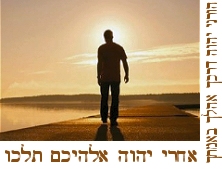
[ The following is related to our Torah reading for this week, parashat Re'eh.... ]
08.28.24 (Av 24, 5784) In our Torah portion for this week (parashat Re'eh) we read: "You shall walk after the LORD your God and fear him and keep his commandments and heed his voice; you shall serve him and cleave to him" (Deut. 13:4). Here the sages note that the word "after" (i.e., acharei: אַחֲרֵי) implies a sense of distance – and that when we feel distant from God, we should begin taking steps so that we can learn to cleave to him...
Experiencing "distance" is a blessing from heaven, then, since without sensing our great need, why would we turn and seek God for healing and life? Indeed, someone who regards himself as close to God may actually be far away from him, while the one who realizes how distant he is may in truth be drawing close (see Luke 18:9-14).
We cleave to God (דְּבָקוּת) only if we first see ourselves as "acharei," or removed, as it is written: "The LORD is near to the brokenhearted (קָרוֹב יְהוָה לְנִשְׁבְּרֵי־לֵב) and saves the crushed in spirit" (Psalm 34:18). As we learn to walk with God, we are in tension between reverence and love; we feel distant yet we are invited to draw close to God's heart to heal our alienation (James 4:8).
Brokenness distills the intentions of the heart by helping us to be more honest with ourselves. We begin to realize that we are more vulnerable than at first we thought; that our faith is not as strong as we imagined, and that our motives are often mixed and unconscious. Illusions are striped away; idols crumble; deeper levels of selfishness are uncovered; the gap between our words and our deeds is exposed...
It is one thing, after all, to intellectually think about faith or to idealize spirituality, but it is quite another to walk out faith in darkness. Yet it is only there, in the rawness of heart, that we discover what we really believe and how our faith makes traction with reality...
Hebrew Lesson
Deut. 13:4a reading (click):
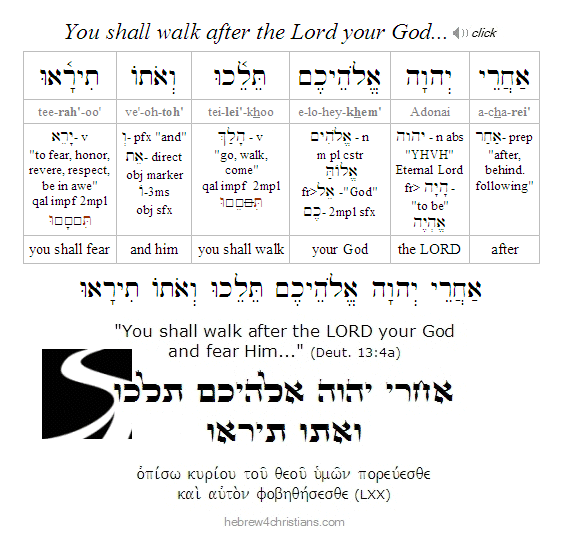 |
Gratitude and Seeing...

[ "Think of yourself as dead. You have lived your life. Now take what's left and live it properly.
- Marcus Aurelius (see Col. 3:2-3). ]
08.27.24 (Av 23, 5784) We are instructed to look for small miracles, everyday "signs and wonders..." In the Torah we read: "And you shall bless the LORD your God for the good land he has given you." (Deut. 8:10), which the sages say implies that whenever we derive benefit or enjoyment from something we are to bless (i.e., thank) God for his goodness. Indeed, Jewish tradition says that if one eats or drinks without saying a blessing, it is as if he has stolen from God. From the verse, "What does the LORD ask of you..." (Deut. 10:12), the sages infer that a person should say at least 100 blessings a day, since the word מה, "what," alludes to the word מאה, a "hundred." The Hebrew term for gratitude is hakarat tovah (הַכָּרַת טוֹבָה), a phrase that means "recognizing the good." The heart looks through the eye, and therefore how we see is ultimately a spiritual decision: "If your eye is "single" (i.e., ἁπλοῦς, sincere, focused)," Yeshua said, "your whole body will be filled with light" (Matt. 6:22). When we see rightly, we are awakened to God's Presence in the little things of life, those small miracles and glories that constantly surround us. The good eye of faith sees hundreds of reasons to bless God for the precious gift of life (1 Cor. 10:31). Open your eyes... The LORD is "enthroned among the blessings of His people" (Psalm 22:3).
Addictions, cravings, lusts, etc., arise from a refusal to be satisfied, by hungering for more than the blessing of the present moment. "My people have committed two evils: they have forsaken me, the fountain of living waters, and hewed out cisterns for themselves, broken cisterns that can hold no water" (Jer. 2:13). The living waters are present for us, but we will only find them if we open our hearts to the wonder of God in this moment. We can "break the spell" of continual dissatisfaction, of the power of greed, ambition, and so on, when we discover that our constant hunger is really a cry for God and His blessing. This is the blessed "hunger and thirst" given by the Spirit (Matt. 5:6). Our sense of inner emptiness is an invitation to come to the waters and drink life. So come to God's table and ask the Lord Yeshua to give you the water that will satisfy your heart's true thirst for life...
It is written: "Oh, taste and see that the LORD is good! Blessed is the man who takes refuge in him! Oh, fear the LORD, you his saints, for those who fear him have no lack" (Psalm 34:8-9). We can only "taste and see" when we are earnest however, when we seek God with passion... When you pray, lift up your heart and soul to God, asking for the miracle to surrender to Him in the truth. Where it says, "with all your heart" (בְּכָל־לְבָבְךָ), present before him all your passion and desires; your hopes and your needs, your fears and your anger; and where it says, "with all your soul" (וּבְכָל־נַפְשְׁךָ), offer before him your very soul, as if to be sacrificed in his service; and where it says, "with all your muchness" (וּבְכָל־מְאדֶךָ) offer to him all your strength, all your means, and all your dreams. Ask to be filled with the Ruach HaKodesh to be enabled to apprehend the glory of God in the face of the Messiah (בִּפְנֵי הַמָּשִׁיחַ), through whom we are being transformed for the glory of God.
Hebrew Lesson
Psalm 34:8 reading (click for audio):
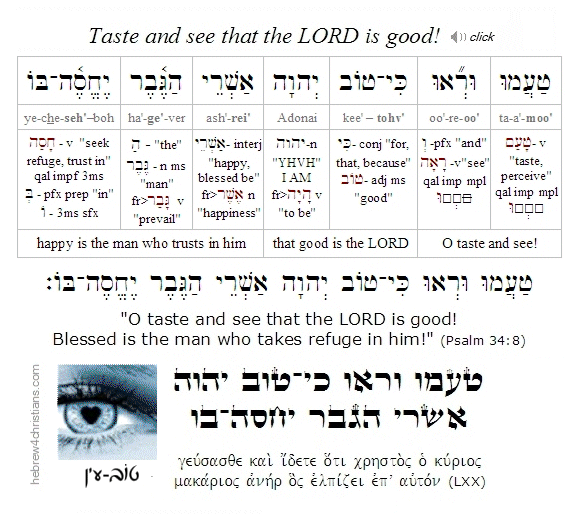 |
HaMakom - the Place of God
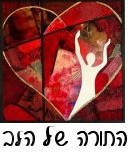
[ "Only the heart knows how to find what is precious." - Fyodor Dostoevsky ]
08.27.24 (Av 23, 5784) From our Torah portion this week (i.e., Re'eh) we read: "But you shall seek the place (הַמָּקוֹם) that the LORD your God will choose... there you shall go" (Deut. 12:5). This indicates the primacy of seeking: you must first seek "the place" and then you can go up (Matt. 6:33). The sages note that the gematria for this verse is the same as "You shall therefore lay up these words of Mine in your heart and in your soul..." (Deut. 11:18), which again reveals that the Divine Presence, "HaMakom" (הַמָּקוֹם), is manifest within the place of our hearts...
If we seek God with all our hearts we will "come there," and we will find Him there. Our yearning for God leads us to the place of His Presence, as it says: "Open to me the gates of righteousness (שַׁעֲרֵי־צֶדֶק), that I may enter through them and give thanks to the LORD" (Psalm 118:19). It is our heartache, our hunger, thirst, and our yearning for love that opens the gate to come before God. Praise the LORD - His heart is the place we truly need.
Hebrew Lesson
Psalm 132:13 reading (click):
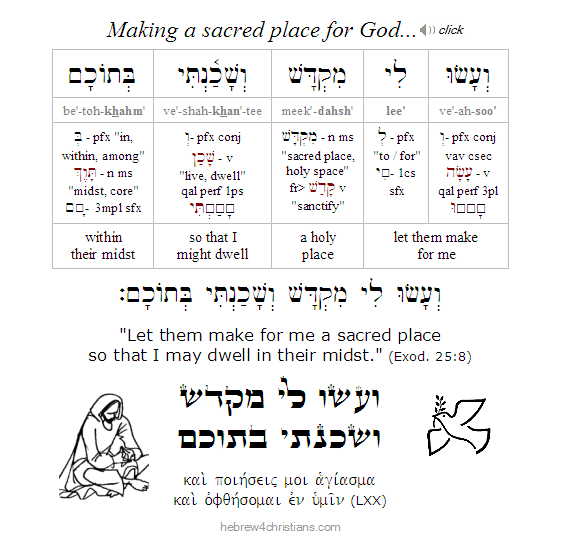 |
Of the "Place of God" (הַמָּקוֹם) the Torah says "that I may dwell in their midst" (Exod. 25:8), which can be translated as "that I may dwell within them," indicating that the point of the Tabernacle was to bring God within the hearts of His people... We must create a place within our hearts, in other words, for God to dwell within us. Yeshua likewise told us that we would experience peace and joy when we "abide in Him." Note that the numeric value of the word mishkan (מִשְׁכָּן) is the same as the word shema (שְׁמַע), "hear" or "listen" (Deut. 6:4). When we really stop to listen to the LORD, we will find His glorious and loving Presence...
Remember who you are...
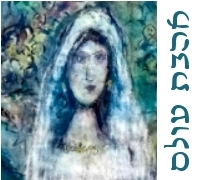
[ "Self-rejection is the greatest enemy of the spiritual life because it contradicts the sacred voice that calls us the Beloved..." - Henri Nouwen ]
08.27.24 (Av 23, 5784) One of the greatest mistakes is to forget who you really are and your beloved status before the LORD... "Fear not, for I have redeemed you; I have called you by name, you are mine" (Isa. 43:1). Forgetting who you are leads to forgetting who the LORD is, just as forgetting who the LORD is leads to forgetting who you are...
In our Torah portion this week (i.e., parashat Re'eh) we read: "You are children of the LORD your God (בָּנִים אַתֶּם לַיהוָה אֱלהֵיכֶם). You shall not cut yourselves for the dead" (Deut. 14:1). Here Moses reminds the people that they are children of the Eternal (יהוה) and therefore they were not to mourn for the dead like those without hope of life beyond the grave... Our God, the Father of Israel, is the Source of Life, and even if our earthly fathers die, we will never be orphans, because the LORD, the Everlasting God who is the "God of the spirits of all flesh" (אֱלהֵי הָרוּחת לְכָל־בָּשָׂר), always watches over us: "He will not let your foot be moved; he who keeps you will not slumber" (Psalm 121:3). But if we forget who we are, if we lose sight of our place in the Heavenly Father's heart, then we are likely to fall into a state of excessive and self-destructive mourning over the losses we experience in this world. In the most tragic cases, this can lead to the darkness of unremedied despair, "living among the tombs, crying out and cutting himself with stones" (Mark 5:5). On the other hand, if remember our place at the Father's table as his children, if we take hold that we are beloved of God - his very own "treasured people" - then we will regard the difficulties we encounter in this world as a test of faith intended for our good (Deut. 8:3,16, Jer. 29:11).
God regards us as his beloved children, and therefore we trust him as a child trusts his father. We may not always understand all that our father does, but we have complete faith in his good will toward us, even in the face of death itself. We do not engage in self-destructive mourning, then, because we are treasured by God and we trust in God's promises for eternal life (John 11:25). Because of this, Jewish halachah (legal custom) puts limits to grieving practices. Excessive mourning, interminable gloom, self-destructive anger, or the refusal to let go of our fear may indicate a lack of faith in God's care as our Father. Remember where it says "God works all things together for good," for that includes even physical death... Let us therefore "hope to the LORD (קַוֵּה אֶל־יְהוָה); be strong and strengthen our heart; and (again) let us hope to the LORD" (Psalm 27:14).
Hebrew Lesson
Isaiah 43:1b reading (click):
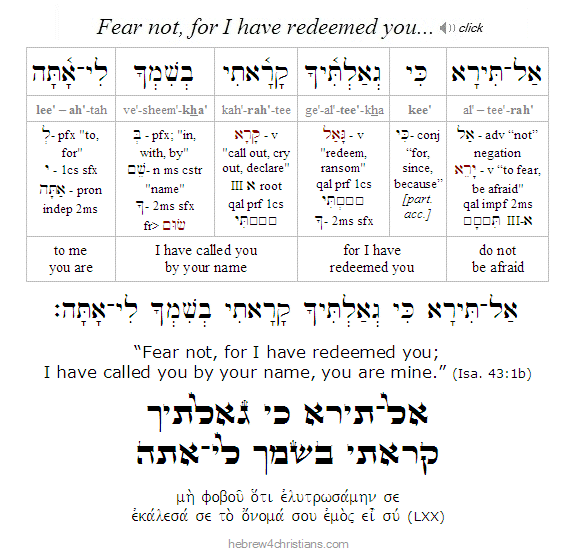 |
Believing and Seeing...
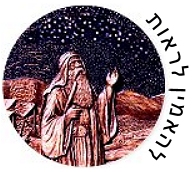
[ "In faith there is enough light for those who want to believe and enough shadows to blind those who don't." - Blaise Pascal ]
08.26.24 (Av 22, 5784) This week's Torah portion is about seeing. It begins with the imperative to understand the implications of our choices: "See (רְאֵה), I set before you today a blessing and a curse..." (Deut. 11:26). Moses challenges us to think clearly about the choices that lie before us and to choose the way of life and blessing.
Some concerns in life present mutually exclusive options, and everything is affected by what you will choose. Kierkegaard, however, warns that many people opt out of making serious decisions by procrastination. He writes: "Cowardice settles deep in our souls like the idle mists on stagnant waters. From it arise unhealthy vapors and deceiving phantoms. The thing that cowards fears most is decision; for decision always scatters the mists, at least for a moment. Cowardice thus hides behind the thought it likes best of all: the crutch of time. Cowardice and time always find a reason for not hurrying, for saying, "Not today, but tomorrow," whereas God in heaven and the eternal say: "Do it today. Now is the day of salvation." Amen. Choosing not to choose is itself a choice, and the moment calls for an immediate response. As Joshua said in the valley of decision: "Chose this day whom you will serve!"
Making a non-trivial choice is a matter of consequence that echoes throughout your life. In this connection note that the Hebrew word for seeing (i.e., ראה) and the word for fearing (i.e., ירא) share the same root, suggesting that we cannot truly see apart from the reverence of God.
Some people say "I'll believe it when I see it," but the heart of faith believes in order to see... You will see it as you believe. "There are only two ways to live your life," Albert Einstein said, "one is as if nothing is a miracle; the other is as if everything is a miracle." The gift of seeing the truth of God is a miracle on the order of being born again. Regarding his conversion C.S. Lewis said, "I believe in Christianity as I believe that the sun has risen. Not only because I see it, but because by it I see everything else." If you believe in the love of God there are no questions; but if you refuse to believe, there are no answers.
"You teach," said Emperor Trajan to Rabbi Joshua, "that your God is everywhere, yet I cannot see him." Joshua said that unlike human kings, the LORD was too powerful for people to see; as it is written in the Torah: "No person shall see Me and live." The emperor was skeptical, however, and insisted that unless he could see God, he would be unable to believe. Joshua then pointed to the sun high in the sky: "Look into the sun and you will see God." The emperor tried to look into the sun, but was forced to cover his eyes to keep them from burning: "I cannot look into the sun," he said. Joshua then replied: "Listen to yourself: If you cannot look into the sun which is but one of God's creations, how can you expect to look at God?" (Sefer HaAggadah)
It's been said that the optimist believes this is the best of all possible worlds; whereas the pessimist is afraid that the optimist is right... Faith is the foundation for everything, and indeed, there can be no knowledge of anything whatsoever apart from faith. It is therefore supremely important for us to think clearly about our faith, since what we believe about God has eternal implications...
Hebrew Lesson
Deut. 30:19b reading (click):
Gathering Real Treasures...

[ "He is no fool who gives what he cannot keep to gain what he cannot lose." - Jim Elliot ]
08.26.24 (Av 22, 5784) In the parable of the "rich fool" (Luke 12:15-21), Yeshua tells the story of a certain rich man who acquired such worldly prosperity that he decided to store it all up so that he could retire in luxury and comfort. However, after he made his preparations God said to him: "You fool! This very night your soul will be collected from you. The things you have prepared, whose will they be?' Yeshua then warned: "This is how it will be for anyone who stores up treasure for himself but is not rich toward God."
We have to be on guard not to insulate ourselves with foolish faith that says we can provide for ourselves or create a hedge against future trouble. This is why Yeshua told his disciples to let go of their possessions, to give away their wealth, for then they would be rich toward God. "For where your treasure is, there will be your heart also" (Luke 12:34).
To live otherwise is to be a fool, that is, someone who misses the point of life. In this passage, the Greek word for "fool" is ἄφρων, which refers to an unthinking or thoughtless person -- someone who does not reflect on the purpose and end of life. In Hebrew the word for such a fool is "kesil" (כְּסִיל), from a root that means to be dull and indifferent to matters of spirituality (Prov. 1:22; 17:16). The fool despises words of wisdom (Prov. 23:9) and has no real objective in life other than that which is found in the immediacy of the moment (Prov. 17:24; 21:20, etc.).
Note that a fool is not a person of low or deficient intelligence but rather someone who is decidedly indifferent to spiritual reality. The fool says in his heart that God doesn't matter and that the goal of life is to gain carnal pleasures (Psalm 14:1). He is egocentric, hedonistic, and blind to the real significance of life. He focuses on this passing world and its vanities and not on the world to come. עֵינֵי כְסִיל בִּקְצֵה־אָרֶץ - "The eyes of a fool are in the ends of the earth" (Prov. 17:24). He is someone who "stores up treasure for himself but is not rich toward God."
On the other hand, as the late Jim Elliot said, "He is no fool who gives what he cannot keep to gain what he cannot lose." That's gathering treasure toward God (Luke 12:21). And we gain this godly treasure by means of doing tzedakah (צְדָקָה), that is, giving to others (Prov. 19:17; Matt. 10:42). The Hebrew word for love, "ahavah" (אַהֲבָה), means to give (הב) in sacrificial kindness or compassion. And indeed this is the heart of God revealed in the sacrificial life of Yeshua. When we reciprocate by giving of ourselves to God, we are made rich in the blessing of his love.
Clinging to worldly "riches" is dangerous because it creates a false sense of security that insulates us from our need for the Lord. Being rich toward this world makes you a fool before God. As Yeshua taught us, "Whoever desires to save his life will lose it, but whoever loses his life for my sake will find it. For what profit is it to a man if he gains the whole world, and loses his own soul? Or what will a man give in exchange for his soul?" (Matt. 16:25-26). "What is highly esteemed among men is an abomination in the sight of God" (Luke 16:15). "Until you have given up yourself to Him, you will not have a real self" (C. S. Lewis). Indeed worldly power and prosperity are often antithetical to spiritual success...
Unlike the rich fool who sought his security by storing his treasures into "larger barns," Yeshua told us not to be anxious and to trust in God alone for our security. He pointed to the birds of the air that "neither sow nor reap nor gather into barns." God provides and personally cares for them; won't he also therefore take care of you? (Luke 12:24). And he continued by asking "which of you by being anxious can add a single hour to his span of life?" The Greek word for "anxious" in this verse is μεριμνάω, from μερίζω, meaning to be inwardly divided or "double-minded." We are not to be "cross-eyed" in the way we look at things. Keep your mind set on the Lord and his care (Psalm 16:8). As Yeshua said to Peter after he sank in the waters, "O you of little faith, why did you doubt?" (i.e., διστάζω, lit., "think twice").
When we worry about things beyond our control we are acting like the rich fool who falsely assumed that he was in control of his life and that his security was to be found in his own resources... We build our lives upon the sand rather than the rock of God's truth; we focus on this world more than in the presence and promises of God.
Being "rich toward God" means partaking in the heavenly treasures of eternal life now, and investing the worldly treasures of temporal life for our everlasting blessing and the glory of God. It is a reversal of the "wisdom of the rich fool" because it values what God values over ourselves.... "Seek first the kingdom of God and his righteousness" (Matt. 6:3). True life is not to be found in the comforts and vanities of this world, but in earnest relationship with the Living God who is the Source and End of all enduring meaning, life, and happiness. Our treasure, our "riches toward God," is Yeshua, and that is where we will find our hearts.
Hebrew Lesson
Psalm 31:19 reading (click for audio):
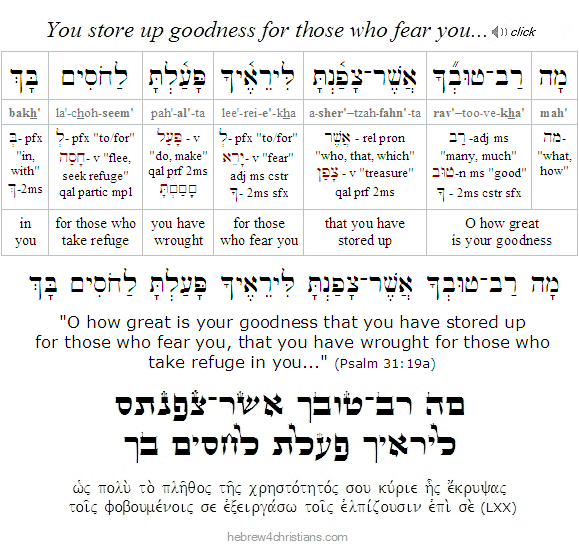 |
The Great Commandment
Our heart's greatest need...
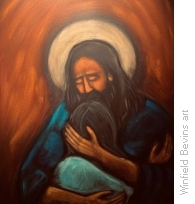
08.26.24 (Av 22, 5784) Both Moses and Yeshua taught that the "great commandment" of Torah (הַמִּצְוָה הַגְּדוֹלָה בַּתּוֹרָה), that is, the imperative which is of utmost spiritual importance, is to love God with all of our being. Nothing is more important, and nothing better expresses the essential duty of our lives. And as I hope you will see, this great commandment is fundamentally an appeal to awaken to beauty, mystery, holiness, and peace. It's an invitation to be radically made whole, set free from fear and despair. It's the call to receive healing of your alienation and to know a real sense of belonging. This is the great commandment: to open your heart to receive God's love and to learn to love...
Just as God is the Source of all love, so loving God is the goal or end of our existence; it is our raison d'etre, our very reason for being. It is the answer to the haunting existential question of why we exist. No matter who you are or what you have done, the greatest thing about you is that you are loved by God, and that your central need is to receive God's love and to live it out in your life.
Love is inherently relational. It is not self-reflexive but giving and expansive. It seeks the beloved; it hungers and thirsts for connection. As the foundation of reality, our relationship with God teaches us who we really are, namely, sacred beings made in the divine image but who, despite being created to enjoy intimate fellowship with God, have turned away and fallen into spiritual blindness and insanity. The ideal has been lost to the real. Human life has become a tragedy, a nightmare, a prison of suffering and vanity.
This is the problem of the "human condition." We need deliverance from the darkness of sin, from the nightmare of our alienation from God. We must find the way out of our spiritually lost condition lest we succumb to utter despair and perish in shame. We need a new sort of life to overcome the "spiritual death" that enslaves us. To be healed we must be "reborn" by God's spirit and made into a "new creation." This is the only way to be saved from ourselves and our own insanity. We need a miracle, and this miracle is found in Yeshua, the only true Savior and Healer of the world...
As we come to believe the promise of who we really are, and as we answer and turn to God's love, our spiritual eyes will be opened and we will begin to understand God's will. We will regard both ourselves and other people as significant, valuable, and worthy of our respect. Indeed we will cherish and honor all of creation since it is God's expression and personal handiwork. As image bearers of God, we will become emissaries of his blessing, and we will discover that all of his commandments of Torah are "for life" (Lev. 18:5), which means they were given to promote love, healing, and shalom.
In Jewish tradition the great commandment is called the "Shema," meaning to listen, from the first word of Deuteronomy 6:4, "Hear (שְׁמַע), O Israel, the LORD is our God, the LORD alone." The opening passage continues to the next verse, called "Ve'ahvata," which reads: "and you shall love (וְאָהַבְתָּ) the LORD your God with all your heart, with all your soul, and with all your strength," which expresses the fundamental duty to love God above everything else in our lives. Yeshua affirmed the great commandment when he said: "The first of all the commandments is, 'Hear, O Israel, the Lord our God is one Lord, and you shall love the LORD your God with all your heart, with all your soul, with all your mind, and with all your strength.' Αὕτη πρώτη ἐντολή- This is the first commandment" (Mark 12:29-30).
Loving God is therefore the central issue of life, and the conduit of love is the heart. As Khalil Gibran put it, "He came to make the human heart a Temple, the soul an Altar, and the mind a priest." It is amazingly wonderful that the love of God is the core meaning of our existence, and yet love is not static but seeks the beloved, and therefore we are called to love God in return, and this is best expressed when we love our "neighbor" as ourselves. That is the second great commandment, namely, to love others as we love ourselves (Lev. 19:18, Mark 12:31, Gal. 5:14). Note here that loving others as we love ourselves logically implies that we love ourselves, which means that we confess God's love for us is real. We love others "as" we love ourselves, and we love ourselves "as" we accept God's love for us, so again love is relational, reciprocal, and a matter of profound communion.
But what does it mean to love God "be'khol levavkha," with all your being? For that matter, what does the word "love" really mean? In English the word "love" comes from the Hebrew word lev (לֵב), meaning heart, but the Hebrew word for love is "ahavah" (אהבה), which can be broken down to the letter Alef (א), a preformative meaning "I will," plus the root "hav" (הב) meaning "to give," which when put together indicates that love is a matter of a willingness to give. Love is therefore a spirit of generosity, of grace, and of compassion, the greatest example of which is the giving of God in the sacrificial life of his son Yeshua. "God is love" is expressed in the crucifixion of himself to save us from ourselves by giving to us forgiveness, healing, and the blessing of eternal life.
Notice that the commandment to love God, the Shema, is set in the context of Moses' appeal to Israel to keep "the commandments" of God, and therefore it serves as a "meta-commandment" to keep God's other commandments. Love is therefore the ground or foundation for the commandments, as the apostle John affirmed: "For this is the love of God, that we keep his commandments, and His commandments are not burdensome," and as Yeshua repeatedly taught his disciples: "If you love me, you will keep my commandments" (1 John 5:3, John 14:15). Doing God's will by keeping his commandments, then, expresses your love for God. If you do not care to keep God's commandments, then you reveal that your love for God is not genuine or sincere... Loving God is the response to God's blessing, while indifference leads to exile. The Shema, then, can be understood as an appeal to care, to keep faith, and to encounter God's love.
The Ve'ahavta ("you shall love") does not appeal to merely outward forms of obedience, of course, but to the inmost depths: with all your heart (בְּכָל־לְבָבְךָ), and with all your soul (וּבְכָל־נַפְשְׁךָ) and with all your strength (וּבְכָל־מְאֹדֶךָ). The traditional sages interpret your "heart" (לב) to refer to wisdom, and therefore to your mind, the "soul" (נפש) to refer your life energy - even if you should give up your life for his sake - and your "strength" or your "might" (מאד) to refer to your material possessions and money.
Regarding the heart, or the duty to attain wisdom, the Shema says that we should diligently repeat these matters to our children (וְשִׁנַּנְתָּם לְבָנֶיךָ), talking to them as we sit in our homes (בְּשִׁבְתְּךָ בְּבֵיתֶךָ), as we walk along the way (וּבְלֶכְתְּךָ בַדֶּרֶךְ), and whenever we lie down to sleep (וּבְשָׁכְבְּךָ) and whenever we rise up (וּבְקוּמֶךָ). In other words, the love of God should move us to regard him in every circumstance of our lives. Our father Abraham "got many souls" by persuading others of the truth and their duty to know God (Gen. 12:5).
So loving God is the point of life, the very reason for our existence, and the essence of what makes life worth living. But what does it mean to love God, and how is it possible to even do so? These seem to be vital questions as we consider further the duties of the heart...
Loving God is connected to worship, that is, ascribing worth to God by valuing him as the highest good and our ultimate blessing. In Hebrew worship is expressed using the root word shachah (שָׁחָה), meaning to bow down in homage, usually in hitapa'el (reflexive) form suggesting an inner state of humility and reverence. The impulse behind worship is gratitude for the blessing of life combined with a sense of awe - an awareness of the overwhleming beauty of the LORD and the glory of his holiness...
To love God certainly implies that we are grateful for the gift of our lives and that we care enough to listen to him and respond to his heart (i.e., his will). As the psalmist prayed: "With all my heart I seek you. O let me not wander from your commandments" (Psalm 119:10). It is absurd to think someone can love God and be indifferent to what God wants. People may "draw near to God with their lips" but their hearts may be removed from him (Isa. 29:13). Yeshua asks, "Why do you call me, 'Lord, Lord,' and do not the things I say?" (Luke 6:46). If you truly love the Lord, wouldn't you want to do what he asks of you?
There is an emotional aspect of love that is essential. When you earnestly love someone they will mean everything to you. You will irresistably be drawn to them, and they will always be on your mind. You will miss them and want to spend time alone with them. Your heart will be stirred at the very thought of them, and you will be overjoyed when you finally are able to be together. In the time of your communion with the beloved there is a deep sense of appreciation, connection, acceptance, and understanding.
Kierkegaard wonders what sort of a lover would he be who had no great desire to be with his beloved and take care of her. He considers it a mockery of love to give to her sustenance yet to have no affection in his heart. Psalm 91:14 reads, "Because he has set his love upon me, therefore will I deliver him: I will set him on high, because he has known my name." The heart that passionately desires God knows God's Name.
A nagging question may be raised about whether such love can be commanded. After all, can feelings be commanded? In response it may be asked whether love is a feeling or something more? As we have seen the "command" to love is an invitation to "taste and see" that the LORD is good, and moreover that the invitation to believe is not about good feelings as much as it is about reality. It is the invitation to come alive to mystery, beauty, and truth. It's to be radically made whole, set free from fear and despair. But fundamentally love is a decision, an act of the will driven by conviction of the truth, and such a decision will lead to feelings of gratitude, loyalty, delight, wonder, desire, and so on. The same may be said regarding the commandment to fear God (Deut. 6:13). This sort of fear is not about the fear of punishment but rather appreciating the "awful goodness" and majesty of God. The fear of the LORD (יִרְאַת יהוה) is love's "fear and trembling" as it encounters the glorious beauty, the incomprehensible greatness, and overwhelming wonder of God.
Love and fear, then, are two sides of the same thing, as it says in Deuteronomy 10:12-13, "And now, O Israel, what does the LORD your God ask of you, but to fear (לִירָא) the LORD your God, to live (לָלֶכֶת) in all His ways, and to love Him (לְאהב אֹתוֹ), and to worship (לעבודה) the LORD your God with all your heart (בְּכָל־לְבָבְךָ) and with all your soul (בְּכָל־נַפְשֶׁךָ) -- to keep (לִשְׁמֹר) the commandments and statutes of the LORD, which I am commanding you today for your good (לְטוֹב לָךְ)?"
In this connection Maimonides (following Aristotle) said that you can command actions that will eventually create such feelings, and therefore habits can be transformed into virtues of the heart. As you do the commandments you will authenticate their validity and thereby realize affections that are associated with them... This is especially true of the foundational commandment of all the Scriptures, namely to believe in the Lord (Exod. 20:2), and to do his will. The rabbis of Yeshua's day once tested him by asking, "What must we do, to be doing the works of God?" and Yeshua answered them, "This is the work of God, that you believe in the one whom God has sent" (John 6:28-29). The commandment to repent and believe in God's redemptive love given in Yeshua the Messiah, then, is the starting point of knowing the love of God, and the Holy Spirit (רוח הקודש) authenticates the truth through an "inner witness" that reveals the divine presence within our hearts (Rom. 5:5). This is sometimes called argumentum spiritus sancti, or the conviction of the Holy Spirit. Teshuvah (repentance) comes first so that we know God's tender mercies and forgiveness in relation to his sacrificial love (John 3:16).
The fear of God is about his glory, transcendence, and utter sanctity, whereas the love of God is about God's compassion, immanence, and healing for our lives, and both are fully revealed in the passion of Yeshua as the Lamb of God. The fear of God, however, is basic, since without first understanding God's greatness as our Creator and the Lawgiver who insists that we regard ourselves and others as sacred, we will not appreciate the nature of his forgiveness and compassion given in Messiah.
It is written in our Scriptures: "My people are destroyed for the lack of knowledge" (Hos. 4:6). Maimonides comments "One only loves God with the knowledge with which one knows him. As the knowledge, so will be the love" (Mishneh Torah). To know God truly is to love him. This is the "mode" of knowing God. As it is written: "For with you is the fountain of life; in your light do we see light" (Psalm 36:9). The knowledge of truth of God sets us free, as Yeshua taught, because the truth is the message of the gospel itself (John 8:32; 2 Cor. 4:6). It is the love of the truth that leads to salvation (2 Thess. 2:10).
Knowledge and love derive from the same source, as when it was said that Adam "knew" Eve his wife (וְהָאָדָם יָדַע אֶת־חַוָּה) and she conceived (Gen. 4:1). You cannot know anything without first caring about truth. Indeed every science presupposes that it is better to know than not to know, and therefore epistemic value is assumed... The ancient pagan philosophers understood this. For instance Plato said that knowledge could not take root in an alien nature, and to understand something a person must live with it and develop an affinity with it (Republic). He later spoke of transformation that comes through intimate knowledge. By studying eternal verities such as mathematics, a person will gradually lose interest in ephemeral things and focus on the eternal "forms" of what is ultimately real. Kierkegaard famously said that "truth is subjectivity," by which he did not mean to suggest that "truth is subjective" and therefore relative, but rather that how something is known can disclose what it is. This is particularly the case regarding knowing God or falling in love, which are inaccessible without personal passion. It also applies to self-knowledge. As Dostoevsky wrote, "Above all, don't lie to yourself. The man who lies to himself and listens to his own lie comes to a point that he cannot distinguish the truth within him, or around him, and so loses all respect for himself and for others. And having no respect he ceases to love." As Chesterton said: "You can only find truth with logic if you have already found truth without it."
I have mentioned before that the Ve'ahavta ("thou shalt love") can be understood not only as a prescription but as a prophecy: "You shall love the LORD" is your ultimate destiny, even if at present you are battling through ambivalence and uncertainty. Love is the end (τέλος) of your existence, your place within God's heart, and heaven itself. Others have said, however, that the Ve'ahavta is a revelation of God, a disclosure of his heart. In that sense God makes himself vulnerable by asking us to respond to him... "Behold I stand at the door and knock..." (Rev. 3:20). This is because God is not some philosophical abstraction like Aristotle's Unmoved Mover, or an object of theological contemplation, but is first and foremost a Person who desires and seeks our love. That God speaks to us and "empties himself" so that we can understand him is the revelation of his love. He is the Word of God who invites us to love him because it is the invitation that opens the very possibility and awakens the soul to love at all. As it says: "We love him because he first loved us" (1 John 4:19). God's imperative (or plea) to love him is heard when we receive the inestimable blessing that we are his beloved. We only can know ourselves as loved by means of his love, and through this "first love" we are able to love others (Lev. 16:18; Matt. 22:39).
The declaration that "God is love" (ὁ θεὸς ἀγάπη ἐστίν) is the underlying and overarching reason for all the commandments and imperatives of Scripture. The commandments are opportunities for our connection with God. As we fulfill them we become "partners with God" in healing the world. Instead of thinking we "ought" to keep the commandments lest we be punished, it is better to think that by doing the commandments we come to know God's heart in all that we do. The imperative language is used to remind us of the profound significance of our actions...
God's love overcomes the powers of sin, hell, and death. It is the gate of our healing opened at the cross of Messiah. The regenerated soul, redeemed and known to be loved by God, triumphs over the dust of death. This is experienced as a form of resurrection, a shocking adventure like Moses' encounter at the burning bush or Paul's blinding vision of the risen Messiah on the road to Damascus. "You must be born again" said Yeshua. You must experience an entirely new realm of existence as a child with whom God is well-pleased.
It is by grace your heart hears the Shema, that is, God's invitation to know his love. By studying the Scriptures you encounter various characterizations of God, for example, as your Creator, as the Healer of your fears, as the Deliverer who rescues you from the darkness of the curse; as the Good Shepherd who seeks for your soul; as the Lamb of God who exchanges his life for your own; as the Faithful Redeemer who delivers you from slavery and exile; as the Atonement of God who restores you and cleanses you from sin, but most especially in the revelation of his heart in Yeshua, who substantiates and embodies God's Presence and knows the language of your pain, and who promises eternal life to all who put their hope in him. The Holy Spirit comforts you with the inner witness of God's truth; you have received the "Spirit of adoption" by whom you cry out, "Abba, Father," sacred names of intimacy and closeness...
The revelation of God's love is also built upon the testimony and experiences of God's people over the millennia, though it is not always obvious what the love of God will look like in the lives of those who trust in him. For example Job proved his love for God in the ash heap of painful despair yet later found consolation and blessing, while King David extolled the goodness of God for overcoming his enemies. The same may be said of Moses' intercession to die in place of his people (Exod. 32:30-32), which foreshadowed Yeshua's death on the cross for the sake of God's redeeming love.
So the commandment to love God reveals the means for the heart to know his love. It is a circle that begins and ends in God's grace and compassion for us all. The answer may be expressed in different ways for different people, but it is not likely expressed in religious dogmatism that regards God's truth in "geometric" or axiomatic terms, nor is it a recipe or set of rituals that defines an authentic spiritual life. It is not found in an esoteric sacramental system but in a heart response that is alive to God's passion and that shares in that passion. It is more like a love poem than a catechism; it is an affair of the heart more than a system of theology. It is known and experienced in an "I-Thou" relationship with the Living God, the Ascended One (אֵל עֶלְיוֹן) who overcame every obstacle to bring us back to life and into the open arms of our God.
We must be careful, however, not to regard God in our own image and likeness. While God's love is his essence and he offers us deliverance from ourselves and newness of life, it is on his terms, not our own. We cannot say, "love us, forgive us, take away our suffering, give us happiness and joy, deliver us from all our fears," and so on, apart from knowing and honoring God as God. This is where the transcendence of God comes in and acts as a "boundary" in our relationship with God. Regarding the Lord as your "buddy" risks over familiarization and even thinking that he is your servant rather than the other way around! How can we stand in awe of God if we regard him as a "genie" invoked to do our bidding or our own "personal Jesus"? God cannot become a conceit of the soul that makes itself the center of the universe!
And yet God does indeed "empty himself" to partake of our frailty and to save us in the depths of our being; the Lord does reach into our lives and "serve" us. He made himself a man of sorrows (אִישׁ מַכְאֹבוֹת) acquainted with our grief. Yeshua is our Suffering Servant (הַמְּשָׁרֵת הַסּוֹבֵל) who gave up his life in exchange for our need: "God made him who knew no sin to be sin for us, that we might become the righteousness of God in him (2 Cor. 5:21). He heals us in the intimacy of our suffering; he comforts us and encourages us to walk with him, he asks us to trust in him, and to "open the door" so that he may enter. It is paradoxical, to be sure, the Fire of God that envelops us in his passion...
There is a paradoxical balance between love and fear. God is a person - the lover of your soul - yet you are a "klume," or a speck of dust in the vastness of the universe. The sages say each of us holds two notes in our hand. One reads "For me the world was created," and the other reads "I am but dust and ashes." Two notes, equally important.
At times God may feel very close to us, "a friend who sticks closer than a brother" (Prov. 18:24), while at other times God may feel "high and lifted up," and we shrink back before his great glory, and yet both these times are present and one. The Lord is both the King of Kings and Lord of Lords, the Word made flesh who dwelt among us, the baby who upheld the universe while feeding upon his mother's breast, and the Infinite One who alone dwells in immortality and blinding light, whom no one has seen — yet he has indeed been seen! (1 Tim. 6:16; 1 John 1:1-4). The Lord is glorious beyond all description - the "glory of his train" fills heaven and earth - yet he considers the lilies of the field, he tends to the birds, and he counts the number of hairs on each of our heads. His greatness extends to the highest heights yet equally to the lowest lows. "For this is what the high and lifted up One says, the One who abides forever, whose name is Holy: 'I dwell in a high and holy place, but also with the broken and lowly of spirit, to revive the spirit of the lowly and to revive the heart of the crushed'" (Isa. 57:15).
Of course much more could be said on the topic of God's love, and what I've shared here barely scratches the surface, but I hope that at least some of what I have said might provoke you to consider these matters for yourself. One thing, however, impresses me as all-important, and that is the realization that the one thing absolutely necessary for us, namely God's unconditional love, is the one thing God says is what is necessary, after all. Our heart's deepest need is met in God's deepest passion. Amen.
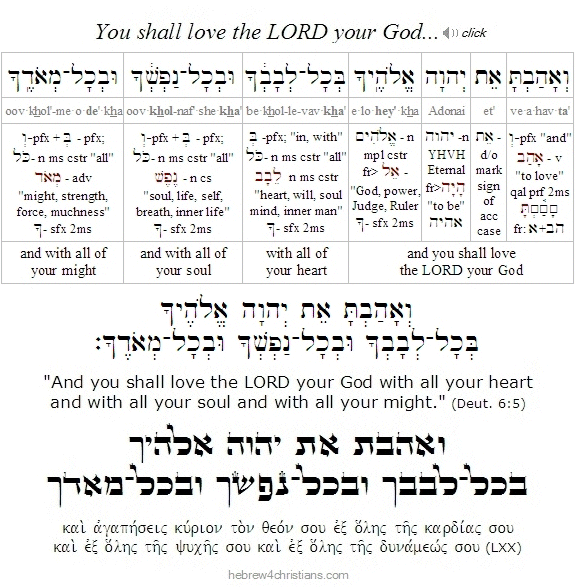 |
Parashat Re'eh:
The Blessing or the Curse...

08.25.24 (Av 21, 5784) Our Torah portion this week (i.e., parashat Re'eh) begins, "See (רְאֵה), I give before you today a blessing and a curse: the blessing (הַבְּרָכָה), if you obey the commandments of the LORD your God, which I command you today, and the curse (הַקְּלָלָה), if you turn aside from the way that I am commanding you today, to go after other gods that you have not known" (Deut. 11:26-28).
We obtain God's blessing (i.e., berakhah: בְּרָכָה) when we obey the LORD, and our decision to obey manifests the blessed state of walking before the Divine Presence (the direct object marker et (את) before the word "the blessing" alludes to the blessings of "Aleph to Tav," that is from Yeshua, as described in Lev. 26:3-13). As King David said, "I have set (שִׁוִּיתִי) the LORD always before me..." (Psalm 16:8). David made a choice to "set" the LORD before his eyes, for he understood that opening his eyes to Reality was the only path of real blessing.
On the other hand, we obtain God's curse (i.e., kelalah: קְלָלָה) when we close our eyes and "forget" that the LORD is always present.... Suppressing God's truth invariably leads to idolatry, that is, to self exaltation. Note that the root word for the word "curse" (kalal) means to be treated as of little account, and therefore "ratifies" the rebellious heart's attitude toward God. This is middah keneged middah - we are ignored by the LORD as we ignore Him, just as we seen by Him when we truly seek His face (Isa. 55:6-7).
So we see that the blessing or the curse really comes from our own inward decision, and God establishes the path we have chosen. As King David said, "God supports my lot" (Psalm 16:5), and Solomon wrote: לב אדם יחשׁב דרכו ויהוה יכין צעדו - "The heart of man plans his way, but the LORD directs his steps" (Prov. 16:9).
Click to listen and learn the Hebrew text:
Note: Some of the sages say this admonition constitutes a severe reprimand of the immaturity of the people. Forty years after receving the Torah at Sinai and the people still need to be cajoled like children with promises of rewards and threats of punishments? Those who are mature in their faith recognize good and evil for what they are: they seek the good because it is the way of truth and life. It is a sign of carnality to seek God because of the manna he provides rather than to seek him as the giver of life itself....
Haftarah Reading for Re'eh...
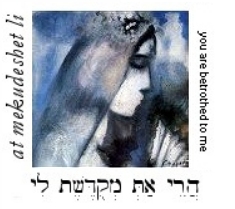
08.25.24 (Av 21, 5784) The weekly haftarah portion (i.e., reading from the Prophets) is usually thematically connected with the weekly Torah portion; however, beginning with the Fast of the Fourth month until the end of the Jewish year, the connection changes. First we always read three prophetic portions of rebuke leading up to the fast day of Tishah B'Av. Then, following Tishah B'Av, and for the next seven weeks leading up to Rosh Hashanah (i.e., the new year), we read selections of comfort that foretell of the future redemption of the Jewish people and the coming Messianic Era.
The third of the "Seven Weeks of Comfort" that lead up to Rosh Hashanah is called Aniyah so'arah (i.e., עֲנִיָּה סעֲרָה, "O afflicted and storm-tossed one," Isa. 54:11-55:5), which reminds the Jewish people of God's eternal and unconditional covenant of peace. Indeed of the Jewish people it is said, "no weapon that is fashioned against you shall succeed, and you shall refute every tongue that rises against you in judgment." Therefore the LORD invites the people to drink from the waters of life: "Incline your ear, and come to me; hear, that your soul may live; and I will make with you an everlasting covenant (בְּרִית עוֹלָם), my steadfast, sure love for David (Isa. 55:3; Luke 1:68-75; Acts 13:34). Note. however, that when this Sabbath occurs on the New Moon of Elul, Isa. 66:1-24 is read instead.
Hebrew Lesson
Isaiah 54:5 Hebrew reading (click):
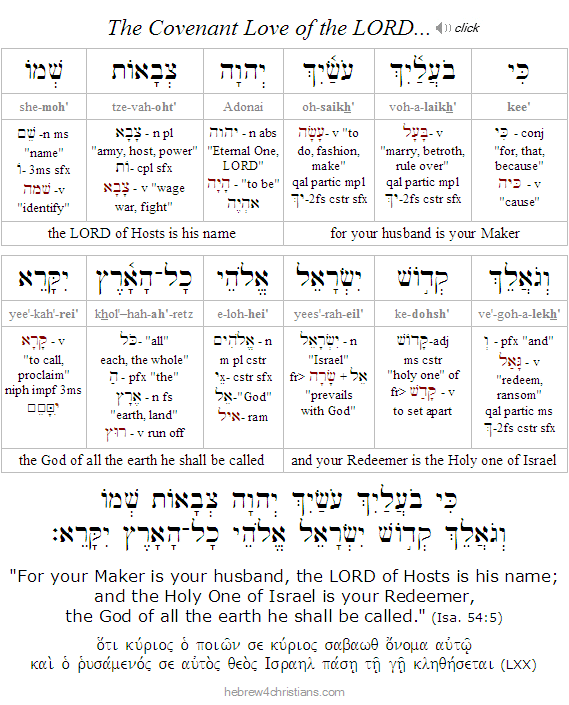 |
Deliverance from Evil...

[ "God is present in the moment of choice, not in order to watch but in order to be chosen. Therefore, each person must choose. Terrible is the battle, in a person's innermost being, between God and the world. The crowning risk involved lies in the possession of choice." - Soren Kierkegaard ]
08.23.24 (Av 19, 5784) There is the great danger of squandering and dissipating our lives... Be grateful, then, for afflictions that bring us pause and move us inward. Examine yourself; consider what really moves you. Be careful not to deceive yourself by "reasoning around the truth" (i.e., παρα + λογίζομαι), as James the Righteous puts it (James 1:22). Many people fool themselves by assuming they know or understand what is good, but they confine this ideal to a matter of opinion rather than experiencing it as a matter of the will (or they confuse their opinion of the ideal with what is real).
There is something worse than death that should concern all people, however, and that is discovering that, upon your death, you had missed what is most important, that you sold your soul for vanities, and that you never learned the true reason for your existence...
Some of the ancient Greek philosophers assumed that moral evil was the result of ignorance, and that simply knowing the good would lead to doing the good. For example Socrates states (in the Protagoras) that no one knowingly does the wrong thing, and therefore all evil is the result of ignorance. He argued this way because he assumed that doing wrong harms the soul, and since no one willingly acts against his own interests, wrongdoing must be result of ignorance. This optimistic view implies that the answer to the problem of moral evil is "education," or leading people out of the dark cave of their lower nature to experience the light of reason. If we just really understood why doing this or that sinful thing hurts us, we would change our ways and repent, or so the theory goes... Alas, human experience proves that such "head knowledge" often does not change the way we choose, and we all know people who have habits they realize are harmful but continue to indulge in them anyway.
There may be some truth to the idea that evil is a matter of ignorance however, since ignoring what is good, being indifferent, apathetic, and cynical is a defect of character (ἀκρασία), and learning to be honest, upright, courageous, unselfish, and so on, requires personal struggle to make the "ought" of moral reality an expression of the "is" of inner life. What is often most shocking about moral evil is that it expresses apathy or indifference toward the objections of conscience. Moral evil is essentially heartless and devoid of empathy, a state of cold-heartedness and callousness for the feelings and dignity of others. According to the Jewish philosopher Hannah Arendt, the lack of moral thought and reflection creates what she called the "banality of evil," that is, the unthinking acceptance of evil so that it is no longer regarded as outrageous or strange. People deaden their conscience by refusing to honestly engage questions such as: "What is goodness?" "Is evil real?" "Do we have an obligation to observe moral truth?" "What is the good life?" "How should we live?" "Do our actions really matter?" "Will God judge my life?" and so on. On the other hand, our culture has been so shocked by the ongoing practice of lawlessness wickedness that people have lost their sense of shame. We are no longer shocked and outraged when we hear of the latest crimes or abuses of power in our postmodern world.... We must be careful, however, not to become evil by despising what is evil. For instance, we may feel so outraged and threatened by the evil actions of others that we deny their humanity, thereby becoming the very thing we hate.
"The heart is deceitful above all things and desperately sick; who can understand it?" (Jer. 17:9). "Oh there is nothing as deceitful and as cunning as a human heart, resourceful in seeking escapes and finding excuses; and there surely is nothing as difficult and as rare as genuine honesty before God." (Kierkegaard: Discourses). Therefore we pray: "Heal me, O LORD, and I shall be healed; save me, and I shall be saved. Be not a terror to me; you are my refuge in the day of evil" (Jer. 17:14, 17).
Hebrew Lesson
Jeremiah 17:14 reading (click):
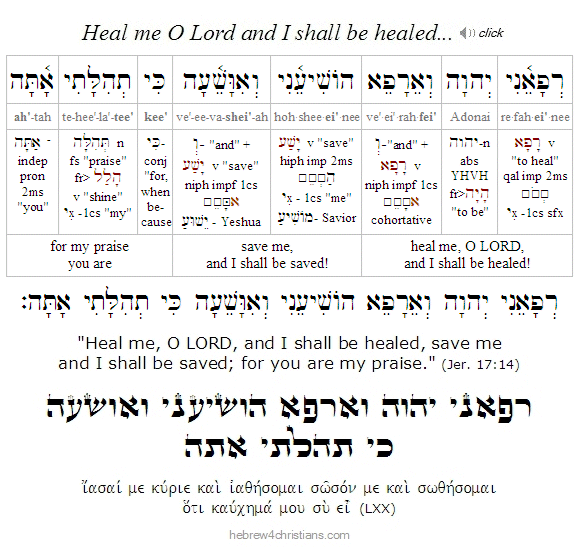 |
Wounds of Loneliness...
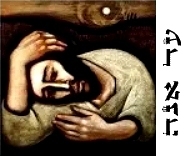
[ "Any time you are with anyone or think of anyone you must say to yourself: I am dying and this person too is dying, attempting to experience the truth of the words you are saying." - de Mello ]
08.22.24 (Av 18, 5784) The late Henri Nouwen once said that there are two great fears (or wounds) that we all face. The first is the fear that we were not wanted at the time of our birth into this world, and the second is that we will not be wanted at the time of our death. "Not being welcome is your greatest fear. It connects with your birth fear, your fear of not being welcome in this life, and your death fear, your fear of not being welcome in the life after this. It is the deep-seated fear that it would have been better if you had not lived" (Inner Voice of Love). If you carry a wound of abandonment within your heart - if you live in dread over your worth as a human being, seriously wondering whether it would have been better had you never been born, then you know the taste of hell itself - the emotional prison of feeling lost, defective, rejected, shameful - unable to love or to be loved...
Is not the lament of the lonely heart to find a sense of welcome, or acceptance, or peace within? Is it not the heart's cry for connection? Yet even the very gospel message cannot make traction within a heart lost to its own shame... Therefore the miracle of salvation is profoundly connected with faith that you are loved and lovable - despite yourself - and that this love derives from the core of all that truly exists. Is this not "home" in the spiritual sense? Is this not "Zion, the perfection of holiness?" That God prepares a table for you in the presence of your enemies, yea, those enemies of self-rejection, abandonment, fear, and shame? And that there - in the midst of your lost and forlorn condition you are found, treasured, and celebrated? Is not that "place" God's very heart - Jesus dying upon the cross, gasping for each breath - knowing everything about you and loving you anyway?
In our Torah reading this week (Eikev), Moses asks us to "soften our hearts" by remembering that we are beloved of God (Deut. 10:12-16). He reminds us that the though Lord is "the God of gods" (אֱלהֵי הָאֱלהִים) - the power that transcends the gods of our idolatry (i.e., our fears, our disordered attachments, our shame), and the "Lord of lords" (אֲדנֵי הָאֲדנִים) - the Center and Authority of what is most real, he nevertheless cares for the lowly orphan and the grieving widow - he reaches out to the needy and the abandoned - and he desires to console the "stranger," the one shattered of heart, who has no sense of belonging, no pride of tribe, nor place to lay his head (see Deut. 10:17-18). God cares about those who are lost, hurting, and alone: He came to save all such from their despair.
But how does God reach the bound soul that walks alone among the tombs, cutting himself in his torment (Matt. 8:28-34)? How can he heal the deep trauma, the disassociated and broken of heart? How else but by the miracle of his intervention, quickening an otherwise numb and dead heart to come alive, to breathe in hope, and to begin to believe that - despite everything that has happened - he was wanted all along, from the very beginning, and that the wound of his sorrow was given so that he could find out who he really is and where he really belongs... The wound you were given is part of your story, and healing comes from accepting God's love for you -- and understanding how the Lord goes through the wound with you and for you...
Life in this fallen world is likened to a vapor or a passing shadow (Psalm 144:4). Nothing abides; good things here never last; and we labor under the unmentionable anxiety that death will separate us from everyone and everything we love. However, death is not the end for the us, for "love is stronger than death, passion fiercer than the grave; its flashes are flashes of fire, the very flame of the LORD" (Song 8:6). We will live for He lives...
"What will death be like?" they asked the Master. "It will be as if a veil is ripped apart and you will say in wonder, "So it was you all along!" (De Mello). Death is a most poignant homecoming, a place of joyful welcome, wherein all shall be well for ever. The righteous have an everlasting foundation in the faithful heart of God. Faith in the LORD believes that a single supreme, all-knowing, all-powerful and benevolent spiritual Power directs all things, and that Messiah is the beginning, middle, and end of all conscious meaning, truth, and substance, as it is written: כִּי הַכּל מִיָּדוֹ הַכּל בּוֹ וְהַכּל לוֹ הוּא, "For from him and through him and to him are all things" (Rom. 11:36). A life of faith in the one true God imparts the blessing of shalom (inner peace) and assures the heart that all shall be made well by the love of God. So then, "if we live, we live to the Lord, and if we die, we die to the Lord. So then, whether we live or whether we die, we belong to the Lord" (Rom. 14:8). For the believer in Messiah, death does not define us, and indeed, we trust that God will attend to us in the moment of our utmost extremity (John 5:24; 11:25-26). If we desire eternal life with all our hearts and remember our end before the Lord, we will be free of the fear of death. Amen ve'amen.
Hebrew Lesson
Psalm 147:3 reading (click):
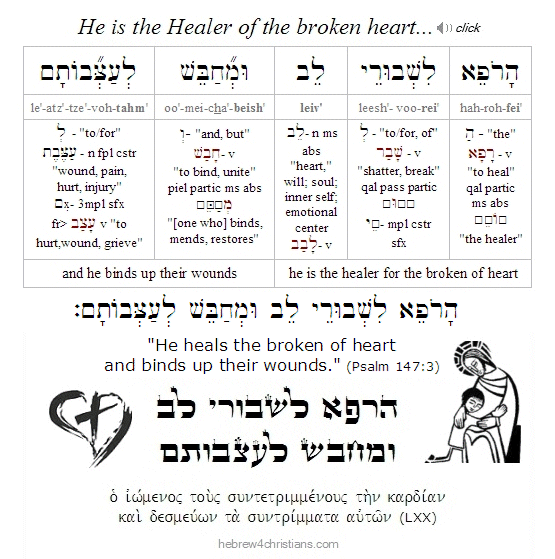 |
Rage and Idolatry...
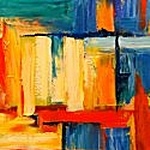
[ The following is related to our Torah reading for this week, parashat Eikev.... ]
08.22.24 (Av 18, 5784) We are warned not to destroy ourselves by allowing bitterness, anger, or fear to consume our hearts (Eph. 4:31). In our Torah this week (Eikev) we read: "And you shall not bring an abominable thing (תּוֹעֵבָה) into your house and become devoted to destruction like it" (Deut. 7:26). The sages of the Mishnah said that yielding to rage is equivalent to idol worship and should never be brought into the home. Indeed, rage is linked with avodah zarah - idolatry - because it exalts the ego and claims that the Lord can't (or won't) help you in your moment of testing or need.
Contrary to the imperious inner voice of rage, the Scriptures declare that "there is no test given to you that you cannot escape with God's help" (1 Cor. 10:13), and we are therefore invited to come boldly before the Divine Presence to find just such help in the time of our need (Heb. 4:16). Believing that you can't overcome your fear or anger problem is therefore a form of idolatry since it assumes you are enslaved to a destructive power greater than yourself to whom you give allegiance by obeying its impulses.
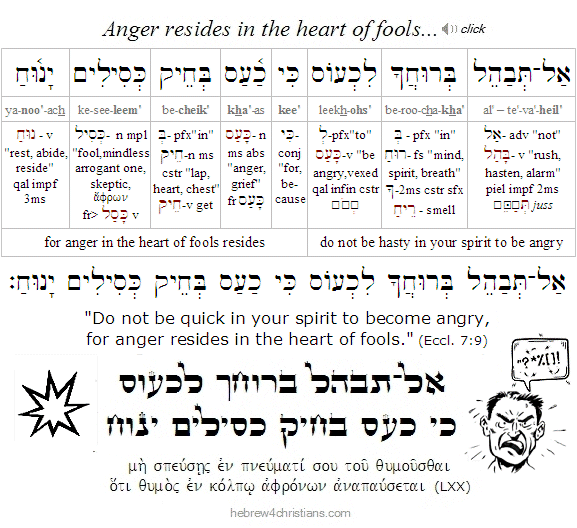 |
It is written in our Scriptures: Lo yiheyeh vekha el zar (לא־יִהְיֶה בְךָ אֵל זָר) -- "there shall be no foreign god within you" (Psalm 81:9), which means that we must expressly deny the ego's demand to have its will be done. Being full of a sense of self-importance (or powerlessness) is to be ensnared by vanity and to have a foreign god "within you." And as Nietzsche once quipped, "Whoever fights monsters should see to it that in the process he does not become a monster," well-meaning zealots who get frustrated over the hardness of other people's hearts may themselves become irate inquisitors and executioners. The "good fight of faith" is good, meaning that it is noble, full of expectation, and submitted to God's direction. We are called to follow peace with all men and Holies without which no one will see the Lord (Heb. 12:14). The "good fight" is honest inner wrestling, "putting off" the old nature and mortifying the flesh; it is the decision to pursue God's will and to resist temptations that pull the heart away from God.
Abraham Heschel once said: "In a controversy, the instant we feel anger, we have already ceased striving for truth and have begun striving for ourselves." God and human arrogance cannot coexist, since the inner world of the arrogant person denies God's rightful place as the true King over our lives. As it is written in our Scriptures: "The wrath of man (קֶצֶף אָדָם) does not work the righteousness of God" (James 1:20).
The Lord will indeed help us if we ask according to his will, and being free of rage is according to his will (Eph. 4:31; 1 John 5:14-15). Therefore let us pray: "Search me, O God, and know my heart, try me, and know my thoughts; and see if there be any wicked way (i.e., עֹצֶב בִּי, "idolatrous way") in me, and lead me in the way everlasting" (Psalm 139:23-24). Amen.
Hebrew Lesson
Psalm 89:9 reading (click)
Connection with God...

[ "Where do we begin? Begin with the heart." - Julian of Norwich ]
08.22.24 (Av 18, 5784) Shalom chaverim. From our Torah portion this week (i.e., parashat Eikev) we read: "And now, Israel, what does the LORD your God require of you, but to fear the LORD your God, to walk in all his ways, to love him, to serve the LORD your God with all your heart and with all your soul, and to keep the commandments and statutes of the LORD, which I am commanding you today for your good?" (Deut. 10:12-13).
Ultimately we must make the choice whether we will respect life or not, since that is the question set before us... In this present world, God "hides" so that people may seek him (Isa. 45:15; Matt. 13:10-15). The voice of conscience may be suppressed and the revelation of nature ignored; moreover, some things are perceived only if they are looked for in the right way, for instance, the Divine Presence is not apprehended apart from humility and reverence. We must "make room" for wonder; we must open the "eye of the heart" to see what is greater than our everyday vision. "It is good to look at the sky often, as this helps develop the awe of God." Indeed the word for fear, yirah (יִרְאָה), is connected with the word for seeing, ra'ah (רָאָה). When we really see life as it is, we will be filled with wonder over the glory of it all. Every bush will be aflame with the Presence of God and the ground we walk upon shall suddenly be perceived as holy (Exod. 3:2-5). Nothing will seem small, trivial, or insignificant. In this sense, "fear and trembling" (φόβοv καὶ τρόμοv) before the LORD is a description of the inner awareness of the sanctity and eternal significance of life itself (Psalm 2:11, Phil. 2:12).
Connecting with God is paradoxical. We find verses that teach both the fear of the Lord (i.e., his majesty and transcendence), and others that teach the love of the Lord (i.e., his kindness and immanence). We are drawn to God in adoration, appreciation, wonder, and love, and yet we are compelled to shrink back because of His overwhelming power, glory, holiness, and radiance. Therefore we see "the disciple whom Jesus loved" both leaning on his chest but also falling on his face in "dreadful adoration" (John 13:23; Rev. 1:17). Only when these heart attitudes are combined is the heart balanced. But the fear of the Lord is primary (see Psalm 111:10; Prov. 1:7, 9:10), and when we walk in it, we are released from the common fears of men by apprehending a far surpassing power that overrules all things. Again, it is a paradox: if we fear lesser things we lose sight of the awe of God; but if we first revere God, we will lose sight of lesser fears.
In Jewish tradition, seeing the Presence of God in all things is called yirat ha-rommemnut (יִרְאַת הָרוֹמְמוּת), or the "Awe of the Exalted." We might get a sense of this reverential awe when we behold the canopy of stars in the night sky, or when we look down from atop a mountain peak, or when we catch site of a spectacular sunset. Or we might experience it during the birth of a baby or the death of a loved one... This sense of awe or "transcendent mystery" is also called yirat Adonai (יִרְאַת יְהוָה), the "fear of the Name." It presents a holy hush, a feeling that you are standing before something utterly wonderful, sacred, set apart, mysterious, and profoundly significant; it both attracts yet causes you to tremble...
Hebrew Lesson
Deuteronomy 8:6 reading (click):
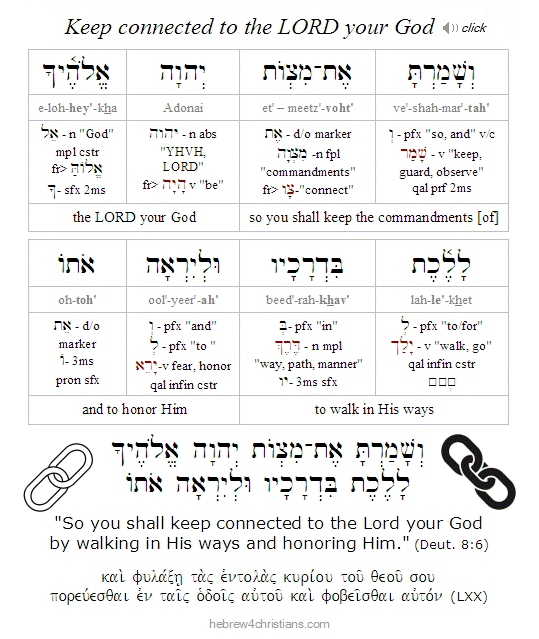 |
The Good Fight of Faith...
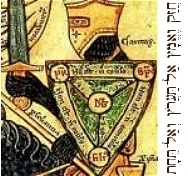
[ "You would never have believed your own weakness had you not needed to pass through trials. And you would never have known God's strength had His strength not been needed to carry you through." - Charles Spurgeon ]
08.21.24 (Av 17, 5784) Rashi states that the original "wooden ark" (אֲרוֹן עֵץ) mentioned in this week's Torah portion (see Deut. 10:1) was made by Moses and ater was used in Israel's wars. At the outset of a battle, the kohanim (priests) would accompany this "war ark" ahead of the army while the Levites would blast shofars and sing praises to the LORD.
The midrash states that the wooden war ark was used to hold the tablets that were shattered after the sin of the Golden Calf, whereas the second ark, that which was made by Betzalel, was used to hold the unbroken tablets in the Holy of Holies of the Tabernacle (Exod. 37:1). Perhaps the purpose of bringing the broken tablets to the battle was to remind us that even as we battle against evil, we must do so in humility, conscious of our own inner brokenness, and relying solely upon God's power for the victory (2 Cor. 12:9-10).
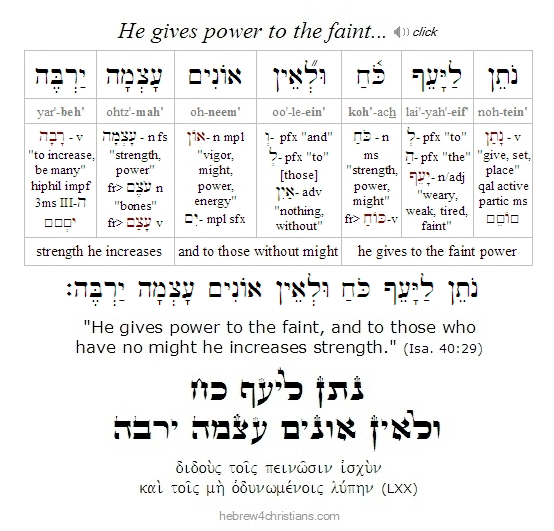 |
Blessing of the Broken...
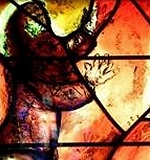
[ "We can't heal if we can't grieve; we can't forgive if we can't grieve. We run from grief because loss scares us, yet our hearts reach toward grief because the broken parts want to mend." - C.S. Lewis ]
08.21.24 (Av 17, 5784) Rabbi Simcha Bunim of Peshischa once asked, "Is it not a virtue to be humble and brokenhearted, as it is written, 'God is close to the brokenhearted (קָרוֹב יְהוָה לְנִשְׁבְּרֵי־לֵב) and saves the crushed in spirit' (Psalm 34:18)? Why then should he heal the broken heart and thereby remove this blessing?"
There is a distinction between begin brokenhearted (שְׁבוּר לֵב) and being sad (עָצוּב). There is sorrow according to God's will (צַעַר לְפִי רְצוֹן יהוה) that leads to the healing of repentance, but the sadness of the world (עַצְּבַת הָעוֹלָם) leads to death (2 Cor. 7:10). In our brokenness we understand our great need for God's salvation: "Though the troubles of the righteous be many, the LORD will save them from them all" (Psalm 34:19).
Brokenness is an awareness that our lives are being purified (מְטוּהָר) - there is much that needs to be sanctified - and from this humility we draw close to God (Isa. 57:15). This is different than the worldly sadness and grief because these feelings lead to despair and hopelessness, something antithetical to the truth of salvation (Psalm 13:5). The merciful Lord heals the broken heart by transforming its sadness into the intimacy of hope only found by relying on him. Amen.
Hebrew Lesson
Psalm 13:5 reading (click for audio):
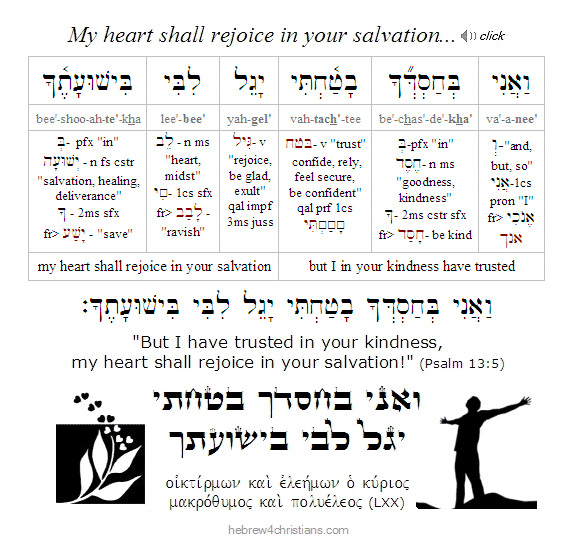 |
Healing your Heart...

[ "Love believes all things," for to believe all things means precisely, even though love is not apparent, even though the opposite is seen, to presuppose that love is nevertheless present fundamentally, even in the misguided, even in the corrupt, even in the hateful." - Kierkegaard ]
08.21.24 (Av 17, 5784) Our Torah reading for this week (i.e., Eikev) appeals for us to let go of our hurt and anger: "Circumcise (i.e., cut away) the barriers to your heart, and be no longer unresponsive to love" (Deut. 10:16). The metaphor of a "circumcised heart" (ברית מילה של הלב) symbolizes cutting away the outer covering of the heart so that it is "opened up" and softened to feel once again. God wants us to let go of "hard feelings" so we can experience compassion (i.e., com+passion: "feeling-with") and sympathy for other people... Heart circumcision represents a radical turning away from the insular realm of the self toward the emotional realm of others and God. When our hearts are open, we are able to receive the flow of the Spirit of God and obey the "law of the Messiah" (תּוֹרַת הַמָּשִׁיחַ) to bear one another's burdens (Gal. 6:2).
וּמַלְתֶּם אֵת עָרְלַת לְבַבְכֶם
וְעָרְפְּכֶם לא תַקְשׁוּ עוֹד
oo·mal·tem · et · ohr·lat · le·vav·khem
ve·ohr·pe·khem · loh · tak·shoo · ohd

"Cut away the barriers to your heart,
and be no longer unresponsive to love."
(Deut. 10:16)

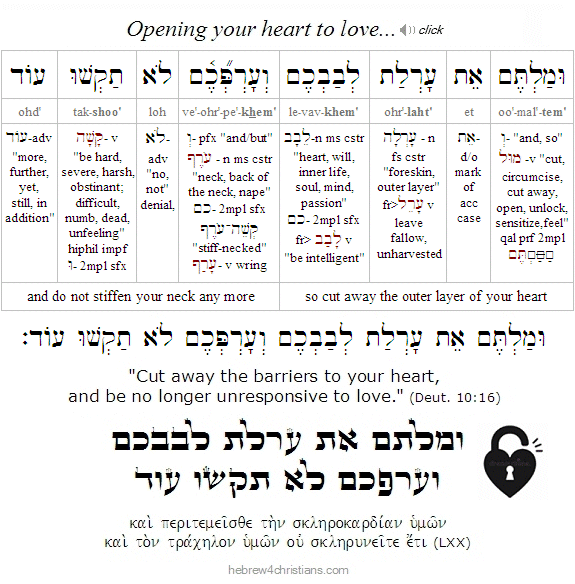
Physical circumcision represents a sign or mark of inclusion; it is a token that you are one of God's family, a Jew, though it is only a sign or token. Spiritual circumcision is an inner operation of the heart that marks you a true child of heaven. It is about your identity and purpose. Therefore we see the paradox that some physical Jews are not spiritual Jews, and some spiritual Jews are not physical Jews (though some are both), as the Apostle Paul said: For no one is a Jew who is merely one outwardly, nor is circumcision outward and physical. But a Jew is one inwardly, and circumcision is a matter of the heart, by the Spirit (ἐν πνεύματι), not by the letter. His praise is not from man but from God (Rom. 2:28-29).
Metaphorically speaking, a heart that is insensitive, indifferent, unfeeling, and callous toward the needs of others is "hard" or "uncircumcised." Often such hardness comes as a result of living in a fallen world. Many wounded people live with "scar tissue" that surrounds their heart, making them feel numb and unwilling to open up and trust others. Their affections have become disordered and they rationalize blaming others or seeking various forms of entitlement. "Turning off your heart" can mean suppressing any positive regard for others (empathy) while nurturing anger and self-righteousness, or it may mean withdrawing from others as a lifeless shell (both approaches vainly attempt to defend the heart from hurt). Although Yeshua always showed great compassion, especially to the wounded and broken in spirit (Isa. 42:3), He regularly condemned the "hardness of heart" (called "sclero-cardia," σκληροκαρδία) of those who resisted his message of healing and love.
A hard heart is closed off and impermeable to love from others, and especially from God. It is a "difficult" (קָשֶׁה) heart, inflexible and sometimes even cruel. Scripture uses various images to picture this condition, including a "heart of stone" (Ezek. 36:26, Zech. 7:12), an "uncircumcised heart" (Jer. 9:26), a "stiff neck" (Deut. 31:27), and so on. Stubbornness is really a form of idolatry, an exaltation of self-will that refuses to surrender to God. If you are wounded and afraid to open your heart in trust to others, ask God for healing...
 |
Seek First God's Kingdom...
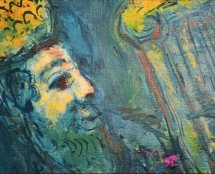
[ "Seek first the kingdom of God and his righteousness, and all these things shall be added to you... " - Yeshua (Matt. 6:33). ]
08.21.24 (Av 17, 5784) When we worry, are we not afraid that God will leave us unprotected and vulnerable? Are we not questioning his heart for us? Are we not asking, as the people of Israel once did as they thirsted in desert places: הֲיֵשׁ יְהוָה בְּקִרְבֵּנוּ אִם־אָיִן - "Is the LORD with us or not?" (Exod. 17:7). Indeed, does not the recurring presence of worry within our hearts amount to a confession of our unbelief?
The Scriptures warn us not to "spy after our heart and after our eyes" (Num. 15:39). The Torah mentions the heart first and then the eyes to indicate that the eyes follow the heart. We see as we believe with our heart: "According to your faith be it done unto you." When the spies said, "We are not able to go up (לא נוּכַל לַעֲלוֹת)... for they are stronger than us" (Num. 13:31), they revealed their unwillingness to believe in God's promise, or, to put it another way, they revealed their faith in God's inability to deliver on his word.... Indeed, the Hebrew word for "than us" (מִמֶּנּוּ) can also mean "than Him," suggesting that the spies believed that even God would be unable to uproot the Canaanites. According to their faith, so it was done; by believing that it was impossible, they lost the possibility of God's promise...
Are we truly seeking God "first" or are there other things that have a higher priority in our hearts? Do we wonder if God is to be trusted in the "desert experiences" of our lives? Do we think that God has been unfair to us? Have we sometimes lamented that our way is too hard for us, and more than we can bear? "Lord, I knew you to be a hard man, reaping where you have not sown, and gathering where you have not scattered seed" (Matt. 25:24).
It is possible to misjudge God and misinterpret our relationship with him. "We walk by faith, not by sight." This is true for all people, since every soul lives by faith of some kind or another. Our ability to know him is based on the blessing of the Spirit, not on our own merits. How can we, broken vessels, seek first the kingdom of God, apart from faith in him? Is that not presupposed in all our seeking of the heart? It is faith in God's promises, and faith that God will keep his promises to us, that is the key to seeking first God's kingdom. Those who do not seek do not believe that God is the ultimate concern of their lives.
Faith sees what is possible and refuses to yield to the artificiality of mere appearance. Indeed, appearances are often a test of our courage. We may never know how often a test was given and - just before victory was manifest - the heart grew faint and was lost to fear. "According to your faith be it done to you" is a spiritual principle that applies to everyone. In that sense, it is not that we have faith that matters (since we all do), but whether our faith is grounded in the promises and power of the LORD God of Israel, or something else....
When God told Abram to "get out of your land," he called him to focus on heavenly places – to find his identity there. "Seek ye first the kingdom of God and his righteousness" (Matt. 6:33). The "righteousness of God" is his love, mercy, glory, and goodness. Therefore King David says, אַחַת שָׁאַלְתִּי מֵאֵת־יְהוָה - "One thing have I asked of the LORD, that will I seek after: that I may dwell in the house of the LORD all the days of my life, to behold the beauty of the LORD, and to enquire before his presence" (Psalm 27:4). Likewise, followers of Yeshua no longer find their identity in this world but rather through their spiritual union with the resurrected LORD (Gal. 2:20; 6:14; Eph. 1:3; 2:6)... Therefore we are told to "seek the things that are above (τὰ ἄνω ζητεῖτε) where the Messiah is seated at the right hand of God; focus your thoughts on the things above - not on things here on earth - for you have died, and your life has been hidden (κέκρυπται) with Messiah in God. Then when the Messiah, who is your life, appears, you too will appear with him in glory" (Col. 3:1-4).
Hebrew Lesson
Psalm 16:8 reading (click for audio):
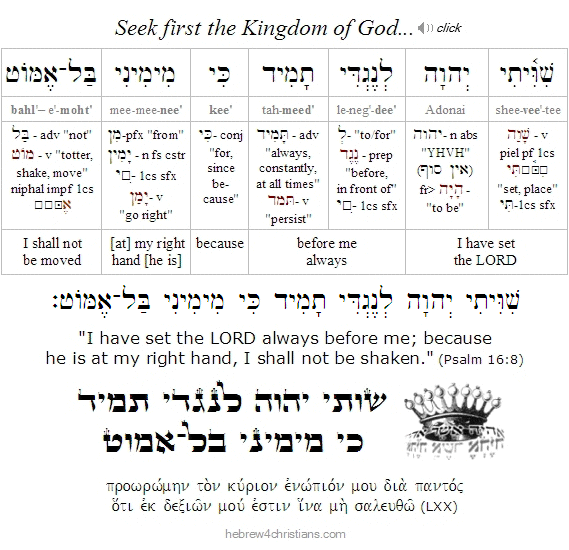 |
The Fear of the LORD...
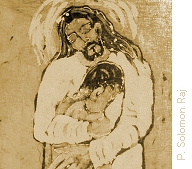
[ "Our life is a short opportunity to say 'yes' to God's love. Our death is a full coming home to that love." - Henri Nouwen ]
08.21.24 (Av 17, 5784) Some people are afraid that God will punish them for their sins, but the true fear of God, yirat shamayim (יִרְאָת שָׁמַיִם), is the tragedy of losing our closeness to Him... This is the fear of the Lord. The sages say that where it is written, "What does the LORD ask of you except to fear the LORD" (Deut. 10:12), we should read instead, "fear with the LORD" (לְיִרְאָה אֶת־יְהוָה), that is, we share his concern that we could forfeit the sanctity of a heart-relationship with Him due to carelessness and sin... We should fear our sin because it blinds us from awareness of God's care and love. The fear of God can therefore be understood as God's fear that we will miss the blessing of intimately knowing him.
The LORD has promised to never leave nor forsake us, though we can choose to turn away from his love and care for our lives... We are not permitted to fear other than that we have no fear of God, for that indeed is a fearful state of soul. May it please God to help each us never to leave nor forsake ourselves by getting lost, by forgetting what is real, and by abandoning hope in the miracle for our lives... May the LORD help us not be grieved, not to hurt ourselves, and never to abandon our hearts to the despair of shame...
Note that the fear of the LORD, or "yirat Adonai" (יִרְאַת יְהוָה), is not the fear of punishment but rather the awe of God's love and intimate concern for your life... It is "techillat chokhah" (תְּחִלַּת חָכְמָה), "the start of wisdom," imparting awareness of the sacred gift of your life, your destiny, and your true end before heaven... If there is a negative aspect to the "fear of the LORD," it may be regarded as the fear of damage to your heart and soul – that is, the fear that sin will blind you to God's passion for you...
Hebrew Lesson
Proverbs 9:10 reading (click):
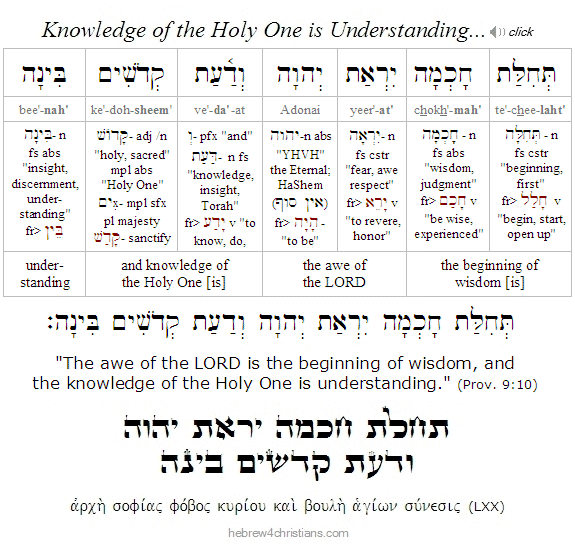 |
Now some may object that all people (including unbelievers) should fear God (i.e., because God might send them to hell), but that appeal only makes sense if we assume the person has some sort of faith - no matter how indistinct or rudimentary... But a guilty conscience does not mean spiritual rebirth, though it will be a step on the way. The doctrine of the wrath of God is an important thing to consider, to be sure, and it is profoundly connected with his holiness and righteous judgment regarding sin, but it is essentially eschatological, a reciprocal response of heaven that ratifies the individual's willing rejection of God's salvation given in Yeshua, the one who mediates God's truth and his mercy (see Psalm 85:10).
For the believer in the One who loves us so much he became the "Son of Man" to die as our substitutionary sacrifice, however, the fear of God is better expressed as reverent awe over his compassion: "That Messiah may dwell in your hearts through faith -- that you, being rooted and grounded in love, may have strength to comprehend with all the saints what is the breadth and length and height and depth, and to know the love of Messiah that surpasses knowledge, that you may be filled with all the fullness of God" (Eph. 3:17-19). Amen. "Work out your own salvation with fear and trembling, lor it is God who works in you both to will and to do of his good pleasure" (Phil. 2:11-12).
 |
Daily Dvar Podcast:
Fear of the LORD...

08.21.24 (Av 17, 5784) "The fear of the LORD is the first principle of knowledge, but fools despise wisdom and correction" (Prov. 1:7). In this "Daily Dvar" broadcast (see link below) I discuss how reverence or respect is axiomatic for a genuinely good life. Fearing God expresses the confidence that life is a sacred trust and that each soul is answerable to the Creator. Such godly reverence infers that nothing is trivial or inconsequential, and that all things will be accounted before the bar of divine truth. I hope you will find it helpful, friends.
Grappling with Grace...
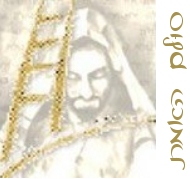
[ "Every now and again, our Lord lets us see what we would be like if it were not for Himself; it is a justification of what He said - "Without Me you can do nothing." That is why the bedrock of Christianity is personal, passionate devotion to the Lord." - Oswald Chambers ]
08.20.24 (Av 16, 5784) Some people think that "religious observance" is the way of salvation. Whether it's through the practice of a set of prescribed rituals, confessing to a particular creed, or becoming a member of a particular religious "in-group," such people have trouble accepting the idea that God's mercy may be given to those who -- unlike themselves -- haven't "worked for it" and therefore don't really deserve it... They apparently have yet to discover the shocking and tragic truth of their own radical need for healing and therefore they may be scandalized by the idea of God's unconditional love and acceptance. Perhaps they subconsciously believe that love must be earned and therefore they are careful to disguise the truth about who they really are (especially from themselves). They may hide behind ideologies, theologies, ritual acts, church affiliation or attendance, labels, pretenses, excuses, etc. -- all with the aim of being hidden within the crowd -- but they dare not view themselves as individuals who stand entirely dependent upon God alone for help... No, that is too terrifying, because the various self-made props given to shore up one's identity are rendered ineffectual and void before the Holy One.... All our attempts at self-justification invariably create ongoing anxiety within the soul.
I sometimes wonder about people who are obsessed over technical questions regarding "Torah observance" (i.e., dietary law, Sabbath Observance, ritual practices, etc.) Often they seem to be sincere, upright, and zealous for God, but when they're questioned about the ground of their acceptance in light of the Cross of Yeshua, it's often surprising how their lip service regarding the grace of God quickly reverts to talk about God's conditional love and acceptance. They imply, therefore, that the work of the Messiah somehow isn't enough (God forbid) and therefore "salvation" needs to be "completed" or "perfected" through human agency of some kind. Inwardly they think, "Salvation is a gift, yes, but sanctification is our job..." If hard pressed on the question, the self-justifying soul will either resound thunder from Sinai or else will reframe the question in terms of our personal responsibility as the determiner of salvation.
Whenever the question of moral obedience comes up (as it invariably does in these discussions), it is helpful to recall the first and most basic commandment of all, i.e., the commandment to love the LORD with all our heart, soul, mind and strength. THAT is the starting point. Indeed, the very first of the Ten Commandments is אָנכִי יְהוָה אֱלהֶיךָ - Anochi Adonai Eloheykha: "I AM the Lord your God." Without this personal acceptance of the LORD as our God (i.e., our willingness to trust and to love Him), we simply cannot fulfill any of the commandments with the right inward intent. It is because of the LORD's kindness that we are saved (Lam. 3:22). God loves us - despite our sinful state - yet that gloriously liberating truth often offends those who labor under the illusion that they can find favor before the LORD God of Israel through self-effort. Surrendering to God's love is a humbling venture...
 |
The Hebrew word eikev (עֵקֶב), the name of our Torah portion this week, comes from the root akav (עָקַב, to "take by the heel"), as does the name Ya'akov (יַעֲקב, Jacob), who had "grabbed the heel" of his twin brother Esau while still in the womb of Rebekah. Ya'akov was later renamed Israel in commemoration of his grappling with Malakh Adonai (the Angel of YHVH) at Peniel. The Lord then declared to him, "Your name shall no longer be Ya'akov ("grappler") but Yisrael (יִשְׂרָאֵל), for as a prince (שַׂר, sar) you have striven (שָׂרִיתָ, sarita) with God and with men and have prevailed" (Gen. 32:28). The first occurrence of the root word appears in Genesis 3:15, where the LORD prophesied that although the Redeemer's heel (עָקֵב, akev) would be bruised, the very head (ראשׁ, rosh) of the serpent (satan) would be crushed.
Indeed, directly after the Akedah (the sacrifice of Isaac), the LORD said to Abraham, "in your offspring shall all the nations of the earth be blessed because (עֵקֶב) you have obeyed my voice" (Gen. 22:18). God blessed Abraham and his descendants because he grappled with the Voice of the LORD (YHVH). The great test of the Akedah centered on whether Abraham would accept the unconditional compassion of the LORD or if he would be tempted into seeking self-justification before God as Elohim (i.e, Judge). Ironically enough, Abraham's test was whether he would be "religious" or whether he would heed the compassionate intervention of the LORD... When the White Ram was caught in the thicket and sacrificed in Isaac's place, there was nothing left for Abraham to do other than accept God's gracious gift of love. Surrendering to God's love is the only genuine obedience, after all. "This is the work of God, that you believe in the one God has sent" (John 6:29).
Followers of Messiah are called to do works of healing and righteousness, as it is written: "For we are his workmanship, created in Yeshua the Messiah for good works that God purposed beforehand that we should do" (Eph. 2:10). The sages teach that we shouldn't put off performing acts of righteousness (e.g., tzedakah, visiting the sick, studying Torah, etc.) by thinking we can always do them at a later time; on the contrary, we should always regard the first opportunity presented to us as the only opportunity we might ever get. This is what is meant by the phrase "that I command you this day" (אֲשֶׁר אָנכִי מְצַוֶּה אֶתְכֶם הַיּוֹם). We should never trade a present opportunity for God's perfect will in our lives for a lesser good.... "Repent one day before you die..."
The call to love God with all our heart and soul might seem overwhelming, though we can heed the sages' advice, "It is not incumbent upon you to finish the task; yet you are not free to cease from it" (Avot 2:16). Though the Scriptures list a lot of commandments, all of these can be distilled to the all-encompassing principle of walking in love / לָלֶכֶת בְּאַהֲבָה (Eph. 5:2). "For in the Messiah Yeshua neither circumcision nor uncircumcision counts for anything, but only faith working through love" (Gal. 5:6). We can concentrate on heeding the immediate need of the hour. Walking in light of God's love - while not neglecting the "weightier matters" of the Torah: justice and mercy and faithfulness - ought to be the rule of faith in which we live (Matt. 23:23). This agrees with the New Testament's repeated focus that "love is the fulfillment of the Torah" / הָאַהֲבָה הִיא קִיּוּם הַתּוֹרָה (Rom. 13:10).
If you are sensing a tension while reading this, you are perhaps grappling with the idea of God's grace... May God give us a renewed revelation of His love for us.
Believing in Love...

[ "The courage to be is the courage to accept oneself in spite of being unacceptable." - Tillich ]
08.19.24 (Av 15, 5784) In our Torah portion for this week (i.e., parashat Eikev) we read: "But now, Israel, what does the LORD your God ask from you ... but to love him with all your heart and with all your soul?" (Deut. 10:12). But how are we able to love God be'khol levavka (בְּכָל־לְבָבְךָ) – "with all our heart" – and be'khol nafshekha (וּבְכָל־נַפְשֶׁךָ) - "with all our soul," apart from healing of the brokenness that makes our hearts divided and sick? That is what the redemption from Egypt was about: we were personally chosen by God, redeemed by his grace, led out from from cruel bondage, only to be led into the desert, away from the world, where we slowly began to understand that we were valued, cared for, and beloved of God. We believed in the possibility of promise, of covenant... Only then could we hear the request from heaven: "Now love Me..." In other words, we can only truly love God by knowing we are beloved by God, and the invitation to love him is a response of his great passion for you (1 John 4:19). Accept that you are accepted in the heart of the Beloved (Eph. 1:4-6).
What the LORD asks from us is humanly impossible, since the human heart is unable to truly love and serve the LORD apart from intervening grace (Eph. 2:1-10). The real miracle of faith is found in a transformed heart. It is never a question of "will power" or the "zeal" of man; no - it is never a question of what I can do but rather what God can do (John 1:13).
We love because He loves us (and we receive and accept that love). It is the strength of his love that keeps you, not the strength of your own... Nevertheless it seems to be the pattern of God's grace to bring affliction and trouble into our lives so that we will begin to seek the Presence of God (i.e., the "troubles of love"). We all are delivered from Egypt by the blood (i.e., the love) of God in the tribulation of hard exile. After all, how many of us came to know the LORD apart from the pain that comes from apprehending our own slavery to inner brokenness? Indeed it is a "severe mercy." Therefore our Savior says: "Truly, truly, I say to you, unless a grain of wheat falls into the earth and dies, it remains alone; but if it dies, it bears much fruit" (John 12:24). The hard "outer shell" of the seed must be broken so that the life of the Spirit can come through... The commandment to love the LORD, then, only finds its voice after we come to faith, after we experience the Holy Spirit's power, indeed, after we are made alive from the dead.
Hebrew Lesson
Deuteronomy 10:12 reading (click for audio):
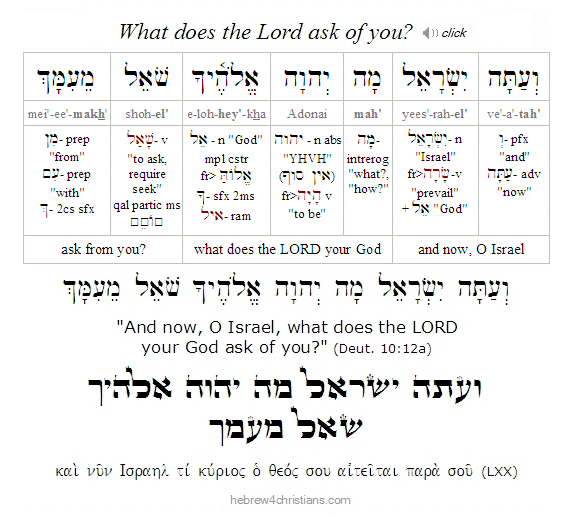 |
Prophetic Listening...
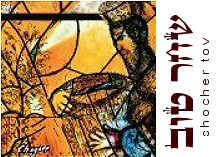
08.19.24 (Av 15, 5784) Shavuah tov and chag sameach, chaverim. A passage from our Torah portion this week (i.e., parashat Eikev) implies that as we obey God so we will grow in our knowledge and love of Him, a sort of reciprocity between the heart and the head.
The passage in question reads: "And it shall come to pass if you diligently hear the commandments that I command you today, to love the LORD your God, and to serve him with all your heart and with all your soul, then he will give the rain for your land in its season, the early rain and the later rain, that you may gather in your grain and your wine and your oil" (Deut. 11:13-14). Now what is interesting here is not some sort of karmic "cause and effect" between keeping the commandments and obtaining material favor but rather the effect that comes from truly listening to God, that is, the awakening of heart, coming to know the truth, and the blessing of walking before the divine presence.
We can see this when we take a closer look at the first part of the passage, which reads: "and it shall come to pass if you diligently hear," but in Hebrew reads, "ve'hayah im shamo'a tishme'u" (וְהָיָה אִם־שָׁמעַ תִּשְׁמְעוּ), meaning "if you hear, you will hear," and which prophetically suggests that as we listen attentively to the words of Torah, we will hear more, and we will encounter spiritual connections and applications that are new and ready for this hour. The early sages commented: "If you listen to the old, you will listen to the new" (Berachot 40a). This recalls Yeshua's words: "every scribe who has been trained for the kingdom of heaven is like a master of a house, who brings out of his treasure what is new and what is old" (Matt. 13:53).
In this connection notice that the commandment to "love the LORD your God with all your being" (i.e, וְאָהַבְתָּ אֵת יְהוָה אֱלֹהֶיךָ בְּכָל־לְבָבְךָ, see Deut. 6:5) must first be grounded in the fear of the LORD (יִרְאַת יְהוָה), since without conscious reverence for the greatness of God we will likely make God in our own image and likeness, and therefore we will confound God's will to be about our own "felt needs" rather than the truth of God's love. "It is a fearful thing to fall into the hands of the Living God" (Heb. 10:31), and therefore we "work out" salvation with "fear and trembling" (Phil 2:12). The fear of the Lord awakens us to the "weight of glory" and the enormity of the significance of knowing the truth about reality...
Focusing our attention on the commandments may be likened to practice for the world to come, since then they will not be new to us when the final redemption appears. As it is written: "The statutes of the LORD are right, rejoicing the heart: the commandment of the LORD is pure, enlightening the eyes" (Psalm 19:8). Happy are those who love the Torah. More light comes as we live in (i.e., practice) the truth (John 13:17). As Yeshua also said: "For to the one who has, more will be given, and he will have an abundance, but from the one who has not, even what he has will be taken away" (Matt. 13:12). Amen.
Hebrew Lesson
Deut. 11:13a commentary (click):
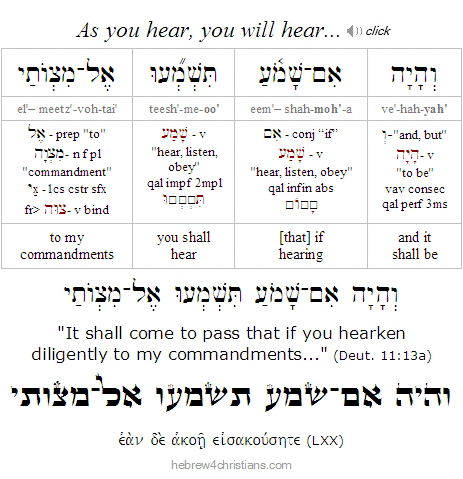 |
God's Everlasting Love...
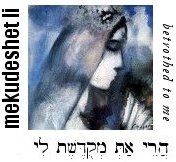
[ The prophetic holiday Tu B'Av of begins this evening at sundown, chaverim.... ]
08.18.24 (Av 14, 5784) Tu B'Av, or the 15th day of the month of Av, is a date associated with love and joy in Jewish tradition. Just as Yom Kippur originally celebrated the reconciliation of Israel to the LORD after the sin of the Golden Calf, so Tu B'Av originally celebrated the reconciliation of Israel for the Sin of the Spies. Therefore both the fifteenth of Av and Yom Kippur became joyous times celebrating loving restoration to the LORD. The Babylonian Talmud (Ta'anit 31a) states "Israel had no holidays as joyous as the fifteenth of Av and the Day of Atonement, when the maidens of Israel would go out and dance in the vineyards..."
An old Jewish legend says that 40 days before a person is conceived in the womb, God decrees who that person's life partner will be (Talmud: Mo'ed Katan 18b). The sages calculate that Tu B'Av falls 40 days before Elul 25, the traditional date of the creation of the universe, and infer that at that time - before the foundation of the world - God "chose us to be His beloved (Eph. 1:4). At any rate, Tu B'Av reminds us of the deeper truth that you were created to be in a love relationship with God!
Hebrew Lesson
Jeremiah 31:3b reading (click):
Note that the word translated "I have drawn you" (i.e., מְשַׁכְתִּיךְ) comes from the Hebrew word mashakh (מָשַׁךְ), meaning to "seize" or "drag away" (the ancient Greek translation used the verb helko (ἕλκω) to express the same idea). As Yeshua said, "No one is able to come to me unless he is "dragged away" (ἑλκύσῃ, same word) by the Father" (John 6:44). God's chesed seizes us, takes us captive, and leads us to the Savior... Spiritual rebirth is a divine act of creation, "not of blood nor of the will of the flesh nor of the will of man, but of God" (John 1:13). God is always preeminent.
Parashat Eikev - עקב
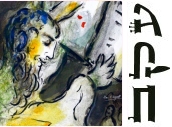
[ The Torah reading for this week is parashat Eikev, which is traditionally read during Shabbat Va'tomer, the second "Sabbath of Consolation" after Tishah B'Av.... ]
08.18.24 (Av 14, 5784) Shavuah tov, chaverim. In our Torah reading for this week (i.e., parashat Eikev), Moses continues his farewell address to Israel by saying, "And because (עֵקֶב) you will listen to these rules and keep and do them, the LORD your God will keep with you the covenant and the love that he swore to your fathers" (Deut. 7:12). Note that the word eikev (עֵקֶב), often translated "because," literally means "heel," which recalls Jacob (יעקב) the "heel-holder" who wrestled with the pain of his past to learn to bear the name Israel (יִשְׂרָאֵל), the "prince of God" (Gen. 32:28)... And like Jacob, we must grapple to believe that the covenant of God's love and acceptance is for us, too...
The Sassover rebbe interpreted the opening verse of our Torah portion, "And because you will listen..." (וְהָיָה עֵקֶב תִּשְׁמְעוּן) as, "and it shall be when your heel is ready to take a step, you will listen to your heart." This is the step of faith. As you begin to walk with God, you will come to know yourself as a child of the great King. Likewise regarding the related verse in the Torah, "Because Abraham heard my voice" (עֵקֶב אֲשֶׁר־שָׁמַע אַבְרָהָם בְּקלִי), the sages read, "Abraham heard the word 'down to his heel'" (Gen. 26:5). Like Abraham, we will hear God's voice as we walk with him by faith...
Hebrew Lesson
1 Chron. 22:19a reading (click):
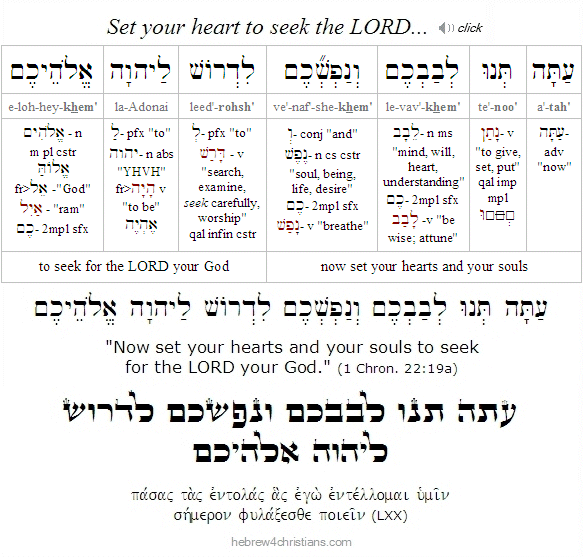 |
The portion begins: "ve'hayah eikev..." (Deut. 7:12). Here translators differ about how to understand the Hebrew. The JPS version, for instance, renders this as "and if you listen," whereas others render it as, "and because you listen..." The former translation makes the blessing seem conditional upon obedience, whereas the latter reading affirms the obedience that leads to blessing... The Hebrew word eikev (i.e., עקב, "heel," "step"), however, refers to action, and therefore it may be regarded as a prophecy expressing faith that the blessing which God swore on oath will be fulfilled. May it be so for us, chaverim...
Hebrew Lesson
Opening words of parashat Eikev (click):
Eikev Audio Podcast...

Devakut: Cleaving to God...
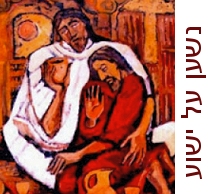
[ The following is related to parashat Vaetchanan, which is always read on the Sabbath following Tishah B'Av, called Shabbat "Nachamu", or "the Sabbath of Comfort." ]
08.16.24 (Av 12, 5784) Our Torah portion this week, which is customarily read on the Sabbath following Tishah B'Av, says: "But you who have cleaved to the LORD your God are all alive today" (Deut. 4:4). The Hebrew word translated "cleave" is davak (דָּבַק), first used in the Torah to describe how a man would leave his father and mother to cleave to his wife so they would become "besar echad" (בָשָׂר אֶחָד), or "one flesh" (Gen. 2:24). The word is also used to describe how Ruth clung to Naomi (Ruth 1:14), how David pursued enemy armies (2 Sam. 23:10), how Solomon was attached to his foreign wives (1 Kings 11:2), how Job's bones stuck to his flesh (Job 19:20), how leviathan's scales were glued together (Job 41:17), how metal was welded together (Isa. 41:7), how the LORD cleaves to Israel (Jer. 13:11), and so on. It also is the word used to describe how Yeshua's tongue was so dried out that it stuck to his jaws as he agonized upon the cross (Psalm 22:15). Incidentally, in Modern Hebrew word for "glue" is devek (דֶבֶק), which also comes from the same root...
Another word that derives from davak is the noun form devakut (דְּבָקוּת), which means "cleaving" in devotion or attachment to God. Such cleaving to the LORD can be thought of as "stick-to-itiveness" or pertinacity, though it might better be understood as a form of clinging in dependency, surrender, and heart-desperation. So understood, devakut is a form of communion with and a reliance upon God for the blessing of life...
Cleaving to God is a day-to-day, moment-by-moment trusting of the heart. As Yeshua said: "Take therefore no thought for tomorrow: for tomorrow shall take thought for the things of itself. Sufficient for the day its own trouble" (Matt. 6:34). Live one day at a time. The LORD gives us daily bread (לֶחֶם חֻקֵּנוּ) so that we may persevere for this day. "For he is our God, and we are the people of his pasture and the sheep of his hand today -- if you hear his voice" (Psalm 95:7). Today, if you hear his voice, do not harden your heart (Heb. 3:15). "Take care, brothers, lest there be in any of you an evil, unbelieving heart, leading you to fall away from the living God, but encourage one another every day, as long as it is called "today," so that none of you may be hardened by the deceitfulness of sin" (Heb. 3:12-13).
Hebrew Lesson
Deut. 4:4 Hebrew reading (click):
The Holiday of Tu B'Av...

[ The romantic holiday Tu B'Av of begins sundown on Sunday, August 18th this year... ]
08.16.24 (Av 12, 5784) Tu B'Av (ט"ו באב), an acronym for the "fifteenth [day] of [the month of] Av") is an annual holiday of love and affection (sometimes called chag ha-ahavah: חַג הָאַהֲבָה) that is celebrated as a sort of "Valentine's Day" in modern Israel (though it is a much older holiday that St. Valentine's Day). Just as Yom Kippur (the Day of Atonement) originally celebrated the reconciliation of Israel to the LORD after the sin of the Golden Calf, so Tu B'Av originally celebrated the reconciliation of Israel for the Sin of the Spies. Therefore both the fifteenth of Av and Yom Kippur became joyous times celebrating forgiveness and restoration to the LORD. Indeed, the Babylonian Talmud (Ta'anit 31a) quotes Shimon ben Gamliel as saying, "Israel had no holidays as joyous as the fifteenth of Av and the Day of Atonement, when the maidens of Israel would go out and dance in the vineyards... What were they saying: Young man, consider whom you choose to be your wife..."
Since it marks the "last" festival of the Jewish year, Tu B'Av prophetically pictures our marriage to the Lamb of God (Seh Elohim), Yeshua our beloved Messiah. On a soon-coming day those who belong to him and are faithful to follow his ways will be blessed with the unspeakable joy as their "wedding day" finally has come. This is heaven itself - to be in the Presence of the LORD and to be His beloved (Rev. 19:6-9).
With the advent of the holiday of Tu B'Av, we are reminded of the beautiful phrase, ani l'dodi ve'dodi li (אֲנִי לְדוֹדִי וְדוֹדִי לִי), "I am my beloved's, and my beloved is mine" (Song. 6:3), a phrase the sages say is an acronym for the name Elul (אלול). Since the month of Elul begins in just a couple of weeks (i.e., Friday, August 6th this year), the entire month is set apart to prepare us for the coming High Holidays in early September. During this time it we engage in cheshbon ha-nefesh ("soul searching") and to derive comfort that God is forgiving and loving to those who turn to Him. The sages chose the seven "Haftarot of comfort" to encourage us to make our hearts ready for the upcoming High Holiday Season.
Hebrew Lesson
Song 6:3 reading (click):
"To love someone means to see them as God intended them." (Fyodor Dostoyevsky)
Unto the Heart of Heaven...

08.16.24 (Av 12, 5784) In our Torah reading for this week (i.e., Vaetchanan), Moses recalled the awesome revelation of the Torah at Sinai, describing how the mountain "burned with fire unto the heart of heaven" (בּעֵר בָּאֵשׁ עַד־לֵב הַשָּׁמַיִם) when the Ten Commandments were inscribed upon the two tablets of testimony (Deut. 4:11-13). In this connection the sages say that the tablets represented a heart, as it is written: "write them on the tablet of your heart" (Prov. 3:3), and God's word is likened to a consuming fire (i.e., esh okhlah: אֵשׁ אֹכְלָה) that reveals the great passion of his heart for us (Jer. 23:29; Deut. 4:24).
Tragically, the two tablets were smashed after the people lost sight of the heart of heaven (i.e., lev ha'shamayim: לב השמים), and therefore God requires a broken heart - teshuvah - to behold his glory once again. Therefore we see that Yeshua died of a broken heart upon the cross for our return to God, when the fire of his passion burned unto the very heart of heaven, and in his self sacrifice (מסירת הנפש) we see the greater glory of God...
Hebrew Lesson
Proverbs 3:3 reading (click):
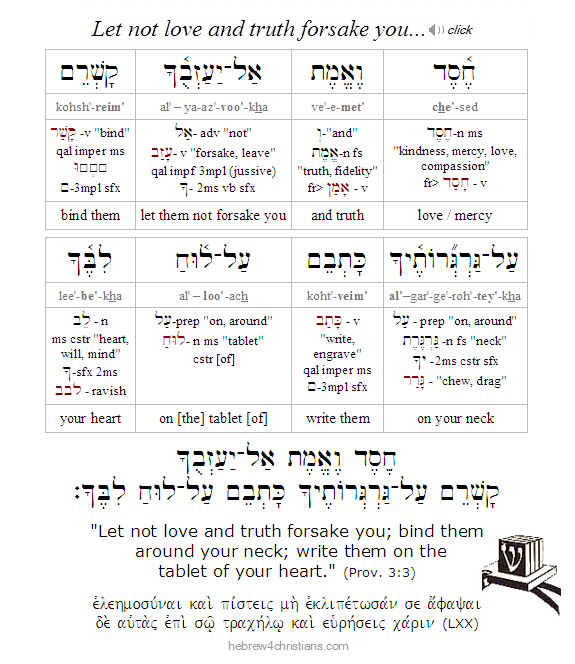 |
The Listening Heart...

[ "God, from your goodness, give me yourself; you are enough for me, and anything less that I could ask for would not do you full honor. And if I ask anything that is less, I shall always lack something, but in you alone I have everything." - Julian of Norwich ]
08.15.24 (Av 11, 5784) Being a disciple of Yeshua is to be bonded to his heart: He is our Teacher and his curriculum is the way of our lives... The danger we face is losing sight of his living truth by attending to other matters. For instance, we can substitute our heart connection with him by focusing on "lesser matters of the law" (Matt. 23:23), i.e., by being "religious," or we can fool ourselves by presuming that the law "has come to an end" in order to justify our sins (Matt. 5:17-18). Either way, however, whether we be Torah observant "legalists" or lawless "antinomialists," we disregard what Yeshua wants from us.
It is God's Spirit and truth that enable us to have an intimate heart connection with the Living God (אֱלֹהִים חַי). This connection is grounded, first of all, in the confession of our great need for God's healing and love, and secondly, in our gratitude (faith) for God's Presence in our lives. "If we walk in the light, as He is in the light, we have fellowship with one another" (1 John 1:7). It is the truth of Yeshua that sets us free, and the gift of the freedom that God gives us is to learn to walk with Him and to know him in all our ways (Prov. 3:6).
Hebrew Lesson
Prov. 3:6 Hebrew reading:
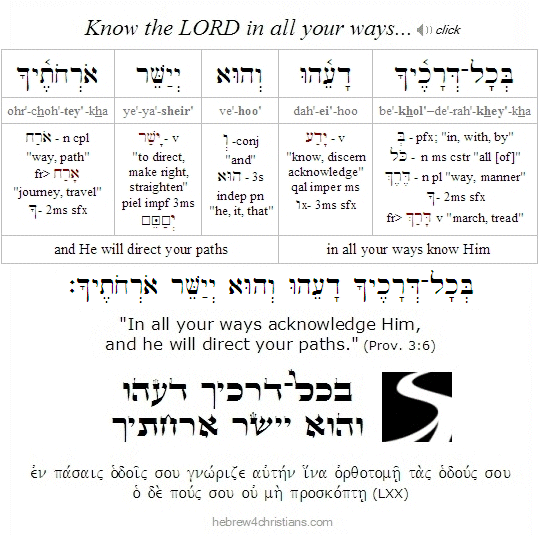 |
Praying to Pray...

[ "Attention is the very "substance of prayer": when one prays, one empties oneself, fixes one's whole gaze towards God, and becomes ready to receive God." - Simone Weil ]
08.15.24 (Av 11, 5784) Our Torah portion for this week (i.e., Vaetchanan) begins, "And I pleaded (ואתחנן) with the LORD at that time, to say..." (Deut. 3:23), which implies that we must first pray in order to be able to pray, that is, we make ourselves ready to pray by finding the inner freedom and grace to groan before the LORD.... If you can't find the words to pray, or if you seem unwilling, then plead with the LORD and ask for the Holy Spirit to groan on your behalf (Rom. 8:26). Weep in order to weep; sigh in order to sigh; praise in order to praise. "Ask, and it will be given to you; seek, and you will find; knock, and it will be opened to you" (Matt. 7:7). "O Lord, open my lips, and my mouth will show forth your praise" (Psalm 51:15).
The need to pray with the proper focus, intention, and heart is surely one of our greatest needs... "Lord, teach us to pray" (Luke 11:1). The disciples were not asking for a formula or recipe prayer (such as might be recited from a prayer book), but for the right motivation, direction, and "Torah" of prayer... If we ask according to his will, God hears us (1 John 5:14), since we are speaking heaven's "language" of truth and humility. Therefore pray for the ability to pray earnestly, to commune in trust with your heavenly Father. The prayer of a righteous person has great power (James 5:16).
אדני שׂפתי תפתח
ופי יגיד תהלתך
a-doh-nai · se·fah·tai · teef·tach
oo·fee · ya·geed · te·heel·lah·te'·kha

"O Lord, open my lips,
and my mouth will declare your praise."
(Psalm 51:15)

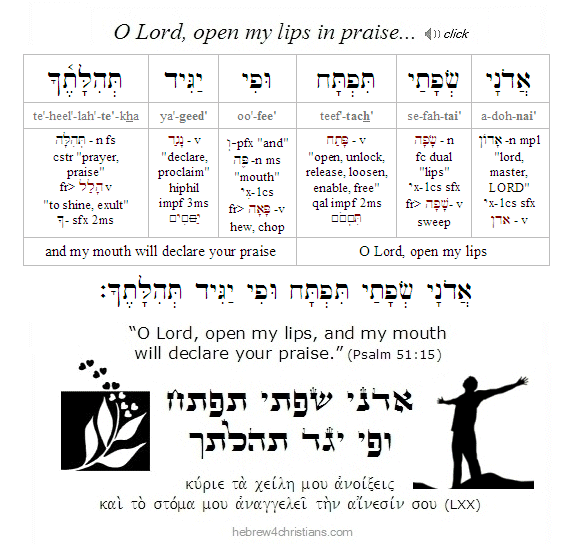
Idolatry and Paradox...

[ "The paradox is the passion of thought, and the thinker without the paradox is like the lover without passion..." - Soren Kierkegaard. ]
08.15.24 (Av 11, 5784) In a devar Torah (lesson) on parashat Vaetchanan, the late Rabbi Adin Steinsaltz summarized Moses' farewell address to Israel as an extended appeal to flee from idolatry, which raises interesting questions about what idolatry really is. Before we delve into the topic, however, let's recall the commandment against creating idols given at the Sinai revelation: "You shall have no other gods before me. You shall not make for yourself a carved image (i.e., pesel: פֶּסֶל), or any likeness (i.e., temunah: תְּמוּנָה) of anything that is in heaven above, or that is in the earth beneath, or that is in the water under the earth. You shall not bow down to them or serve them, for I, the LORD your God am a jealous God" (Exod. 20:3-4).
The French medieval commentator Rashi (1040-1105) noted that the Hebrew word "pesel," translated here as "carved image," comes from the root verb "pasal" (פָּסַל) meaning to carve or cut into shape, and therefore refers to chiseling, sculpting, or molding something into a particular figure from an earthly substance. By implication, a pesel refers to the effect of cutting, that is, a fragmentary or broken piece or outcome.... Some have said that the context of the prohibition regarding creating graven images constitutes a prohibition of use - a sober caution about how we are to relate to artwork in general... We are not to worship the creature rather than the creator (Rom. 1:25), mistaking the part for the whole, and this further implies we are not to worship the technology or skill of a particular artist.
The Hebrew word "temunah," on the other hand, translated here as "likeness," comes from the word "min" (מִין) referring to a "kind" or species, which sets apart the heavenly realm as a matter of human contrivance because Israel "saw no form when the LORD spoke at Horeb out of the midst of the fire" (Deut. 4:15). In short, the language of the Second Commandment seems to forbid making any concrete expression of the Divine Presence, a general prohibition against "finitizing" the infinite or identifying God with any aspect of creation (Psalm 145:3; 147:5; Isa. 55:8). In other words, while God sustains and upholds all things, He is is beyond all the "predications" of finite reality, and therefore we know him through a process of negation (via negativa), that is, by denying that the LORD can be categorized, identified, rationalized, explained, and so on. This is part of the meaning of the Name YHVH (יהוה) after all: the ineffable, unutterable mystery and wonder of the "in-finite" (אין סוף) divine presence (Gen. 32:29; Exod. 3:14; Judges 13:18; Isa. 9:6).
The sages say "Torah was written in the language of men," and this raises interesting questions about the significance of religious language, how theological reference works, whether it is analogical or perhaps equivocal, as well as the use of metaphors, similes, and other figures of speech used in the Scriptures. It also touches on the "anthropomorphism" of God in the Bible, language describing God's face, hands, arms, eyes, ears, and so on, as well as emotional expressions about God's anger, sorrow, pity, delight, and his great love for people.
Some Christian religious traditions have said that when Yeshua became a man at the time of the incarnation, God made himself into a finite representation and image among us, and because of this we are permitted the use of icons, hagiographic portraits, figurines and so on, as aids to worship. I think it is telling, however, that the New Testament does not describe the physical appearance of Yeshua other than in general terms, and therefore the argument that the incarnation "justifies" the use of religious icons or idols is suspect, especially if they are worshiped, venerated, or used as instruments of mediation in prayer...
Even if someone's intentions are good, however, but they believe that representing God's presence by means of symbolic forms or religious icons helps them to sense God's presence, the Torah prohibition stands, for God alone is to be venerated and he is set apart from all of creation in his holiness. The pagan world sought to "reify" or bring down to earth the realm of the gods by means of icons and incantations, but this was not the way of God's revelation to Israel given at Sinai. "You shall not bow down to them," says the LORD, for I am the LORD your God, El Kanna (אֵל קַנָּא), a "jealous God" (Exod. 20:5). The sages have concluded that the worship of anything other than God is therefore a form of perfidy and idolatry.
But what about representations of heavenly things such as the Mishkan (Tabernacle) and its furnishings? What about the "cherubim" (כְּרוּבִים) that were forged upon the kapporet (cover) of the Ark of the Covenant? "Make one cherub (כְּרוּב) at one end, and the other cherub at the other end; you shall make the cherubim at the two ends of it of one piece with the cover of the Ark" (Exod. 25:19). Was Betzalel, the artist of the Ark of the Covenant, given an exemption against the prohibition to make "any likeness of anything in heaven"? What about the images of the cherubim on the parochet (veil) before the Holy of Holies?
These same sorts of representations were also permitted later in the construction of the Holy Temple. The Ark of the Covenant and the parochet used the same designs. Moreover, King Solomon made a copper basin (הַיָּם מוּצָק) that was upheld by twelve oxen that were positioned looking out in different directions (see 1 Kings 7:23-25). Apparently God did not object to the use of graven images of oxen there, but he judged Israel when Aaron made the image of the golden calf during the time of Sinai revelation.
The LORD has manifested his presence in ways human beings could understand. These are sometimes called "theophanies." For instance, God spoke to Adam and Eve in the garden (Gen. 1:28); he called out to Noah and instructed him to build the ark at the time of the great flood (Gen. 6:13). Abraham heard God's voice inviting to him to the promised land (Gen. 12:1) and he later encountered God in various visions (e.g., Gen. 14:18, Gen. 15:1, Gen. 17:15-22). The LORD also appeared to Isaac (Gen. 26:1-4), to Jacob (Gen. 35:1-7) and Joseph received visions of God's deliverance to come (Gen. 37:1-11). Later Moses encountered God at the Burning Bush in the desert, and all Israel saw the thunderous display and heard the voice of God at Sinai. The Exodus generation saw the manifest glory of God (shekhinah) and heard God's voice as they wandered in the desert. Later Joshua saw that Angel near Jericho (Josh. 5:13-15). Manoah and his wife encountered the Angel to announce the birth of Samson (Judges 13:1-23). The prophet Isaiah saw the LORD sitting upon a throne, high and lifted up (Isa. 6:1), as did the prophet Ezekiel (Ezek. 1:1). Elijah heard the "still small voice" of the LORD speaking to him (1 Kings 19:2) and Elisha saw the heavenly realm and the chariots of fire (2 Kings 6:17). Even the false prophet Balaam encountered God when he sought to curse Israel (Num. 22:31). There are severak other examples, of course, but this will suffice. "Long ago, at many times and in many ways, God spoke to our fathers by the prophets" (Heb. 1:1).
Let's return to the Torah's prohibition of idolatry. What makes some images of God permissible while others are forbidden? Steinsaltz says "If one adds a cherub, it becomes idolatry; if one removes a cherub, it becomes idolatry as well." This reminds me of God's warning to Moses regarding the construction of the Mishkan: "According to all that I show you, that is, the pattern of the Tabernacle and the pattern of all its furnishings, just so you shall make it" (Exod. 25:9). The "pattern" (i.e., tavnit: תַּבְנִית), was the plan or form that would reveal or correspond to divine truth. As you know, the "vision" of the altar at Sinai pointed to the cross of Yeshua, the Lamb of God, and therefore it served as a "parable" of what was to come. Just as every "jot and tittle" of the Torah was to be accounted for and fulfilled (Matt. 5:17-18), just one missing letter in a Torah scroll would make it pasul, or invalid. This is because Torah is whole, and does not allow exceptions or omissions, down to the very last word. Regarding the physical pattern of the Mishkan, the use of sacred images is permitted because they were embedded within a divinely sanctioned context...
A similar warning may be found when certain passages of the Scriptures are over-emphasized to the exclusion of other parts. Disregarding or suppressing passages of Scripture is to "remove a cherub," to use Steinsaltz's analogy. Of course there are "weightier matters" of Torah, but that has to do with the application and practice of faith, not the sanctity of the framework of Torah itself. Oversimplifying the meaning of the Scriptures by ignoring other Scriptures can lead to idolatrous practices and misunderstandings.
People want "soundbites" or quick answers to complexities, but we must be careful not to twist the Scriptures to fit accommodate our impatience. Paradox and ambiguities are part of the Scriptures. Some passages seem equivocal and even contradictory. This is not an accident but an intrinsic part of revelation itself. Shivim panim el Torah: "the Torah has seventy faces," which means that multiple answers may be correct depending on the particular circumstances and context. For instance, Proverbs 26:4 says, "Do not answer a fool according to his folly (אַל־תַּעַן כְּסִיל כְּאִוַּלְתּוֹ) lest you also be like him," while the very next verse says "Answer a fool according to his folly (עֲנֵה כְסִיל כְּאִוַּלְתּוֹ), lest he be wise in his own eyes" (Prov. 26:5). To answer or not depends on the circumstances.
How can God "repent" of a judgment when it is said that he is not like a man who changes his mind? (Gen. 6:6; Exod. 32:14; Num. 23:19; 1 Sam. 15:29; Isa. 49:11). "The counsel of the LORD stands forever; the plans of his heart to all generations" (Psalm 31:11). Why did God forbid the use of graven images but instructed Moses to male a bronze serpent in the desert (Num. 21:8)? Why does the Torah says God spoke to Moses "face to face" (Exod. 33:11) and then God is quoted just a few verses later saying no one could see his face and live (Exod. 33:20)? Likewise the Apostle John said that "no one has seen God at any time" (John 1:18) yet Yeshua said that whoever had seen him had seen God (John 14:7-10). Indeed the prologue of the Gospel of John reads: "In the beginning was the Word, and the Word was with God, and the Word was God. He was in the beginning with God. All things were made by Him, and without Him nothing was made that was made... And the Word became flesh and dwelt among us, and we have seen His glory, the glory as of the only begotten of the Father, full of grace and truth" (John 1:3, 14). There it is. "No one can see my face and live" and yet "blessed are the pure in heart, for they shall see God." At Peniel Jacob said, 'I have seen God face to face, and yet my life has been delivered" (Gen. 32:20), and the 70 elders of Israel ate a covenant meal at Sinai where they "saw the God of Israel. And there was under His feet as it were a paved work of sapphire stone, and it was like the very heavens in its clarity" (Exod. 24:10), Isaiah beheld the LORD in his throne room and yet the Lord "dwells in unapproachable light, whom no one has ever seen or can see" (1 Tim. 6:17).
I am not trying to be provocative here, much less skeptical about the possibility of being able to discern and receive the truth of God as revealed in Scripture, but we need to be aware of these sorts paradoxical tensions and challenges as our faith seeks understanding. Just as God allows heresies within the church to authenticate those of true faith (1 Cor. 11:19), so we must be tested to believe before we are able understand (John 13:17). The paradoxes are part of the revelation, the whole counsel of God. "The whole commandment (כָּל־הַמִּצְוָה) that I command you today you shall observe and do, that you may live" (Deut. 8:1). The complexity of the issue may be found in the parallel yet antipathetic commandments to both love and to fear the Lord your God (Deut. 6:5; Deut. 6:13). These ideas are put together in the verse: "You shall walk after the LORD your God, and fear him, and keep his commandments, and obey his voice, and ye shall serve him, and cleave to him" (Deut. 13:4). The fear of God appears in the midst of the whirlwind and our hearts draw back in awe, but the love of God appears in his great compassion for us, and our hearts seek to draw close. We experience love's fear and trembling, holy desire mixed with dreadful awe. Both ideas are important and essential, even if together they present a tension.
It's been said that if you take hold of a tzitzit (tassel) of Messiah, you take hold of him, but if you only take hold of a tzitzit, you are left holding a tatter. If you take hold of God's word, you will take hold of it all, including the paradoxes, tensions, and obscurities, but if you read only what you are looking for, you will be left with glittering generalities that will not stand the test of truth. Despite the anxiety of not fully understanding, we must refuse generalizations and ad hoc explanations intended to deny the struggle and to make our theology "agreeable" for us.
We are faced with many paradoxes that stress "understanding" our faith. The Infinite becomes the finite; the Holy One becomes sin for us; by his stripes we are healed; God is utterly transcendent yet entirely immanent; God is sovereign and decrees the beginning from the end, yet each soul is bound by time and will face judgment for their free choices; God made everything "very good" yet there was a snake loose in the garden to tempt Eve, and so on. We struggle and fail and yet we are beloved. There are times of great hope yet dark passages in the journey of faith. We are to love God "be'khol levavkha" with all our heart, but that heart must accomodate our joys and sorrows, our insights and darkness, the way of ascent and of descent. We stand in awe before God and sigh from the depths of our need for unconditional love...
Hebrew lesson
Isaiah 44:6 Hebrew reading (click)
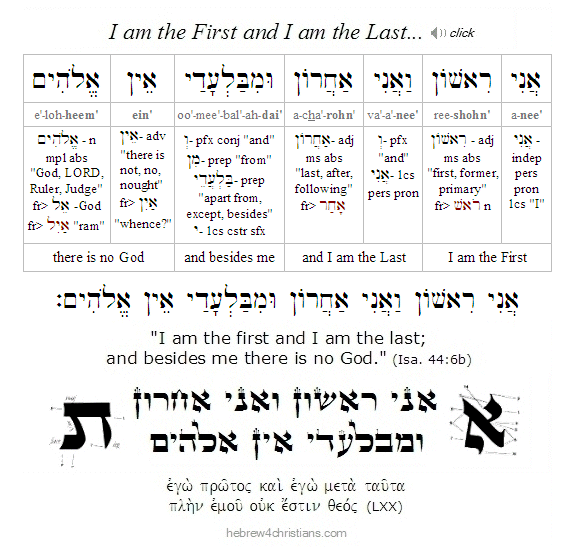 |
The Great Commandment...
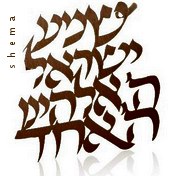
08.14.24 (Av 10, 5784) Our Torah reading for this week (i.e., Vaetchanan) includes the first part of the Shema (שמע): "Hear, O Israel, the LORD is our God; the LORD alone, and you shall love (וְאָהַבְתָּ) the LORD your God with all your heart and with all your soul and with all your might" (Deut. 6:4-5). During its recitation we traditionally pronounce each word very carefully while covering our eyes with our right hand, focusing on the sovereignty of God and our primary need to love Him with our whole being.
Yeshua taught that the Shema was the "first" or "great" commandment of Torah (see Mark 12:28-31). Note that the opening declaration of the Shema includes three Divine Names: Lord (יהוה), God (אלהים), and Lord (יהוה) again, which suggests the multiplicity-in-oneness (unity) that the word "echad" implies (see below). The two letters Ayin (ע) and Dalet (ד) are written enlarged in the opening verse of the Shema. Together, these letters form the word 'ed (עֵד), which means "witness," suggesting that we recite the Shema to testify of the greatness of God and our duty to love Him bekhol levavkha, (בּכָל־לְבָבְךָ) with all our being.
שְׁמַע יִשְׂרָאֵל יְהוָה אֱלהֵינוּ יְהוָה אֶחָד
she·ma · Yis·ra·el · Adonai · e·loh·hey'·noo · Adonai · e·chad

"Hear, O Israel, the LORD is our God, the LORD alone."
(Deut. 6:4)

Hebrew Study Card / Shema Reader Page
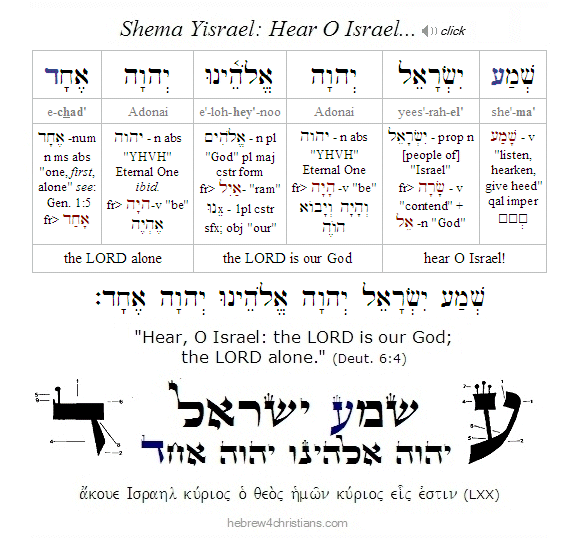
The Shema is commonly translated as: "The LORD our God, the LORD is one" (יְהוָה אֱלהֵינוּ יְהוָה אֶחָד), though the word "one" here (i.e., echad: אֶחָד) should not be thought to imply "pantheistic monism," that is, the idea that everything ultimately is God or that everything is a mystical "oneness." In Hebrew, the word echad (אֶחָד) implies unity in diversity, not absolute numerical identity (the word for one and only one, i.e., "unique," is yachid (יָחִיד)). For example, in Exodus 26:6 the parts of the Tabernacle (Mishkan) are to be constructed so that "it shall be one (echad) tabernacle," and the prophet Ezekiel spoke of two "sticks" (representing fragmented Israel) as being reunited into one: "and they shall be one (echad) stick in My hand" (Ezek. 37:19).
Echad can also mean "first" or "preeminent," as describing "the first day" of the creation as "yom echad (יוֹם אֶחָד) in Geneis 1:5, and this, I believe, is the sense of "echad" used in the Shema, since it affirms that that the LORD alone is God and there is no other god beside Him.
Moses further used the word echad in Genesis 2:24 to describe the depths of love: "And they (husband and wife) will become one flesh (basar echad)." God's attributes as Compassionate Source of life, Eternal Judge, and Savior, are unified and affirmed in this verse. Ultimate Reality is multidimensional, personal and loving, and that is part of the very essence of God.
The kabbalistic (i.e., neoplatonic) view that the "LORD is one" suggests that good and evil are "coequal" aspects of oneness, and that "God" is more like Hinduism's univeral soul than the transcendent personal Creator who made everything and who reigns over all possible worlds as Master and King. "Woe to those who call evil good, and good evil; Who put darkness for light, and light for darkness; Who put bitter for sweet, and sweet for bitter! Woe to those who are wise in their own eyes, and shrewd in their own sight!" (Isa. 5:20-21). Good and evil are not "emanations" or "sefirot" that are resolved into cosmic oneness. Philosophically considered, there is no such thing as a "person" - either human or Divine - that exists in an absolute vacuum, outside of relationship. The doctrine of oneness as "absolute monism" is inconsistent with the idea of Divine Personhood, just as Aristotle's "Unmoved Mover" is a logical absurdity.
There is a "three-in-one" (שְׁלוֹשָׁה בְּאֶחָד) sacred place of the heart (represented by the inmost chamber of the Mishkan called the Holy of Holies) which contains the "three-in-one" sacred Throne of the Divine Presence (represented by the Ark of the Covenant covered by sacrificial blood that signifies the cross of Messiah), before which the "three-in-one" blessing of God is heard (represented by the the priestly benediction when the Sacred Name YHVH was uttered), as we affirm the great "three-in-one" affirmation of faith known as the Shema: "Hear, O Israel, the LORD our God is One LORD," which declares our duty to love God with the "three-in-one existence" he has given us: with all our heart (be'khol levavkha), with all our soul (be'khol nafshekha), and with all our strength (be'khol me'odekha).
At the revelation at Sinai, "the mountain burned with fire to the heart of heaven" (בָּאֵשׁ עַד־לֵב הַשָּׁמַיִם), wrapped in darkness, cloud, and heavy mist" (Deut. 4:11). Yet what is this divine Fire if it is not the very passion of God - a passion that descends from the "heart of heaven" to the place of revelation within the human heart? Indeed the fire is none other than the Word of God, "the Voice that speaks from the midst of the fire" (קוֹל אֱלהִים מְדַבֵּר מִתּוֹךְ־הָאֵשׁ) the truth revelation (see Exod. 3:2, Deut. 4:33). As the Spirit asks: "Who has ascended to heaven and come down? Who has gathered the wind in his fists? Who has wrapped up the waters in a garment? Who has established all the ends of the earth? What is his name, and what is his Son's name? Surely you know" (Prov. 30:4).
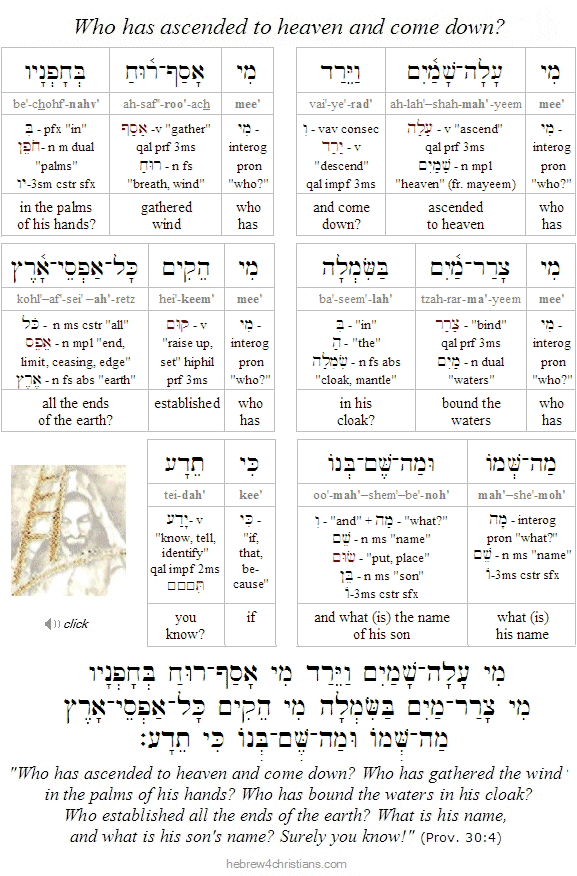 |
Yeshua is the Center of Creation - its beginning and end. As it is written: אָנכִי אָלֶף וְתָו רִאשׁוֹן וְאַחֲרוֹן ראשׁ וָסוֹף / "I am the 'Aleph' and the 'Tav,' the First and the Last, the Beginning and the End" (Rev. 22:13). "For from him and through him and to him are all things. To him be glory forever. Amen" (Rom. 11:36). Indeed he is called מֶלֶךְ מַלְכֵי הַמְּלָכִים / Melech Malchei Hamelachim: The "King of kings of kings" and the LORD of all possible worlds -- from the highest celestial glory to the dust of death upon a cross. Yehi shem Adonai mevorakh (יְהִי שֵׁם יהוה מְברָךְ): "Let the Name of the LORD be blessed" forever and ever (Psalm 113:2).
Note: In Hebrew, the "heart" of something represents its core. center, and essence. Revelation is a matter of the heart, written by the God's Spirit, yielding a life of praise and thanks to the Lord. For more information about the Shema and its blessings, or to download Shema study pages, please see the Shema section of the site. Shalom.
The Long Road Home...

08.14.24 (Av 10, 5784) The mournful holiday of Tishah B'Av is now over, but teshuvah ("repentance") is an ongoing turning to God both in moments of ambiguity, pain, and distress, as well as in moments of respite and relative happiness... It is in the midst of the ego's clamor, before the parade of worldly fears or pressures, in the crucible of "everydayness" that we must "come to ourselves" and (re)find God. In that sense, teshuvah is a sort of focus, a direction, and seeking the center of life, the place of constant repair for the inner breach we constantly feel. It's a long road home to finally understand you belong at your Father's table... That is the message of the parable of the prodigal's return (see Luke 15:11-32).
It is written in the Mishnah (Avot:15b), "repent one day before you die," but who knows the day of one's death in advance? Therefore "seek the LORD while he may be found; call upon him when he is near" (Isa. 55:6). "In eternity you will not be asked how large a fortune you are leaving behind - the survivors ask about that. Nor will you be asked about how many battles you won, about how sagacious you were, how powerful your influence - that, after all, becomes your reputation for posterity. No, eternity will not ask about what worldly goods remain behind you, but about what riches you have gathered in heaven. It will ask you about how often you have conquered your own thought, about what control you have exercised over yourself or whether you have been a slave, about how often you have mastered yourself in self-denial or whether you have never done so" (Kierkegaard).
Just as God humbled Israel with manna in the desert, so He humbles us. "Give us this day our daily bread, forgive us, deliver us..." (Matt. 6:11-13,). The purpose of affliction is ultimately good and healing: God humbles us with manna, the "bread of affliction, so "that he might make you know that man does not live by bread alone, but man lives by every word that comes from the mouth of the LORD" (Deut. 8:3). In other words, God uses tzuris to lead us to do teshuvah and accept the truth. We often pray that our problems be taken away, but God sometimes ordains these very problems so that we will turn and draw near to Him... We are being weaned from this present age to be made ready for heavenly glory, for things unimaginably wonderful, soon to be revealed to you. Chazak – stay the course, friends; the hour is near.
Hebrew Lesson
Psalm 94:12 Hebrew reading (click):
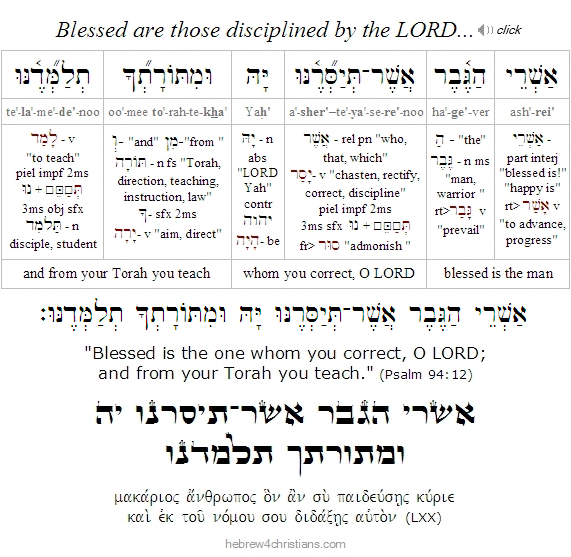 |
Three-in-One Aleph...
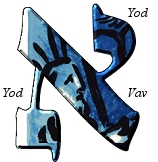
08.14.24 (Av 10, 5784) According to the mystics of Jewish tradition, the entire cosmos is said to be created from the 22 consonants of the Hebrew Alphabet, called otiyot yesod (אוֹתְיּוֹת יְסוֹד), or "foundational letters." Through the otiyot yesod God formed substance out of chaos and brought forth existence from nonexistence. In other words, the entire universe is created and sustained by the breathing out of divine language (i.e., the Word of God).
The Talmud says "All the world was created for the Messiah" (Sanhedrin 98b). The New Testament had earlier said the same thing: "All things were created by Him (i.e., Yeshua), and for Him" and in Him all things consist (συνεστηκεν, lit. "stick together") (Col. 1:16-17). Yeshua our Messiah is called devar Elohim (דְּבַר אֱלהִים), the Word of God, who upholds the created order by the Word of His power. It is the Messiah Yeshua alone Who is the true yesod (foundation) of life itself. Every holy utterance can be traced back to Him, and He is the Source (הַמָּקוֹר) of all that is good, lasting, and righteous. "For from him and through him and to him are all things" (Rom. 11:36). Indeed, "He is the zohar of His glory," that is, the radiance of the glory of God Himself, who "upholds all things by the word of His power" (Heb. 1:3).
Since Yeshua is the Aleph and the Tav (אָלֶף וְתָו), the First and the Last (הַרִאשׁוֹן וְאַחֲרוֹן), we can see that the otiyot will all reveal something about Him (Rev. 22:13). Indeed, the Hebrew word for "letter" (אוֹת) also means "sign" or "wonder." Yeshua affimed that each letter of the Hebrew alphabet -- every "jot and tittle" (i.e., kotzo shel yod: קוֹצוֹ שֶׁל יוֹד) -- contains signs that point to truths about our LORD (Matt. 5:17; Luke 16:17; Isa. 40:8).
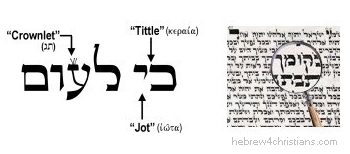 |
The structure and sequence of the Hebrew alphabet (האלפבית העברי) itself is clearly part of God's revelation to us. As demonstrated by the various acrostic sections of Scripture (e.g., Lamentations, Psalm 25, Psalm 119, Proverbs 31, etc.), God "breathed out" the Hebrew alphabet in a particular order. Indeed, the first letter of the alphabet is the letter Aleph (א), which represents the number one (מספר אחת). As a silent letter, Aleph is preeminent in its order and alludes to ineffable mysteries of the "achdut" (אַחְדוּת) oneness of God (Col. 1:18). Indeed, the word aluph (derived from the very name of this letter) means "Master" or "Lord."
In the "classical" Hebrew script (כתב אשורי) the letter Aleph (א) is constructed as a "three-in-one" (שְׁלוֹשָׁה בְּאֶחָד) letter formed by two Yods (י), one to the upper right and the other to the lower left, that are joined by a diagonal or slanted letter Vav (ו). The two Yods represent two hands (the Hebrew word "yod" means hand), and the slanted Vav pictures a wounded Man: one hand rises toward heaven while the other reaches down to earth. The total of the three letters hidden within the Aleph is 26 (i.e., Yod+Yod+ Vav), which is the same value as the Name YHVH (יהוה). The first letter, then, of the Name Elohim (אלהים), "God," represents Yeshua, the LORD of Compassion who breaths upon us the breath of life (Gen. 2:7; John 20:22).
Hebrew Lesson
Proverbs 30:5 reading (click for audio):
Note: The two letters in the graphic I made - Aleph (א) and Shin (שׁ) - spell the word esh (אֵשׁ) meaning "fire" in Hebrew... For more information, see the letter Aleph pages.
Shavuah Tov Podcast:
Parashat Vaetchanan...

08.14.24 (Av 10, 5784) Our Torah reading for this week (i.e., Vaetchanan) is always read on the Sabbath that immediately follows the somber holiday of Tishah B'Av (תשעה באב). In Jewish tradition, this special Sabbath is called "Shabbat Nachamu" (שַׁבַּת נַחֲמו), "the Sabbath of Comfort" and assigned the prophetic portion from the Book of Isaiah that begins with the famous phrase: נַחֲמוּ נַחֲמוּ עַמִּי - Nachamu, Nachamu ami - "Comfort, O comfort ye, my people..." (Isa. 40:1). With the advent of this special Sabbath, we have just seven weeks to prepare for the new year (i.e, Yom Teruah or "Rosh Hashanah") and the High Holidays - a "jubilee" season that heralds the return of Yeshua.
Hebrew Lesson
Isaiah 40:1 reading (click for audio):
Sinat Chinam and Tishah B'Av:
Why was the Temple Destroyed?
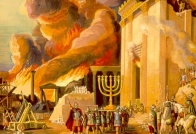
08.13.24 (Av 9, 5784) Tishah B'Av remembers the destruction of the two Holy Temples of Judaism. According to the Talmud (Yoma 9b), the first Temple was destroyed (586 BC) because of the sins of idolatry, immorality, and bloodshed, but the Second Temple was destroyed (70 AD) because of what the sages call "baseless hatred." This baseless hatred, or sinat chinam in Hebrew, is considered a more serious offence than the earlier sins that led to the destruction of the First Temple: It took 70 years to rebuild the First Temple, but Jews are still waiting to rebuild the Second Temple, even after more than 1,900 years....
Why was the first Sanctuary destroyed? Because of three [evil] things which prevailed there: idolatry, immorality, bloodshed. But why was the second Sanctuary destroyed, seeing that in its time they were occupying themselves with Torah, [observance of] precepts, and the practice of charity? Because therein prevailed hatred without cause. That teaches you that groundless hatred is considered as of even gravity with the three sins of idolatry, immorality, and bloodshed together. (Talmud: Yoma 9b)
Though sinat chinam (שִׂנְאַת חִנָּם) is often translated as "baseless hatred," it literally means "hatred of grace (חֵן, chen)," that is, an aversion to using ayin tovah (a good eye) to see good in others. Just as God freely loves, so the devil freely hates... In essence, then, sinat chinam is the rejection of God's grace. But since Yeshua is the embodiment of God's grace (John 1:17, etc.), sinat chinam is ultimately a rejection of His ministry. Is it any wonder, then, that he foretold the destruction of the Second Temple based on Israel's hatred and rejection of Him (Matt. 24:2)?
Recall the context. During His "triumphal entry" into Jerusalem (Matt. 21:1-11), Yeshua was greeted by the cries of Jewish Passover pilgrims: "Hosanna!" This word is actually the phrase "hoshiah na" (הוֹשִׁיעָה נָּא), meaning "please save" or "save now." The Jewish pilgrims were singing Psalm 118:25-26 and applying it to the greater Son of David, Yeshua, who had come:
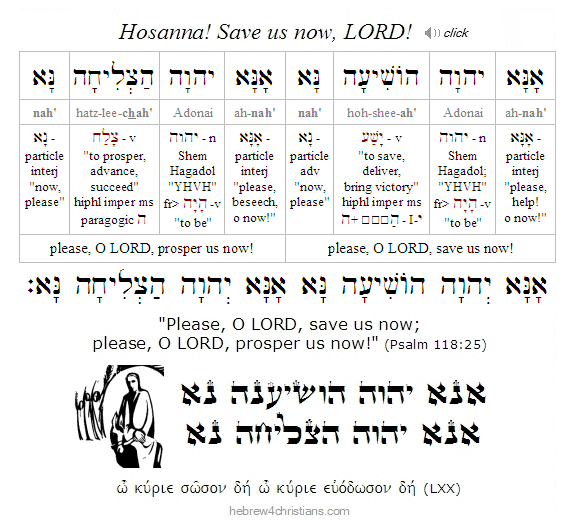 |
Matthew notes that hoshiah na was addressed to Yeshua Himself, "to the [greater] son of David" (לְבֶן־דָּוִד), thereby indicating that the Messianic Hope was presented to Israel (Matt. 21:9). For a flickering moment the proper praise was given to Yeshua as Mashiach ben David, though of course He had come to them as Mashiach ben Yosef, their Suffering Servant, the One of whom the prophet Isaiah clearly foretold.
Immediately after his "triumphal entry," Yeshua went directly to the Temple and drove out all who sold there, overturning the tables of the "money changers" and the seats of those who sold pigeons (Matt. 21:12). After this the blind and the lame were able to enter the Temple -- and Yeshua healed them.
Despite performing miraculous works of healing in the Temple that day -- including opening the eyes of the blind and causing the disabled to walk -- the kohanim (chief priests) and soferim (scribes) were "indignant" at His actions and therefore sought to put Him to death (Mark 11:18).
In the evening Yeshua left the Temple for Bethany, the home town of Mary, Martha and Lazarus, where He stayed the night. The following morning He walked back to Jerusalem, and being hungry, saw a fig tree along the way. When He saw that the fig tree was without any fruit, Yeshua pronounced these words: "May no fruit ever come from you again!" And the fig tree withered at once (Matt. 21:18-19).
He then returned to the Temple where he was once again accosted by the religious establishment who questioned his authority. Yeshua turned the tables on his accusers by giving them a dilemma to solve: the baptism of John: was it from God or from man? Unwilling to answer him, Yeshua then prophesied the parable of the two sons (Matt. 21:28-32), indicating that despite their supposed status as the "good sons" of Israel, even tax collectors and prostitutes would enter the Kingdom of God before them. He went on to say that "the kingdom of God will be taken away from them and given to a people producing its fruits" (Matt. 21:43).
The Pharisees and the Sadducees then attempted to "entangle him in his talk" and sent their disciples to ask him tricky questions. Yeshua, however, exposed their "baseless hatred" -- their sinat chinam - and confounded them (see Matt. 22). Beginning in Matthew 23, Yeshua then began his denuciation of the "scribes and the Pharisees," pointing out their hypocrisy and their unclean motives. חֲנֵפִים אַךְ־אוֹי לָכֶם סוֹפְרִים וּפְרוּשִׁים (akh-oy lachem soferim u'perushim, chanafim): "Woe to you scribes and Pharisees, hypocrites! (Matt. 23:13-ff).
After Yeshua ended his denunciation, he lamented for Jerusalem saying, "O Jerusalem, Jerusalem, the city that kills the prophets and stones those who are sent to it! How often would I have gathered your children together as a hen gathers her brood under her wings, and you would not! See, your house is left to you desolate. For I tell you, you will not see me again, until you say, 'Blessed is he who comes in the name of the Lord'" ( Matt. 23:37-39).
After this, Yeshua left the Temple for good and never looked back. In Matthew 24 Yeshua's disciples made a last-ditch appeal for Jewish tradition and ceremony by pointing out the glory of the Second Temple. "Look at these beautiful buildings of the Temple, Lord..." It was then that Yeshua pronounced judgment on the Temple and the Levitical system, predicted the Roman destruction of the Temple, and so on (Matt. 24:1-2). This was apparently unfathomable to the disciples, who apparently still considered Yeshua to be a "reformer" of Temple Judaism, perhaps the one who would restore it so that the Kingdom of God would be finally manifest upon the earth. Yeshua went on to explain the signs of the End of the Age (אַחֲרִית הַיָּמִים) that would precede the promised Days of Messiah (יְמֵי הַמָּשִׁיחַ), otherwise known as the Messianic Kingdom. He foretold that one day praise would rightly be given to Him as Israel's True King, but only after the travail of the coming Great Tribulation upon the earth. Only after the Jewish people cry out to Him as their LORD (Matt. 23:39) would the Kingdom of God be established in Zion.
Please note that there were at least two separate cleansings of the Temple recorded in the New Testament. The earlier cleansing is described in John 2:13-22 and the later one is described in (both) Mark 11:15-19 and Matthew 21:1-16. In Mark's account of the second cleansing, Yeshua actually stopped the "carrying of the ritual vessels" -- meaning He literally stopped the Temple sacrifices of Israel (עבודה של הלויים). Mark 11:16 shockingly states: "And he would not allow anyone to carry anything through the Temple." Here is the passage:
So they came to Jerusalem, and he entered the Temple and began to drive out those who sold and those who bought in the temple, and he overturned the tables of the money-changers and the seats of those who sold pigeons. And he would not allow anyone to carry anything through the Temple. And he was teaching them and saying to them, "Is it not written, 'My house shall be called a house of prayer for all the nations'? But you have made it a den of robbers." And the chief priests and the scribes heard it and were seeking a way to destroy him, for they feared him, because all the crowd was astonished at his teaching. And when evening came they went out of the city (Mark 11:15-19).
Yeshua certainly knew the Temple and its supposed beauty. He razed it because Israel forsook His greater sacrifice. The Jewish sages had it half right. It was indeed because of sinat chinam that the Second Temple was destroyed, but this was most clearly revealed in the rejection of Yeshua as Israel's King and Savior....
Exile and Carelessness...
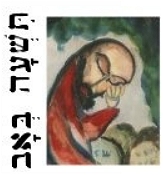
[ Today is Tishah B'Av, the Ninth day of the month of Av, an annual fast day of mourning that recalls the many tragedies that have befallen the Jewish people over the centuries.... ]
08.13.24 (Av 9, 5784) The theme of the fragility of life is part of the sober message of Tishah B'Av. After all, the great symbol of God's manifest presence on the earth, the Holy Temple, went up in smoke, and the very place (i.e., ha-makom: הַמָּקוֹם) where the LORD chose to "put His Name" was utterly destroyed. As the people were taken captive and led into exile, the great vision of Zion appeared to be forever lost (Psalm 137:1-4).
The LORD had forewarned that exile, persecution and progressively worse punishments would befall the people if they would break faith with Him (see Lev. 26:14-46). But how could all this have happened? Notice that the "rebuke" portion of the tochachah begins with ve'im loh tishme'u li (וְאִם־לא תִשְׁמְעוּ לִי), "if you do not listen to me" (Lev. 26:14), which recalls the Shema and the duty to love the Lord bekhol levavkha, "with all your heart." The sages point out that the refrain "if you walk contrary to me" (וַהֲלַכְתֶּם עִמִּי בְּקֶרִי) - which occurs several times during the rebuke - really means "if you walk carelessly (i.e., keri: קְרִי) with me." The commentator Rashi notes that the verb karah (קָרָה) means "to befall" or "to happen" and therefore suggests a sense of randomness (the related word mikreh [מִקְרֶה] means "coincidence"). If the people regarded the events of life as "random," then God would reciprocate by bringing senseless trouble into their lives. For this reason a careless attitude about the things of God is the first step toward apostasy...
It's been said that the opposite of love isn't hate, but rather indifference, and that explains why punishments came when the people "left their first love." If you walk carelessly with God, then you may be afflicted with "troubles of love" (i.e., yissurei ahavah: יִסּוּרֵי אַהֲבָה), that is, with various difficulties, intended to help you "come to your senses," to help you wake up, and to cause you return to the LORD for healing... This is a severe mercy of God.
The idea of tochachah is not simply something for ethnic Israel, of course, since the New Testament likewise warns us that God will punish those who likewise walk carelessly (i.e., keri: קְרִי) with Him. Have you forgotten the exhortation that addresses you as God's children? "My son, do not regard lightly (ὀλιγώρει) the discipline of the Lord, nor be weary by his reproof (תּוֹכֵחָה). For the Lord disciplines the one he loves, and reproves (יוֹכִיחַ) every child whom he receives" (Heb. 12:5-6; Prov. 3:11-12). The Lord charged the assembly at Ephesus that they had let go of their first love. Yeshua therefore urged them: "Remember from what high state you have fallen and repent! Do the deeds (ἔργα) you did at the first; if not, I will come to you and remove your menorah from its place – unless you repent" (Rev. 2:4-5). "God is not mocked (μυκτηρίζω - lit., "to turn up the nose at"), and what a man sows, he also reaps" (Gal. 6:7; Psalm 39:11). There are abiding consequences for the choices we make in our lives. "For you may be sure of this, that everyone who is sexually immoral or impure, or who is covetous (that is, an idolater), has no inheritance in the kingdom of Messiah and God. Let no one deceive you with empty words, for because of these things the wrath of God comes upon the sons of disobedience" (Eph. 5:6-7).
It is written, "Pain (or grief) handled in God's way produces a turning from sin to God (תְּשׁוּבָה) which leads to salvation (יְשׁוּעָה), and there is nothing to regret in that! But pain handled in the world's way produces only death" (2 Cor. 7:10). A common definition of insanity is doing the same thing over and over again and expecting different results. The world's "logic" for dealing with inner pain is to do things that will suppress it, thereby guaranteeing more pain. The only way out is through... During Tishah B'Av we weep over our sins that have brought us exile. The sages note that the word "weeping," i.e., בְּכִי, has the same numeric value as the word for "heart," i.e., לב. We weep from the heart, then, because the heart itself is what needs to be healed... Shalom and love to you.
Hebrew Lesson
Psalm 119:31 Hebrew reading (click for audio):
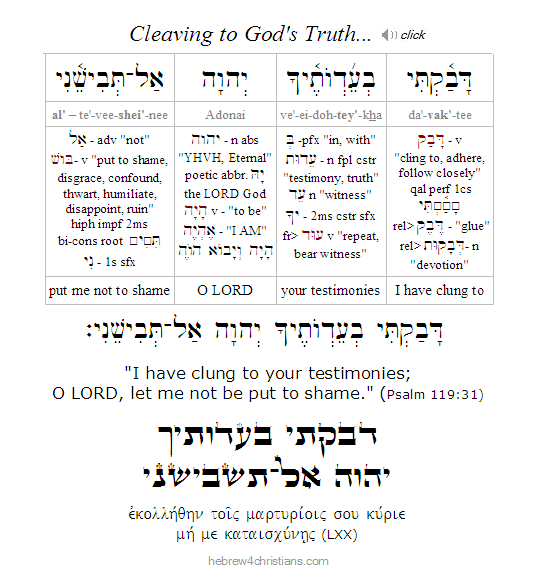 |
Seeking things Above...
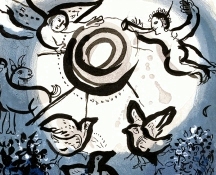
08.12.24 (Av 8, 5784) Then he said to them all, "If anyone wants to become my follower, he must deny himself, take up his cross daily, and follow me. For whoever wants to save his life will lose it, but whoever loses his life for my sake will save it" (Luke 9:23-24). Paradoxically only those willing to give up their lives will take up their cross, but the prospect remains an offense to those who seek to protect themselves. We must let go, say goodbye, and turn away from the allure of this world. The cross of Messiah crucifies your relationship to this world with its ignorance and vanities (Gal. 6:14). Through the cross you die to this world and its idolatry and cross over to a new realm of existence altogether (Gal. 2:20; Col. 3:1-4). The cross marks the beginning of life in the spirit...
"If then you have been raised with Messiah, seek the things that are above (τὰ ἄνω ζητεῖτε), where the Messiah is seated at the right hand of God (לִימִין אֱלהִים). Focus your thoughts on the things above, not on things here on earth. For you have died, and your life has been hidden with Messiah in God. Then when the Messiah, who is your life, appears, you too will appear with him in glory" (Col. 3:1-4).
All of this turns on our faith... If we are spiritually identified with Yeshua, we are "dead" to this age (olam hazeh), and therefore we are awakened to a realm that transcends the appeals of carnal flesh (olam habah). We no longer live chayei sha'ah (חַיֵּי שָׁעָה, "fleeting life") but chayei olam (חַיֵּי עוֹלָם, "eternal life"). The arorist verb "you have died" indicates "you have died once for all," that is, this is a condition granted by the power and agency of God on your behalf. You don't "try to die" to the flesh; you accept what God has done by killing its power over you through Yeshua... You are dead to this world; you are dead to sin's power; you are no longer enslaved to the deception of the worldly matrix, etc. Now you are made alive to an entirely greater and more powerful order and dimension of reality, namely, the spiritual reality that is not disclosed to the vanity of this age. Therefore we are to consciously focus our thoughts (φρονέω) on the hidden reality of God rather than on the temporal world that is passing away: "For we are looking not to the things that are seen but to the things that are unseen. For the things that are seen are transient (i.e., "just for a season," καιρός), but the things that are unseen are eternal" (2 Cor. 4:18).
"When faith in God begins to affect an individual, his entire existence is transformed. His obsession with immediate pleasures and pains dies away. Instead his attention is increasingly focused on God. He comes to conceive God in his heart not just at a particular moment, but at every moment. He desires to share the infinity of God, and so feels himself confined within his present existence. He is like a bird in a cage, dreaming of flying free; he is like a fish on dry land, dreaming of swimming in a pool. He is acutely aware of the contrast between God's power and his own frailty. Yet even in his confinement, he feels joy in the knowledge that soon he will be free" (Kierkegaard)
We share the (in)visibility of the Messiah in this age... Since He is presently hidden from view, "the world knows us not, because it knew him not" (1 John 3:1); on the other hand, when He is revealed from heaven, so we will appear with him in glory... Therefore "being dead" is an inversely reciprocal relationship: being dead to this world is to be alive in the other world, and vice-versa.... We have "hidden life" in the Messiah, as it is written: "your life has been hidden (i.e., κρύπτω, "concealed," "disguised") with the Messiah in God." By faith you are made dead to one order of reality so that you would be made alive to another order of reality, to the reality of God that transcends the shadows and decay of this world. Your life has been hidden - like a "hidden treasure" - with the Messiah, who holds its store for you and will reveal its glory in the coming age. Because Yeshua knows you by name, calls you to follow Him, and is your Sin-Bearer, Priest, Advocate, and Savior before the throne of God, your life is indeed "hidden with Him," and you are made secure through His all-powerful providential care... Praise His Name forever.
Salvation is forever a matter of life and death. We esteem earthly doctors because they are healers of the body, but how much more do people need true healers of the soul? "Be not deceived" about your own hope for eternity; "God is not mocked" (μυκτηρίζω). He knows your inner motivations with perfect clarity (Gal. 6:7; Heb. 4:12). To "serve" God in the truth means being willing to face ongoing self-examination, to own up to the truth about yourself, to be real, to be honest. We are here to share the message of God's love and to help bring others to eternal life. Yeshua's fiercest words of condemnation were reserved for those who played games with "religion" - for those who forgot that people were literally dying without God's love... May God help us remember what is closest to His heart, friends...
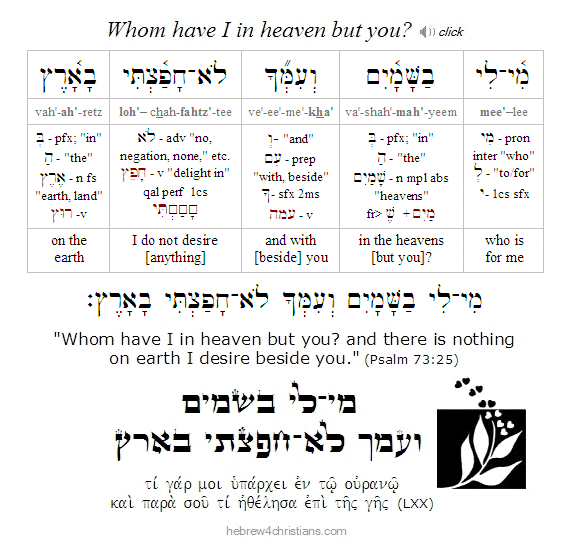 |
Return to your heart...
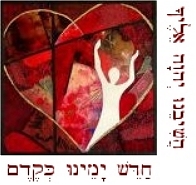
[ The following is related to our Torah reading for this week, parashat Vaetchanan... ]
08.12.24 (Av 8, 5784) Although we keep watch over Israel and the signs for the coming of the Lord for us, the present state of this evil world has absolutely nothing to say regarding the life of faith in the LORD (יהוה)... Our duty is to live before the Divine Presence at all times -- regardless of whatever our circumstances. "In relationship to God one can not involve himself 'to a certain degree.' God is precisely the contradiction to all that is 'to a certain degree'" (Kierkegaard). A believer must be contemporary with Christ's presence on earth, since the Eternal entered historical time to offer a timeless relationship with all who would believe. Our Lord touches us because He connects with our hearts in the present hour...
So what do you truly believe? What do you love? How do you "relate" to life? For those who trust in the Presence of God in Yeshua, nothing "happens" randomly or at a distance from our Heavenly Father's care... We do not know Yeshua as some hoary figure of the past, nor as a remote hope of the heart, but in the "blood and guts" of our daily struggle -- in the midst of our connection with him as we journey in faith. God's love is not a secondhand gift... Yeshua asks each of us: 'Who do you say that I am?' (Mark 8:29) and awaits for us to "show up" in our faith to reach out to Him.
From our Torah portion this week (i.e., Vaetchanan) we read, "Know therefore today and return to your heart (והשׁבת אל־לבבך), for the LORD is God in heaven above and on the earth beneath; there is no other" (Deut. 4:39). Here again we see the centrality of the heart as the mode to encounter God (Luke 17:21). Savor the phrase, "Know therefore today and return to your heart..." It the heart that is the place of connection with God... As Yeshua said, "Behold, I stand at the door and knock. If anyone hears my voice and opens the door, I will come in to him and eat with him, and he with me" (Rev. 3:20). Today is the day to "return to your heart" and receive again God's love for your soul...
Hebrew Lesson
Deut 4:39 Hebrew reading (click):
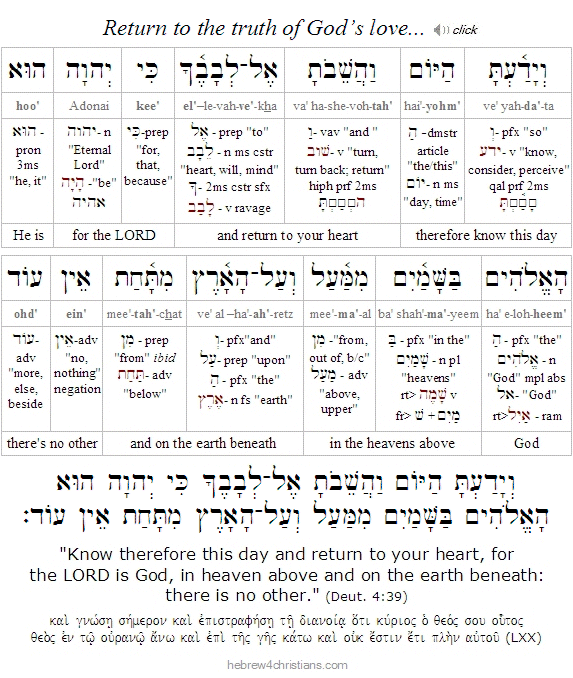 |
Mitzvah of Connection...
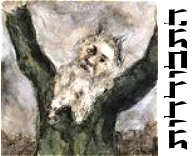
08.12.24 (Av 8, 5784) Our Torah reading for this week begins, "I pleaded with the LORD" (Deut. 3:32). Prayer is our lifeline to God; it is the essential work of faith... In this connection we note that that the Hebrew word "mitzvah" (מִצְוָה) is often translated as "commandment," though its basic idea is about making connection with God (i.e., the root צוה means to bind or unite). Being connected with the Almighty means talking with him, relating to him as your heavenly Father, and trusting that he esteems you as his beloved child. Whatever else you may think about the commandments of God, this idea of a love connection is foundational and essential. The very first of the Ten Commandments is anochi Adonai Elohekha, "I am the Lord your God" (אנכי יהוה אלהיך) which summons your heart to receive the touch of the Spirit of God. There is no love like that of the Lord, but you can't feel that love if you don't speak to Him, pouring out your heart and clinging to the truth of his love for you....
Hebrew Lesson
Psalm 62:8 Hebrew reading:
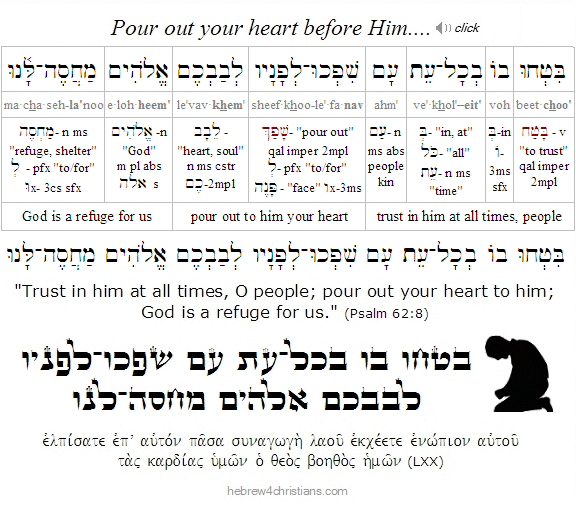 |
Privately pouring out your heart to God in an honest, transparent, and earnest way is sometimes called hitbodedut (הִתְבּוֹדְדוּת), a word that means "solitude." As we unburden our souls before the Lord, made empty so that can begin to truly listen, as it says, "In returning and rest you shall be saved; in quietness and in trust shall be your strength" (Isa. 30:15). Only after we sigh deeply and surrender are we receptive to the voice of the Spirit's whisper. "Blessed are all those who wait for Him" - אַשְׁרֵי כָּל־חוֹכֵי לוֹ (Isa. 30:18). We wait, we abide, even when God takes his time or does not immediately intervene. We do not lose heart, for we find strength when we trust in God's love... No prayer uttered to the one true God in the passion of truth will ever go unanswered. The Light of the world still shines: Yeshua, be my inner word, my heart, and my groaning for life today, and forevermore, amen.
Since the essence of Torah is connection to God, the greatest blessing is to be filled with a steadfast desire to draw close to him, to experience hunger and thirst (visceral yearning) for God's presence and touch. Holy desire – expressed in the yearning of heartfelt prayer – is therefore a state of true blessedness, and the more desperate our need for God the more blessed we are. It is our desire, our holy need, that creates a bond between our soul and its Creator, and that is the deeper meaning of mitzvah... "Blessed are those who hunger and thirst for righteousness, for they shall be satisfied" (Matt. 5:6).
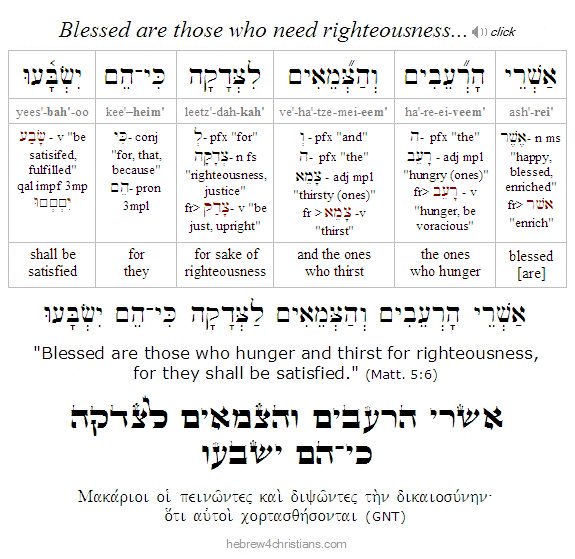 |
Tishah b'Av and God's Kingdom...
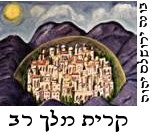
[ Shalom chaverim. The following is related to the fast of Tishah B'Av, which begins this evening at sunset... During this time let us remember Israel in our prayers, praying for the peace of Jerusalem and the coming of God's kingdom! ]
08.12.24 (Av 8, 5784) The somber holiday of Tishah B'Av recalls the tragic anniversary of the "sin of the spies" and God's subsequent decree that the generation redeemed from Egypt would die in exile from the promised land (Num. 14:26-37), though providentially it also marks the date of the destruction Temple in Jerusalem (both the first and second Temple) and the subsequent exile of the Jewish people. Because it remembers the loss of the vision of Zion, this date is observed with fasting, heartfelt lamentation and fervent calls for teshuvah (repentance).
Jerusalem (or Zion) is central to the Jewish heart since it represents all the promises of the Lord spoken by the Hebrew prophets to Israel... When religious Jews pray three times a day, they always turn toward the Holy City (i.e., mizrach: מזרח "east"). Synagogues likewise place the holy ark (the place where Torah scrolls are kept) on the wall closest to Jerusalem. Many observant Jews keep small section of an eastern wall of their house unpainted as a sign of mourning for the destruction of the Temple. Every year we close the Passover Seder with the words, La-Shanah Haba'ah Bi Yerushalayim! ("Next year in Jerusalem"). These same words are invoked to conclude the holiest day of the Jewish year, Yom Kippur. Indeed Yeshua called Jerusalem the "City of the great King" (Psalm 48:2; Matt 5:35): It is the place where He was crucified, buried, resurrected, and from where He ascended to heaven. It is also the birthplace of the true church (כלה של משיח) and the focal point of humanity's eschatological future. At the Second Coming, Yeshua will physically return to Jerusalem to restore the throne of King David. Then all the New Covenant promises given to Israel will be fulfilled as the Kingdom of God is manifest upon the earth.
God loves Zion since it symbolizes His redemptive program in human history. In a sense, Zion is the heart of the Gospel message and the focal point of God's salvation in this world. Zion represents our eschatological future -- our home in olam haba (the world to come). Even the new heavens and earth will be called Jerusalem -- "Zion in her perfection" (Rev. 21). "This is what Adonai Tzeva'ot says: I am very jealous for Jerusalem and Zion, but I am very angry with the nations that feel secure" (Zech. 1:14-15). "For Zion's sake I will not keep silent, for Jerusalem's sake I will not remain quiet, till her righteousness shines out like the dawn, her salvation like a blazing torch" (Isa 62:1). "The builder of Jerusalem is God, the outcasts of Israel he will gather in... Praise God, O Jerusalem, laud your God, O Zion" (Psalm 147:2-12).
Hebrew Lesson
Psalm 137:5 Hebrew reading (click):
For more on this, see "The Significance of Zion and the Tragedy of Tishah B'Av."
Va'etchanan: Moses' Plea...
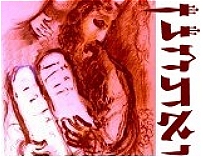
[ Our Torah reading for this week, parashat Vaetchanan, is always read on the Sabbath immediately following Tishah B'Av, called Shabbat "Nachamu", or "the Sabbath of Comfort." ]
08.11.24 (Av 7, 5784) This week we will study parashat Vaetchanan (פרשת ואתחנן), a rich Torah portion that includes some of the most foundational texts of the Jewish Scriptures, including the Ten Commandments, the Shema (the duty to love God and study His Torah), as well as the commandments of tefillin and mezuzot. In addition, in this portion Moses predicted the worldwide exile and the eventual redemption of the Jewish people in acharit hayamim (the prophesied "End of Days").
The Torah portion begins with Moses' plea to the LORD to be allowed entry into the Promised Land, despite God's earlier decree (see Num. 20:8-12; 27:12-14). The Hebrew word va'etchanan (וָאֶתְחַנַּן) comes from the verb chanan (חָנַן), which means to beseech or implore. It derives from the noun chen (חֵן), grace, implying that the supplication appeals to God's favor, not to any idea of personal merit (in Jewish tradition, tachanun (תַּחֲנוּן) are prayers recited after the Amidah begging for God's grace and mercy). Moses was asking God to show him grace by reversing the decree that forbade him to enter the Promised Land.
Hebrew Lesson
Deut:3:23 reading (click for audio):
In addition to our Torah readings, on the 15th day of the month of Av we observe chag ha-ahavah (חַג הָאַהֲבָה), or "the holiday of love." Since it marks the "last" festival of the Jewish year, prophetically the 15th of Av (called Tu B'Av) pictures our marriage to the Lamb of God (Seh Elohim), the LORD Yeshua our beloved Messiah. On a soon-coming day those who belong to the LORD and are faithful to follow His ways will be blessed with the unspeakable joy of an eternally intimate relationship with Him. This is heaven itself - to be in the Presence of the LORD and to be regarded as His beloved (Rev. 19:6-9). Maranatha.
Yeshua our Healer...
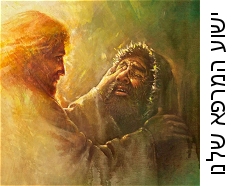
[ "You have made us for yourself, and our hearts are restless, until they can find rest in you." - Augustine of Hippo ]
08.09.24 (Av 5, 5784) "Come to me, all of you who are weary and carry heavy burdens, and I will give you rest" (Matt. 11:28). Yeshua calls out to the exhausted, the careworn, the tired of heart, the downcast, yea, to all those who often feel like they can't go on. He looks to those weighed down with troubles, sorrows, and the pains of this world. His invitation is for the "poor in spirit" - to those sick of themselves, to those unable to do anything and who are in need of everything. He seeks the impoverished, the leper, the outcast....
Yeshua turns to the paralytic, to one carried by the dust of death before God, powerless, forlorn, and broken. And this is the first movement of the Spirit, when in desperation the heart awakens from its delusions and realizes its great need (Luke 15:14). And it is there - in the midst of this brokenness, when the soul, reaching deep for its last gasp, encounters God, the one who calls us to deliverance, newness of life, and life beyond the power of death. The cross of Yeshua is the place where death and eternal life meet; it is the place of being "lifted up" (John 12:32). "If any one thirst, let then come to me, and drink" (John 7:37).
This movement of the Spirit never changes, and therefore we always find life through the consciousness and confession of our great need for God's intervention and presence in our lives, as it says: "He satisfies the longing soul, and the hungry soul he fills with goodness" (Psalm 107:9). May we draw near to Him now...
Hebrew Lesson
Psalm 107:9 reading (click for audio):
Our Yearning for Heaven...

[ "To walk out of his will is to walk into nowhere." - C.S. Lewis ]
08.09.24 (Av 5, 5784) It is an ongoing struggle to live in this world without being devoured by its fear, insanity, and violence. Yeshua prayed for his followers saying, "I am not asking you to take them from the world but to keep them from the evil one. They do not belong to the world any more than I belong to this world" (John 17:15-16).
To live in the world without belonging to the world marks the life of the tzaddikim who are seeking the house of love, the place where God abides. Even though we are given "traveling mercies" for our journey in this world, we must lift our heart toward heaven, desisting the world and its vanities, and regarding the place of God's heart to be our true home.
Abraham closed his eyes to this world and was given the inner light of truth that would reveal his way to God. "By faith Abraham obeyed when he was called to go out to a place that he was to receive as an inheritance. And he went out, not knowing where he was going. By faith he sojourned in the land of promise as in a strange land, living in tents with Isaac and Jacob, heirs with him of the same promise. For he was looking forward to the city that has foundations, whose designer and builder is God" (Heb. 11:8-10). For here we have no lasting city, but we seek the city that is to come (Heb. 13:14).
So let us lift up our souls unto the LORD and refuse to live in fear. Let us stand strong in faith, trusting God's promise even if we are sometimes in darkness. And let us take hope in God's word: "O LORD of all power, blessed is the one who trusts in you" (Psalm 84:12).
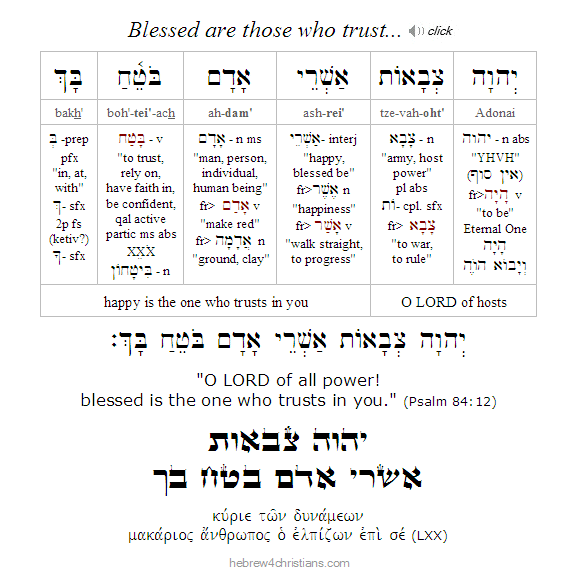 |
Daily Perush Podcast:
God's Glory and Tishah B'Av...
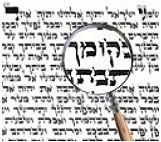
08.09.24 (Av 5, 5784) Shalom chaverim. In this "Daily perush broadcast" (see link below) I provide exegesis and reading of a significant phrase in King Solomon's prayer at the dedication of the First Temple, namely, "Behold heaven and the heaven of heavens cannot contain you" (2 Chron. 6:18b), and then I take some to discuss the meaning of these words in relation to Tishah B'Av and the subsequent destruction of the Temple in Jerusalem.
Hebrew Lesson
2 Chron. 6:18b reading (click):
Additional Comments
During his earthly ministry, our Lord Yeshua referred to himself as "the True Temple of God" (המקדש האמיתי של אלוהים) that dwelt among us. The Mishkan (Tabernacle) was a temporary dwelling place as was the physical Bet Hamikdash (Temple). As Solomon said, God never could be contained in a house made of stone, cedar and gold (2 Chron. 6:18). These were shadows of a greater Substance that entirely embodied the Temple's purpose and essential truth (Col. 2:17).
Yeshua told the Pharisees of his day that he was greater than the Temple in Jerusalem (Matt. 12:6) and challenged them: "Destroy this Temple, and in three days I will raise it up" (John 2:19-21). Yeshua is the Shekhinah - the Presence of God - manifested in the temple of human form: "For in him the whole fullness of deity dwells bodily" (Col. 2:9, John 1:1,14).
As the Lamb of God, Yeshua is not only the Kodesh Hakodoshim (Holy of Holies) -- embodied within a human heart of flesh -- but also the substance and end of all sacrifice (Heb. 10:12). When his flesh was destroyed on the Cross, the curtain of the Temple was likewise rent asunder (Matt. 27:50). Access to the inner sanctum of the LORD was thenceforth available to all who would come in faith. Yeshua alone is the Spirit, Source and the End of the true Temple of God.
For more see: The Significance of Zion and the tragedy of Tishah B'Av
 |
The Bitterness of Exile...

08.09.24 (Av 5, 5784) From our Torah portion this week (i.e., Devarim) we read: "But you were not willing to ascend (וְלא אֲבִיתֶם לַעֲלת), but became bitter (מָרָה) against the Word of the LORD your God" (Deut. 1:26). Moses' rebuke was not that the people were afraid to conquer the land as much as that they had lost heart and no longer desired to take hold of God's promise. The people gave up their dream; they forsook their hope; and they had lost the "devotion of their youth, their love as a bride, how they followed the LORD in the desert, into a land not sown" (Jer. 2:2). The people's failure was on two levels: First they lapsed in faith by abdicating trust in God's word, and second, they had lost the passion of their first love. In light of this, the sages say that the greater problem was that of losing heart, since the heart directs the will to believe in the miracle of God, or not...
Moses' rebuke of the people's heart condition recalls the sober warning Yeshua gave to the Ephesian believers: "I know your works, your toil and your patient endurance, and how you cannot bear with those who are evil, but have tested those who call themselves apostles and are not, and found them to be false. I know you are enduring patiently and bearing up for my name's sake, and you have not grown weary. But I have this against you, that you have abandoned the love you had at first. Remember therefore from where you have fallen; repent, and do the works you did at first. If not, I will come to you and remove your menorah from its place, unless you repent" (Rev. 2:2-5). Likewise the author of the Book of Hebrews commented: "And to whom did he swear that they would not enter his rest, but to those who were disobedient? And with whom was he provoked for forty years? Was it not with those who sinned, whose bodies fell in the desert? So we see that they were unable to enter because of unbelief" (Heb. 3:17-19). The question of our faith is essential: "It is a fearful thing to fall into the hands of the living God" (Heb. 10:31).
Hebrew Lesson
Deut. 4:24 Hebrew reading (click):
Turn us back to You...

[ The following is related to the somber holiday of Tishah B'Av... ]
08.08.24 (Av 4, 5784) The Book of Lamentations, which is traditionally somberly chanted during the morning service of Tishah B'Av, is an acrostic (i.e., alphabetical) poem that begins with the Hebrew letter Aleph (א) in the word "eichah" (אֵיכָה), which also marks the Hebrew name of the book itself (i.e., megillat Eichah: מגילת איכה). It begins: "How (eichah) lonely sits the city that once was full of people; she has become as a widow!" (Lam. 1:1).
אֵיכָה יָשְׁבָה בָדָד הָעִיר רַבָּתִי עָם
הָיְתָה כְּאַלְמָנָה
ei·khah ya·she·vah ha·eer ra·ba·tee ahm
ha·ye·tah ke·al·ma·nah

"How lonely sits the city that once was full of people,
she has become as a widow!"
(Lam. 1:1a)
The sages note that this word "how" (i.e., eichah) could also be read as "where are you?" (i.e., ayekah: אַיֶּכָּה), which was God's first word of intercession spoken to Adam after he broke covenant in the Garden (see Gen. 3:9). Note that God's question is often our own: "Where are you? Where are you, God? Are you here, in the midst of this tedious moment? Do you know my loneliness, my hunger and ache for love? Do you understand the troubles of my heart?" And yet how many people have faith that God's call is one of comfort and restoration? How many shrink back in shame, vainly trying to hide themselves from God?
God uses our loneliness ("how lonely...") to search our hearts, asking each of us, ayekah – "Where are you?" Why have you turned away from me and chosen a state of exile? Return to me." Our haunting sense of God's absence impels us to seek for him... God awaits our only possible response, "Hashivenu!" -- an imperative (urgent appeal) for the grace to repent: "Turn us back to you, O LORD, and we shall return; renew our days as of old" (Lam. 5:21).
Hebrew Lesson
Lamentations 5:21 Hebrew reading (click):
Our response to the questioning love of the LORD is called teshuvah ("turning [shuv] to God"). Teshuvah is an "answer" to a shelah (שְׁאֵלָה), or a question. God's love for us is the question, and our teshuvah – our turning of the heart toward Him – is the answer. As Jeremiah confessed in the hour of great trouble: "I called upon thy name, O LORD, from the depths of the pit; Thou hast heard my voice: hide not thine ear at my breathing, at my cry. Thou drewest near in the day that I called upon thee: thou saidst, Fear not" (Lam. 3:55-57).
|




















































